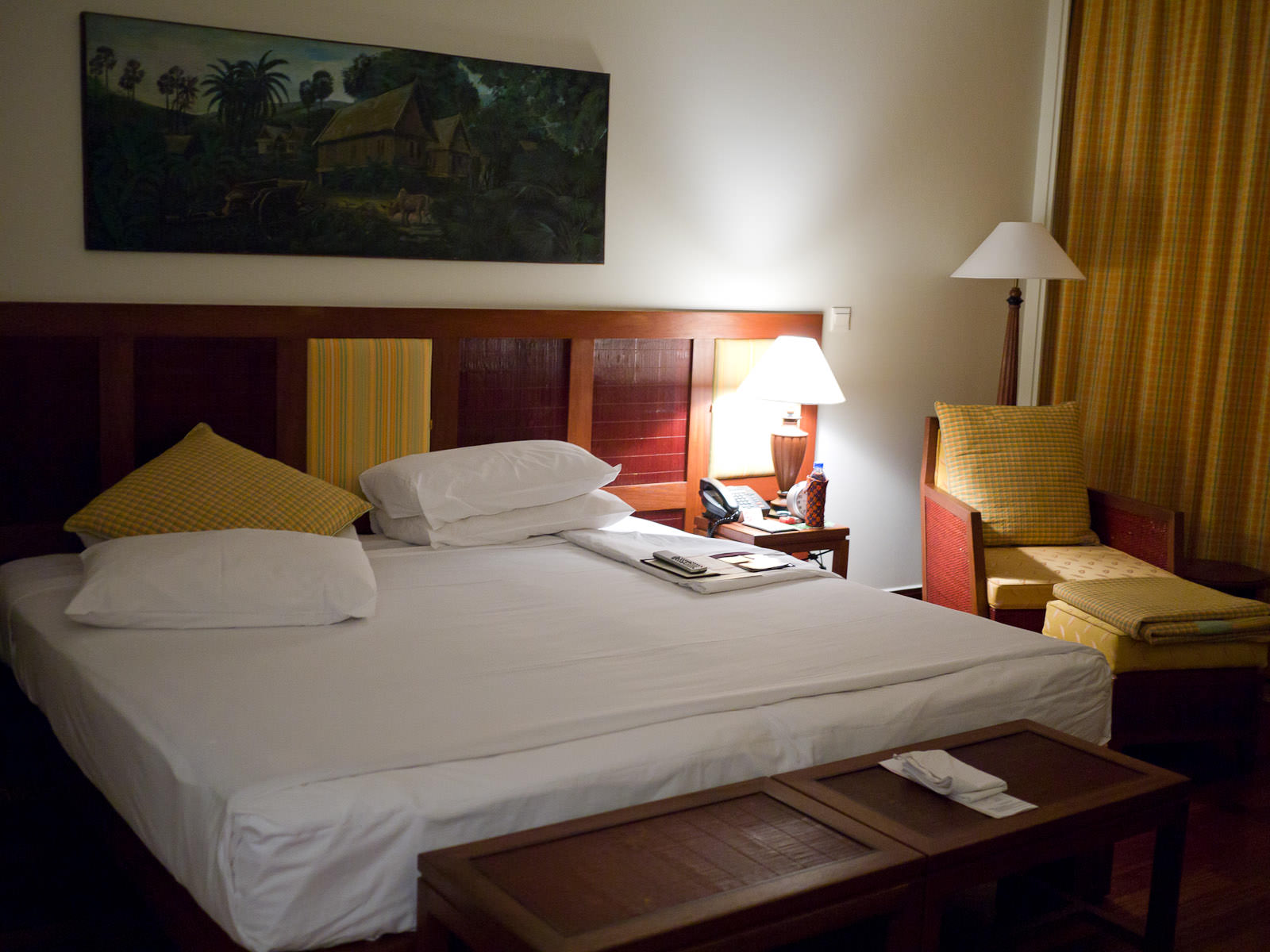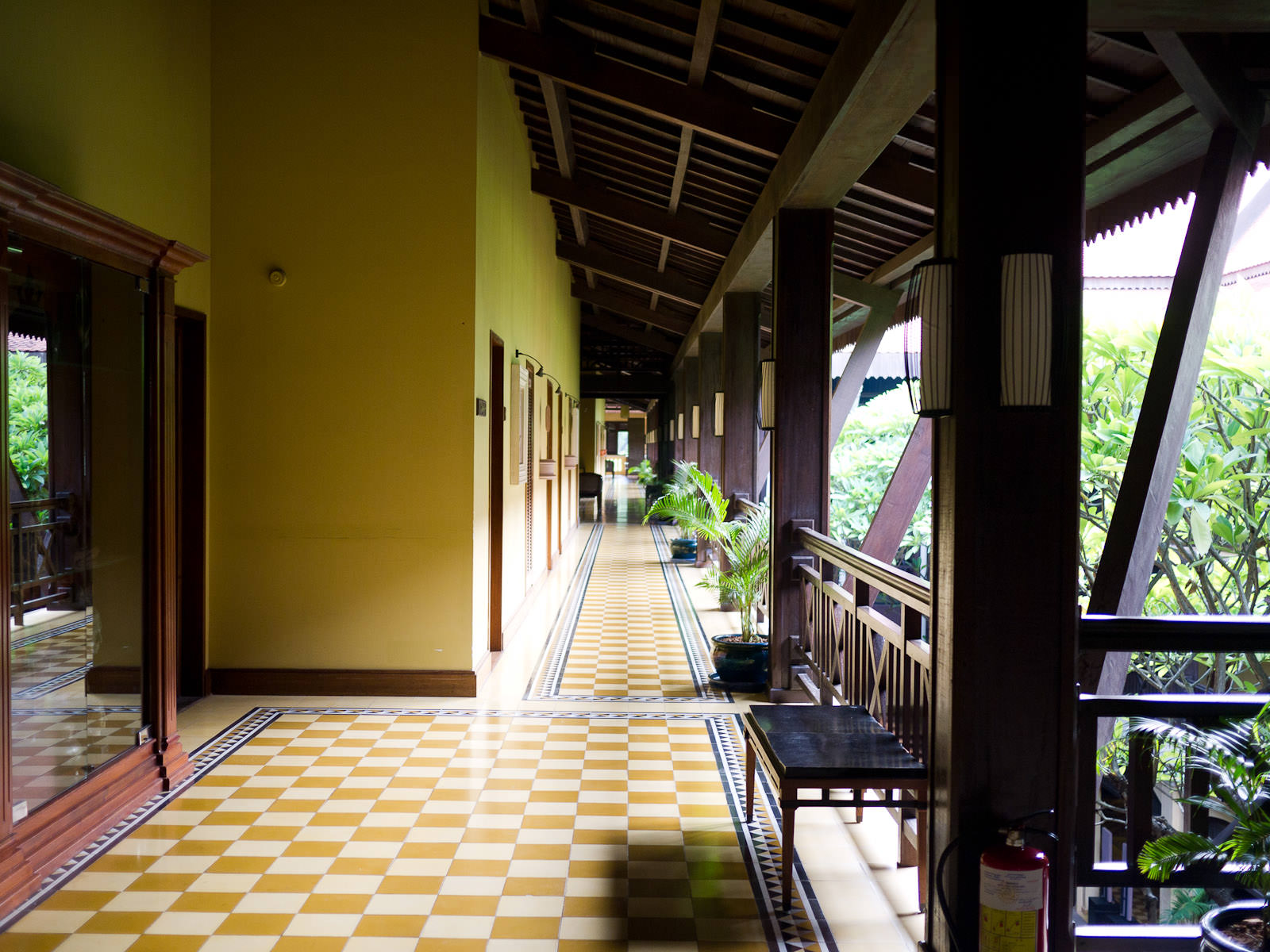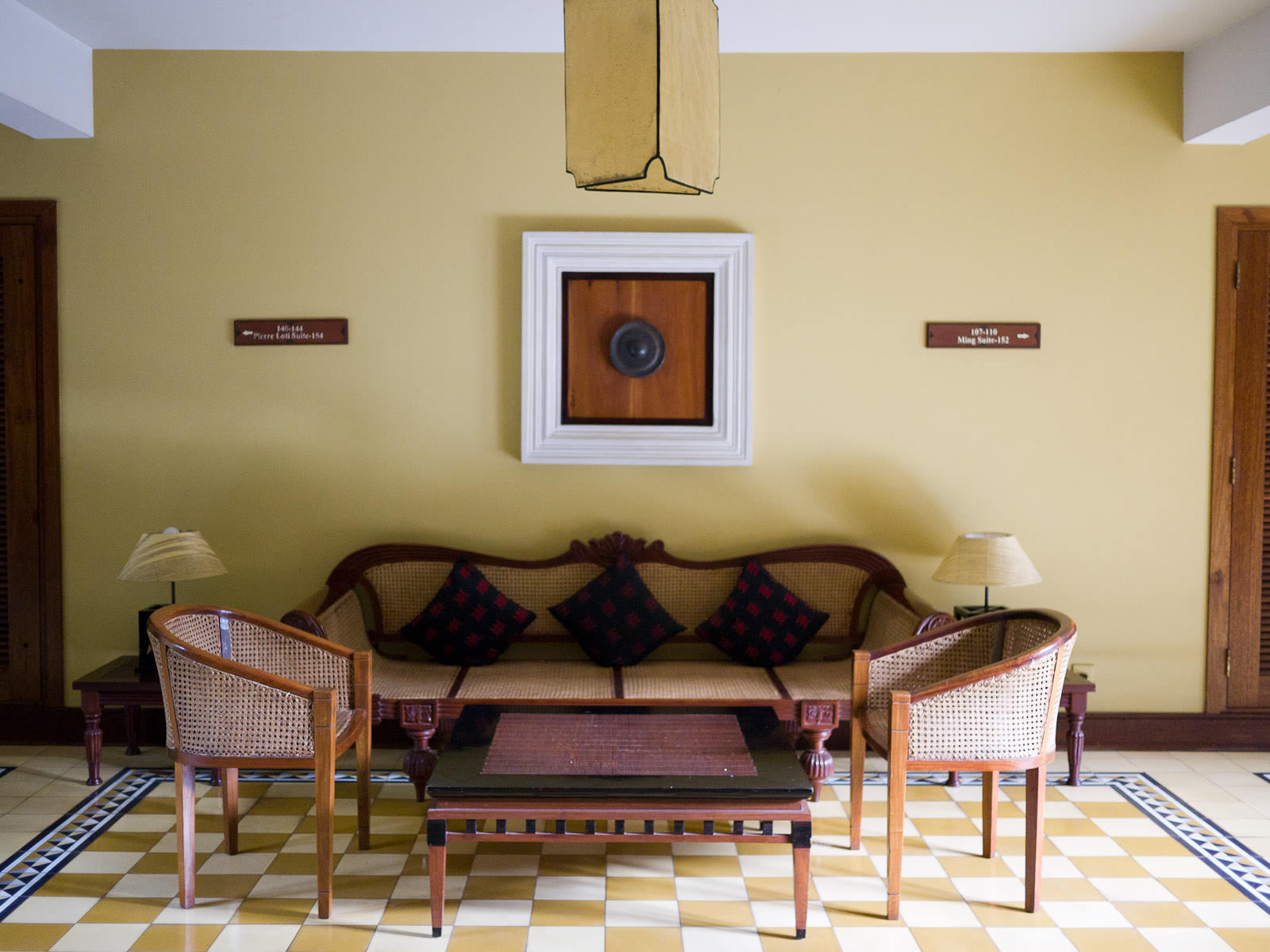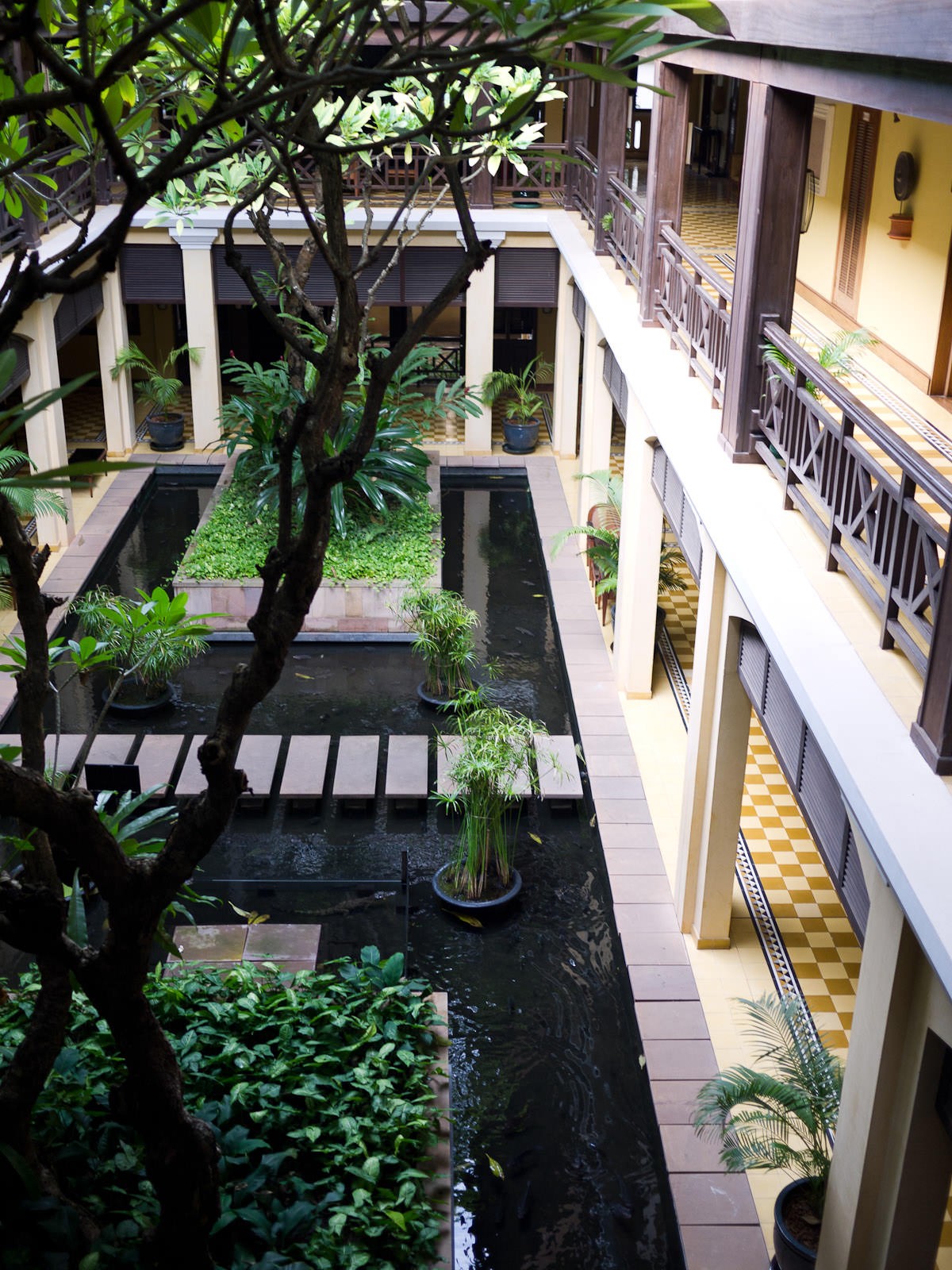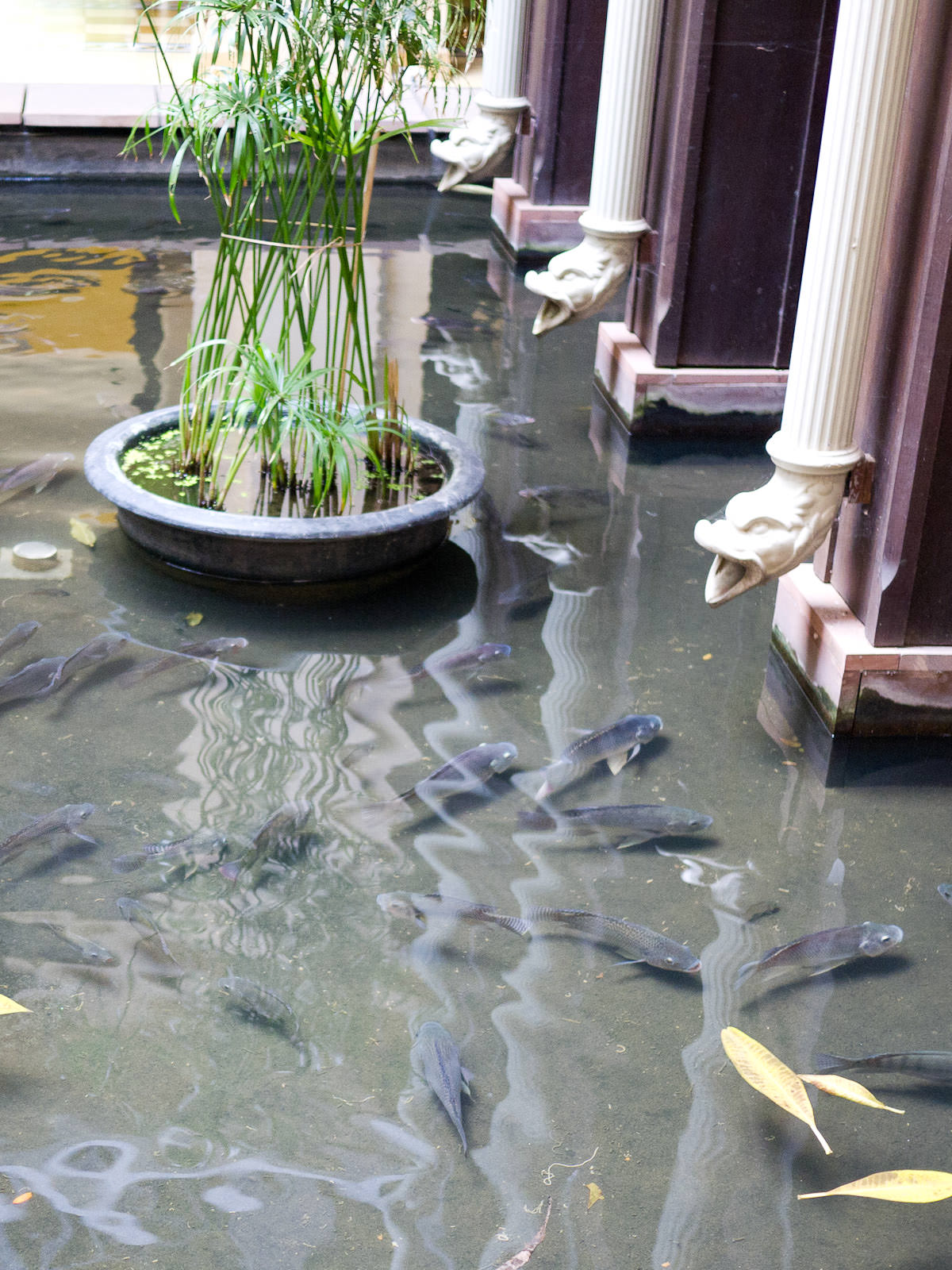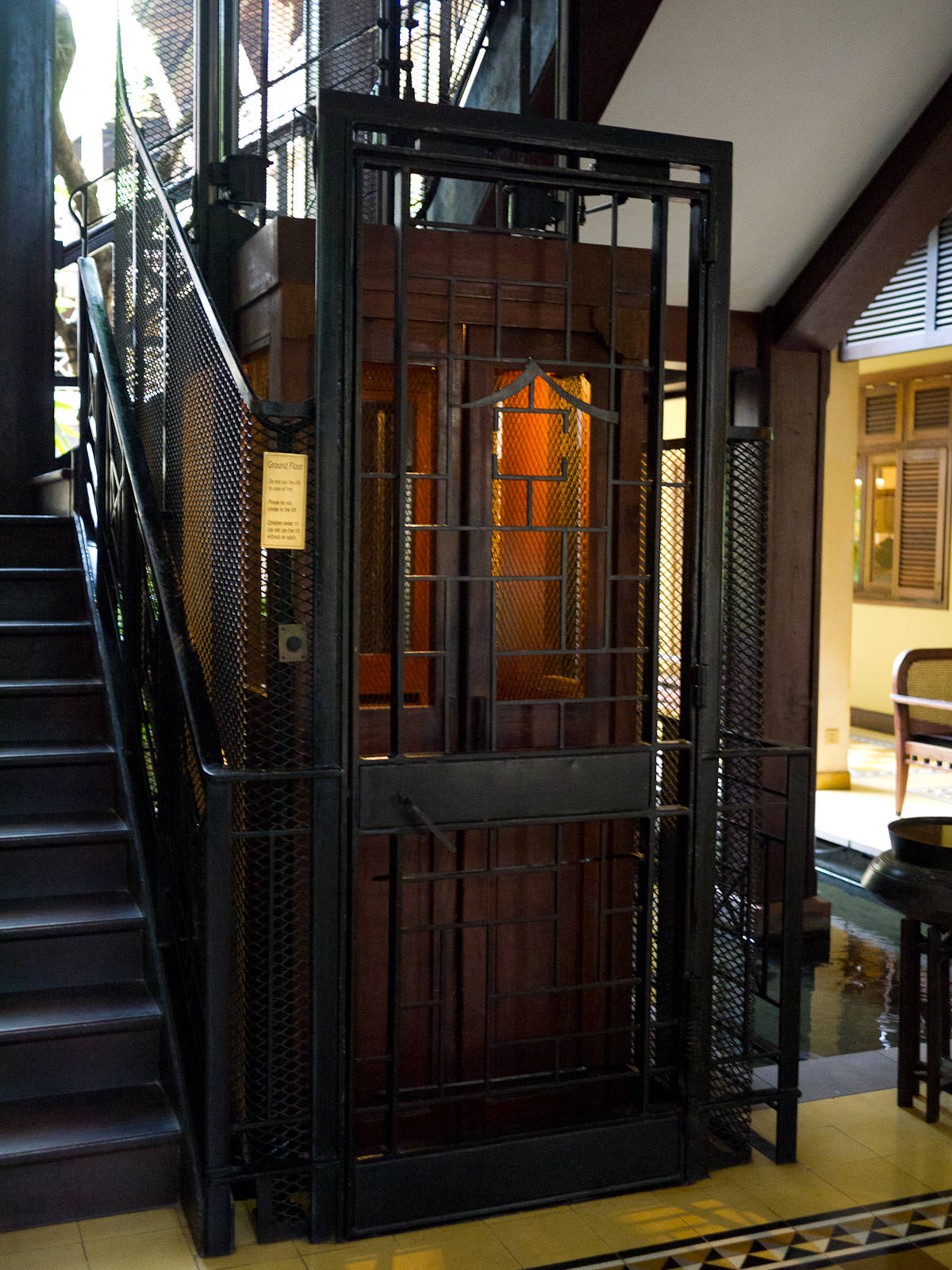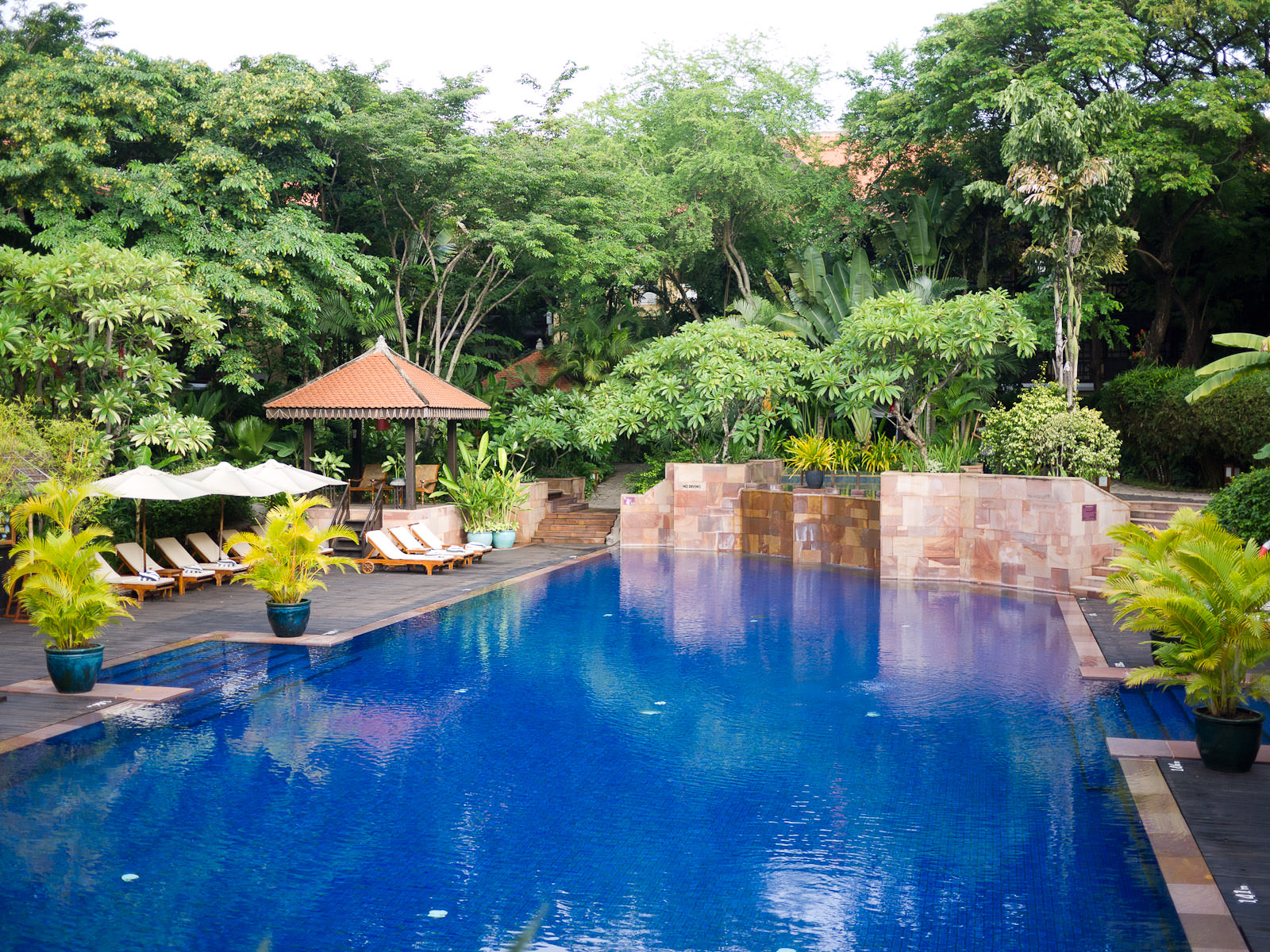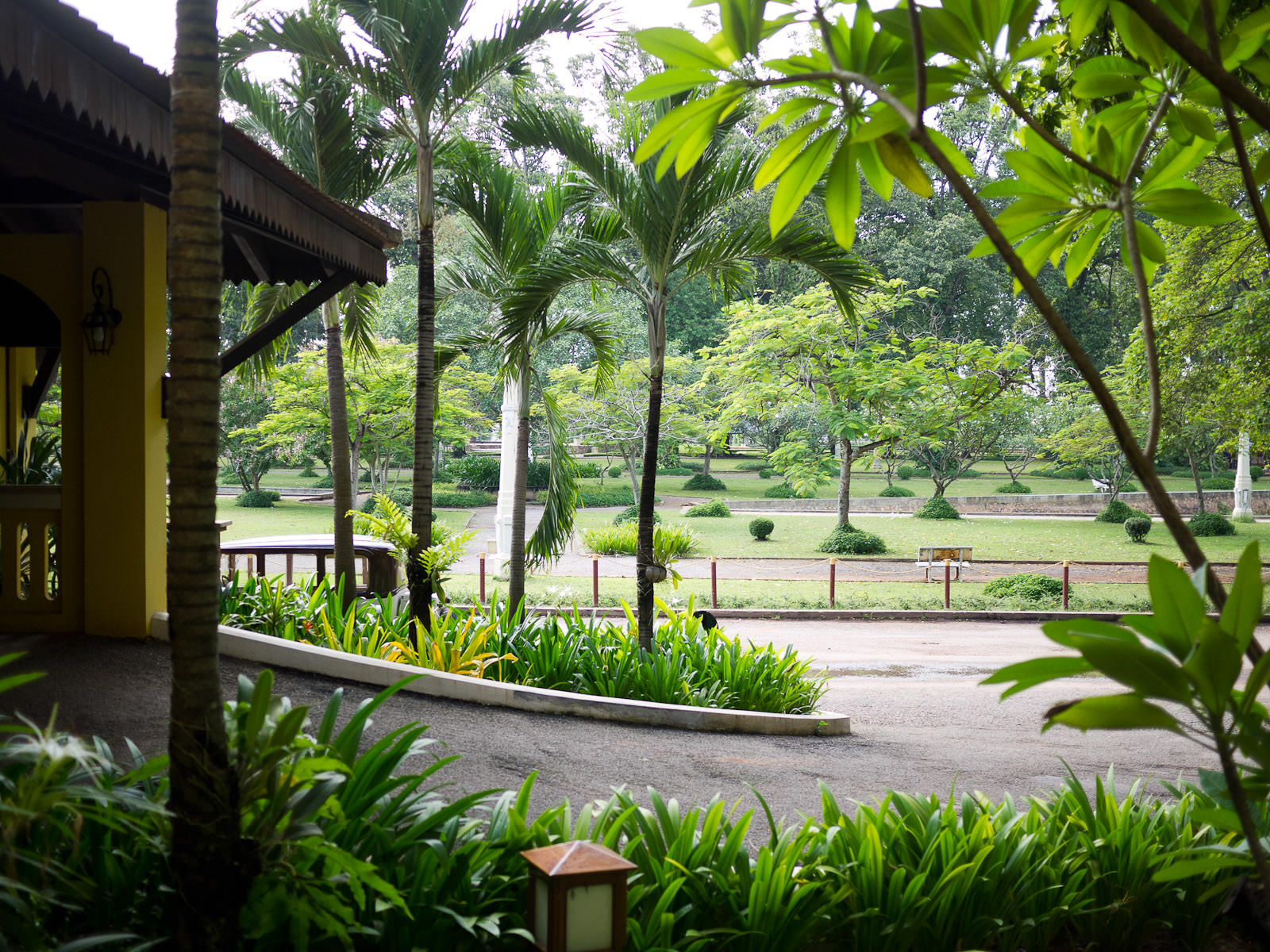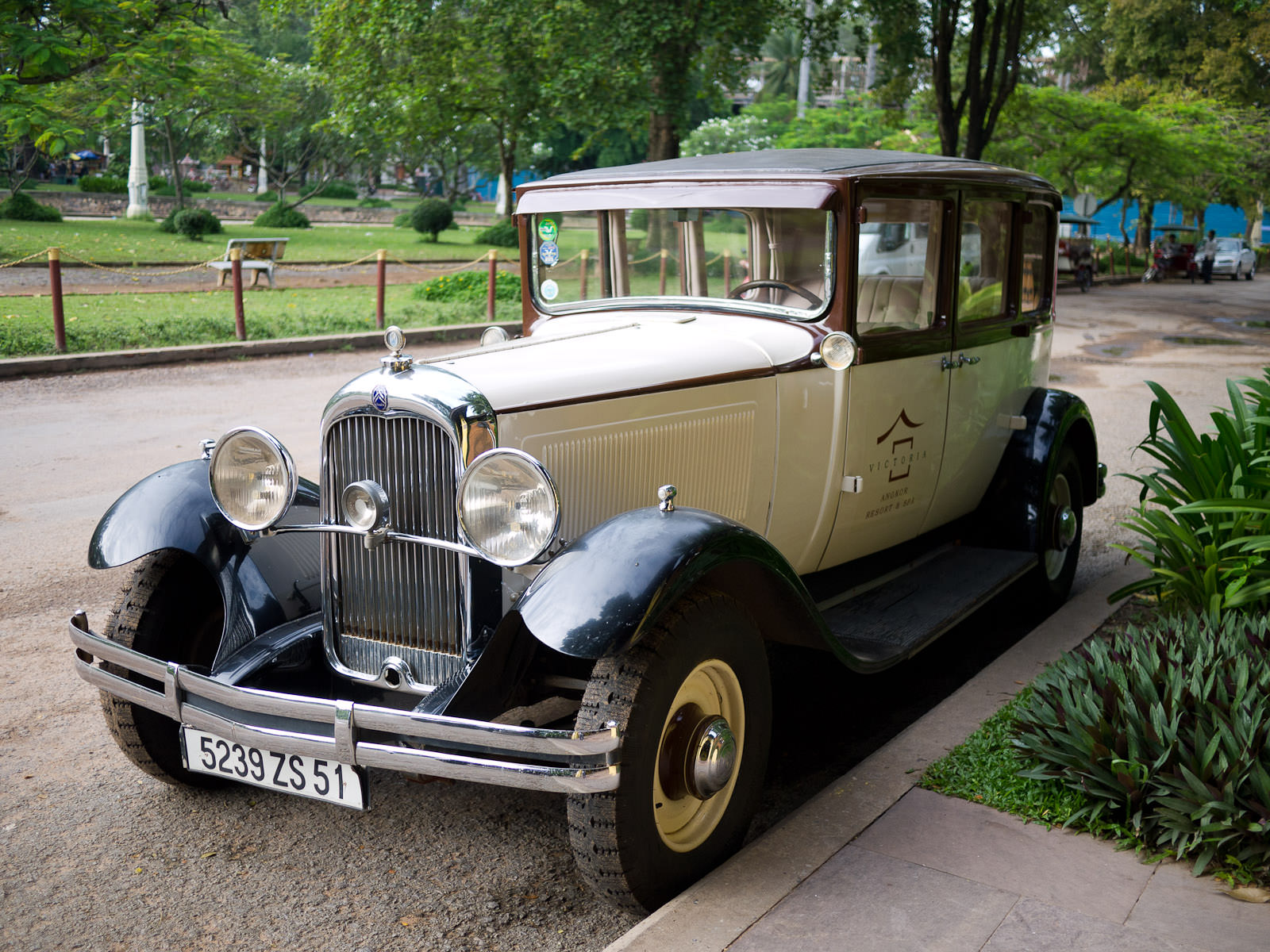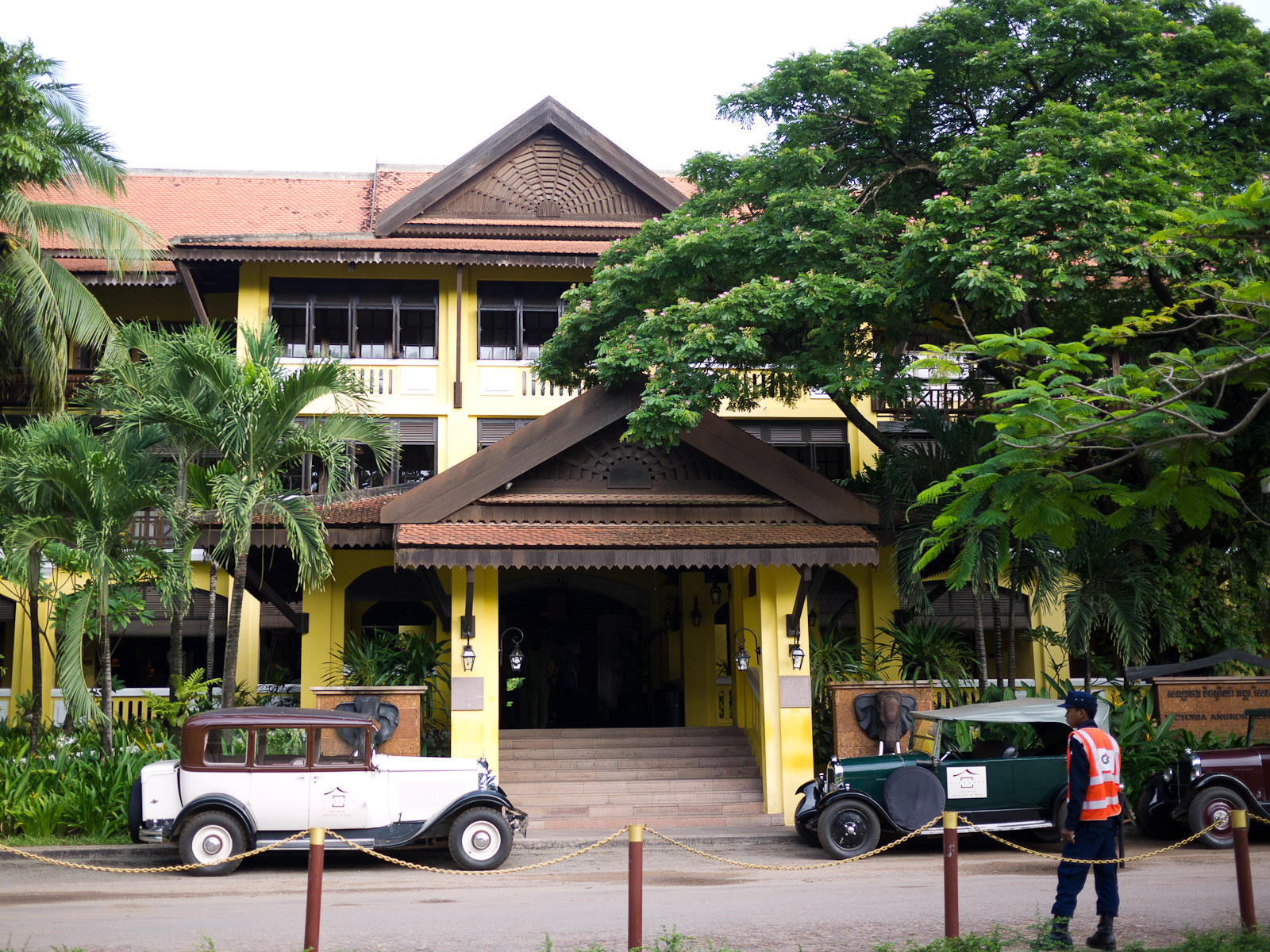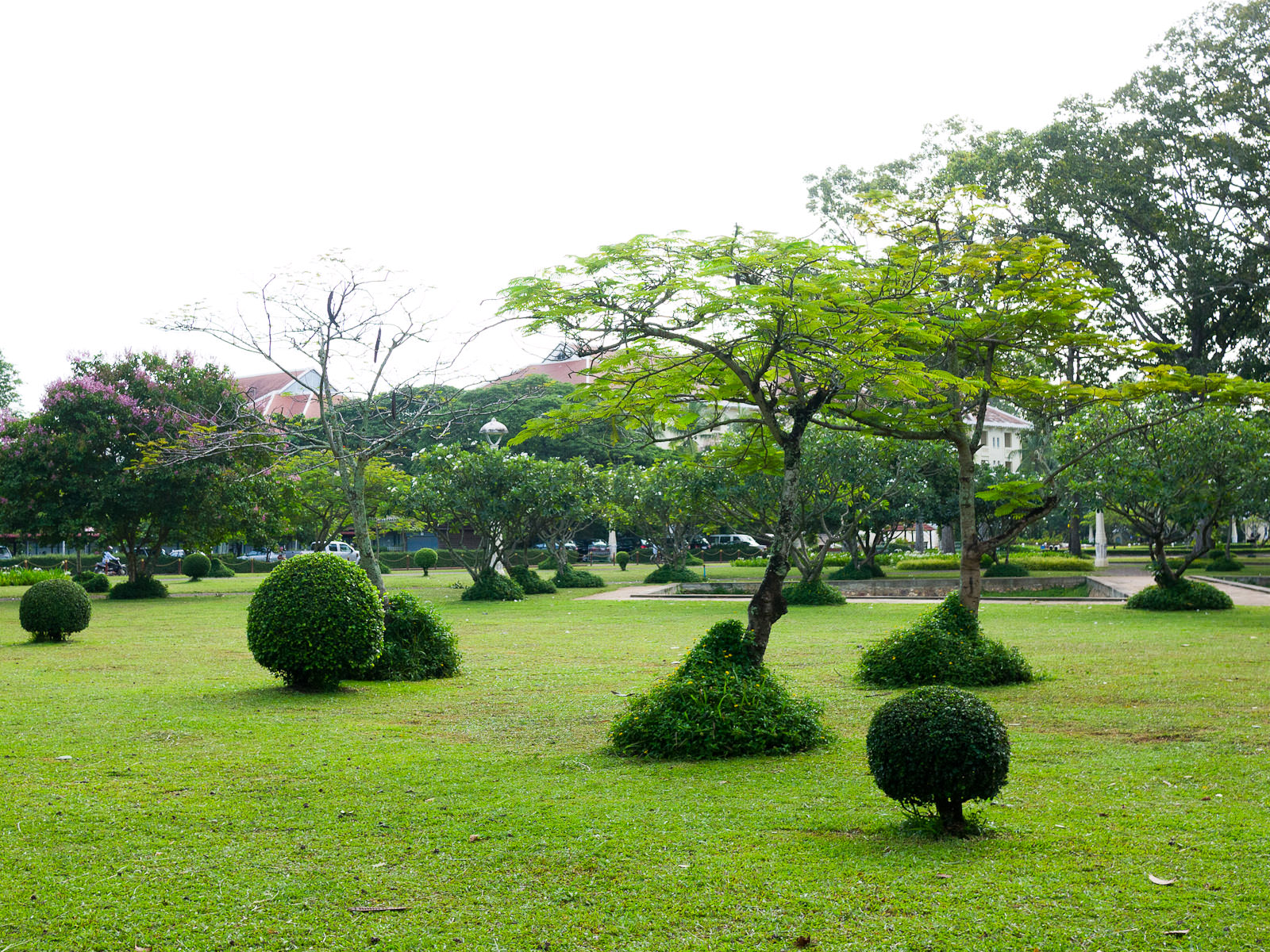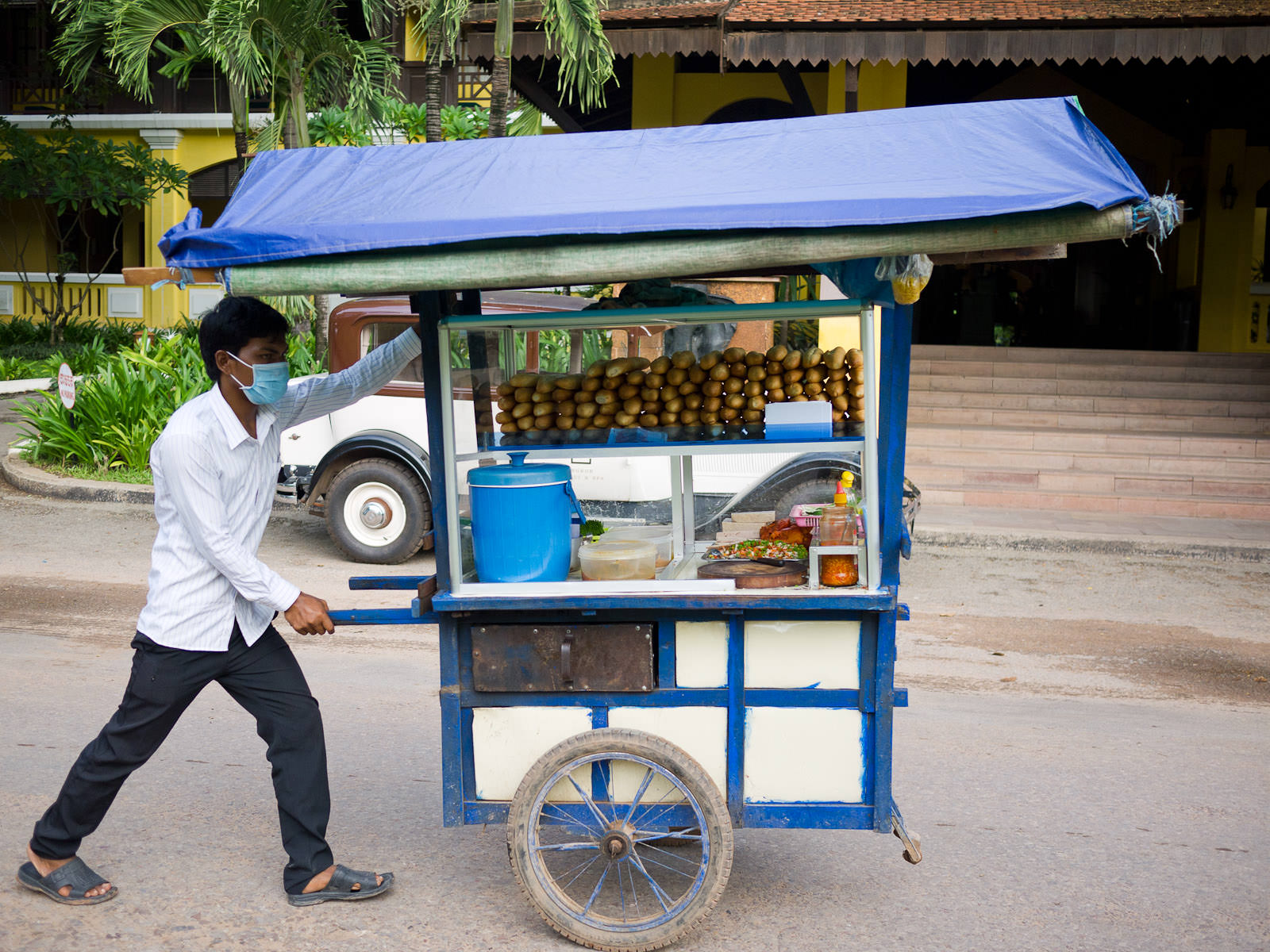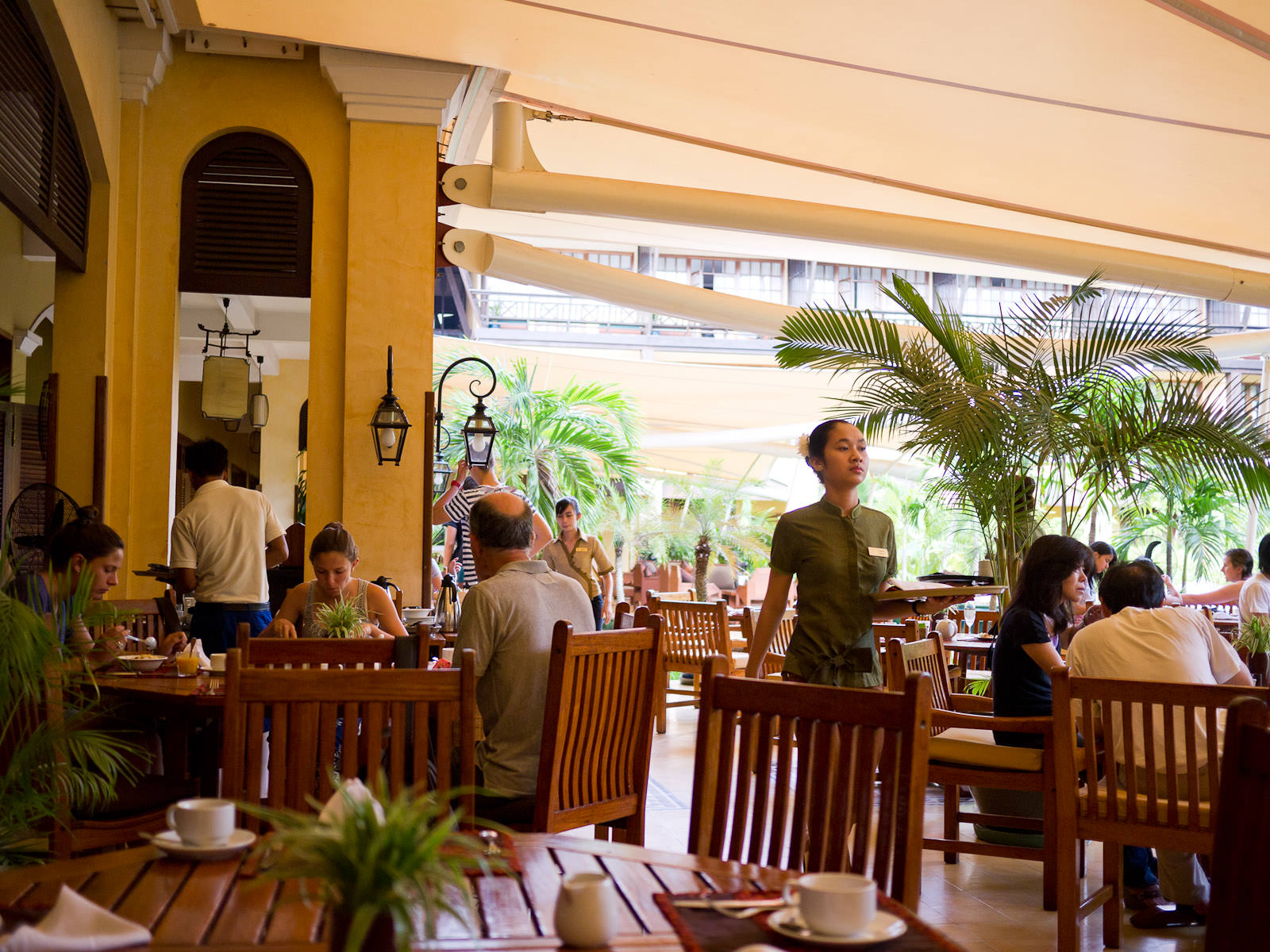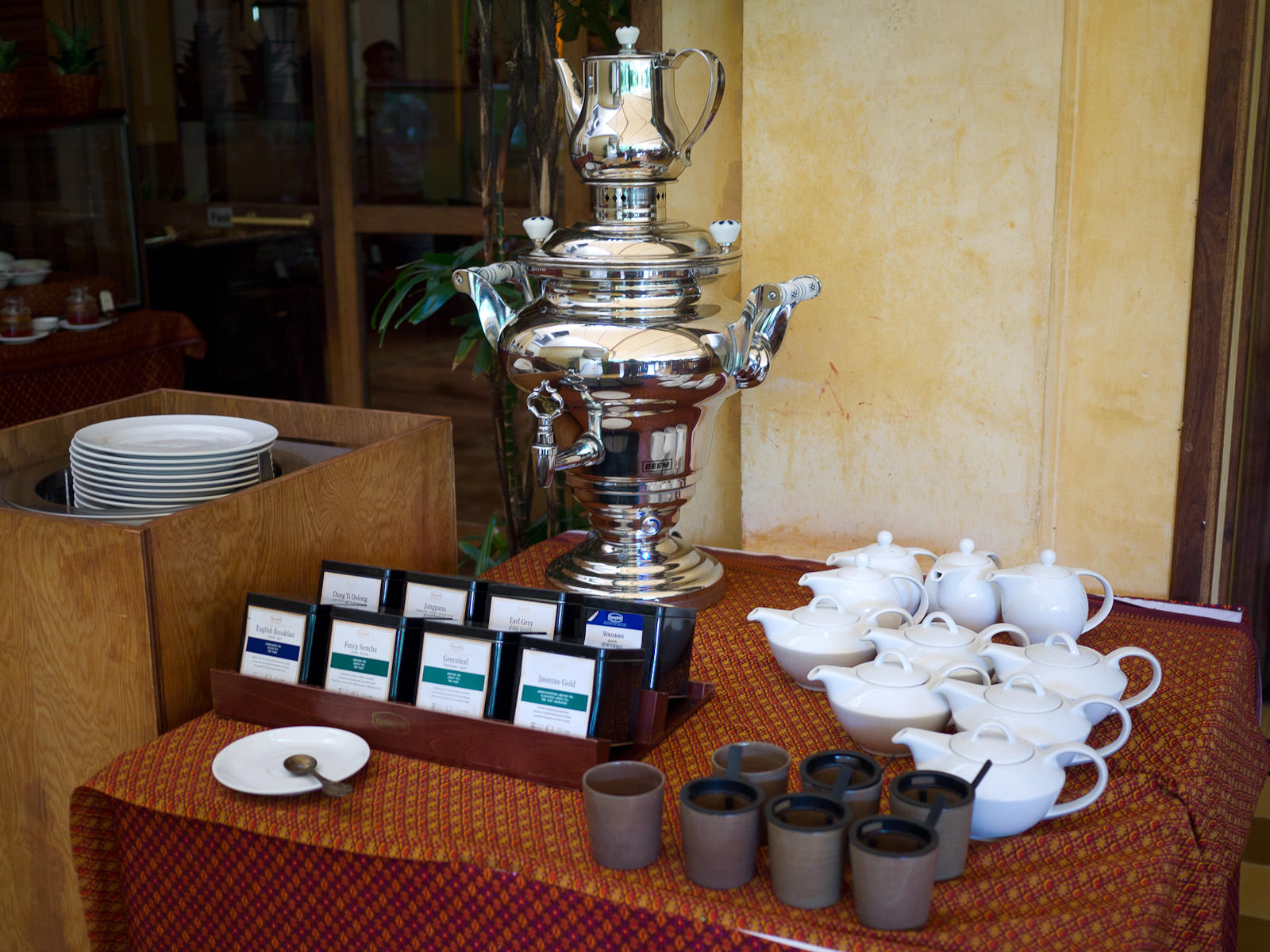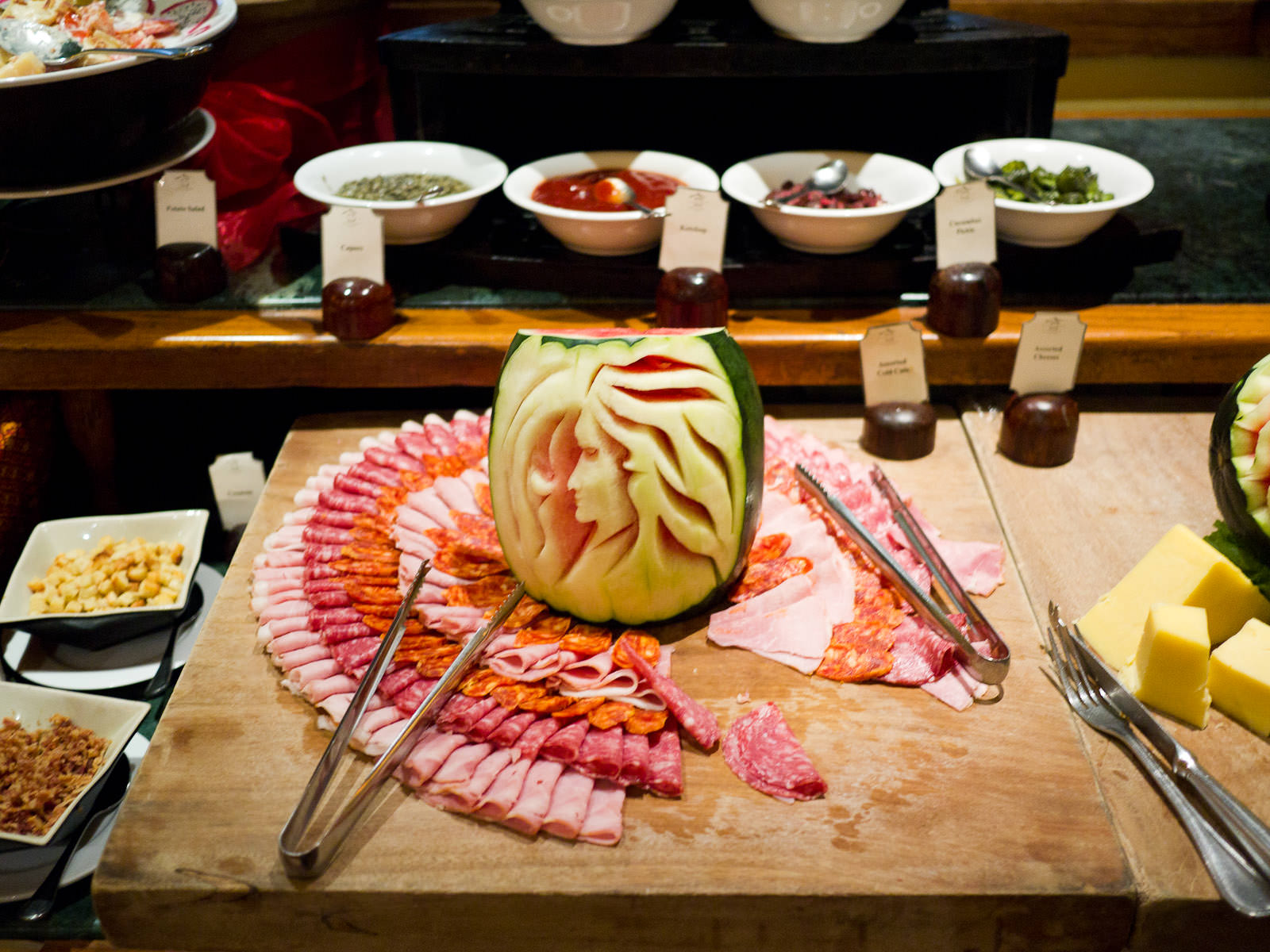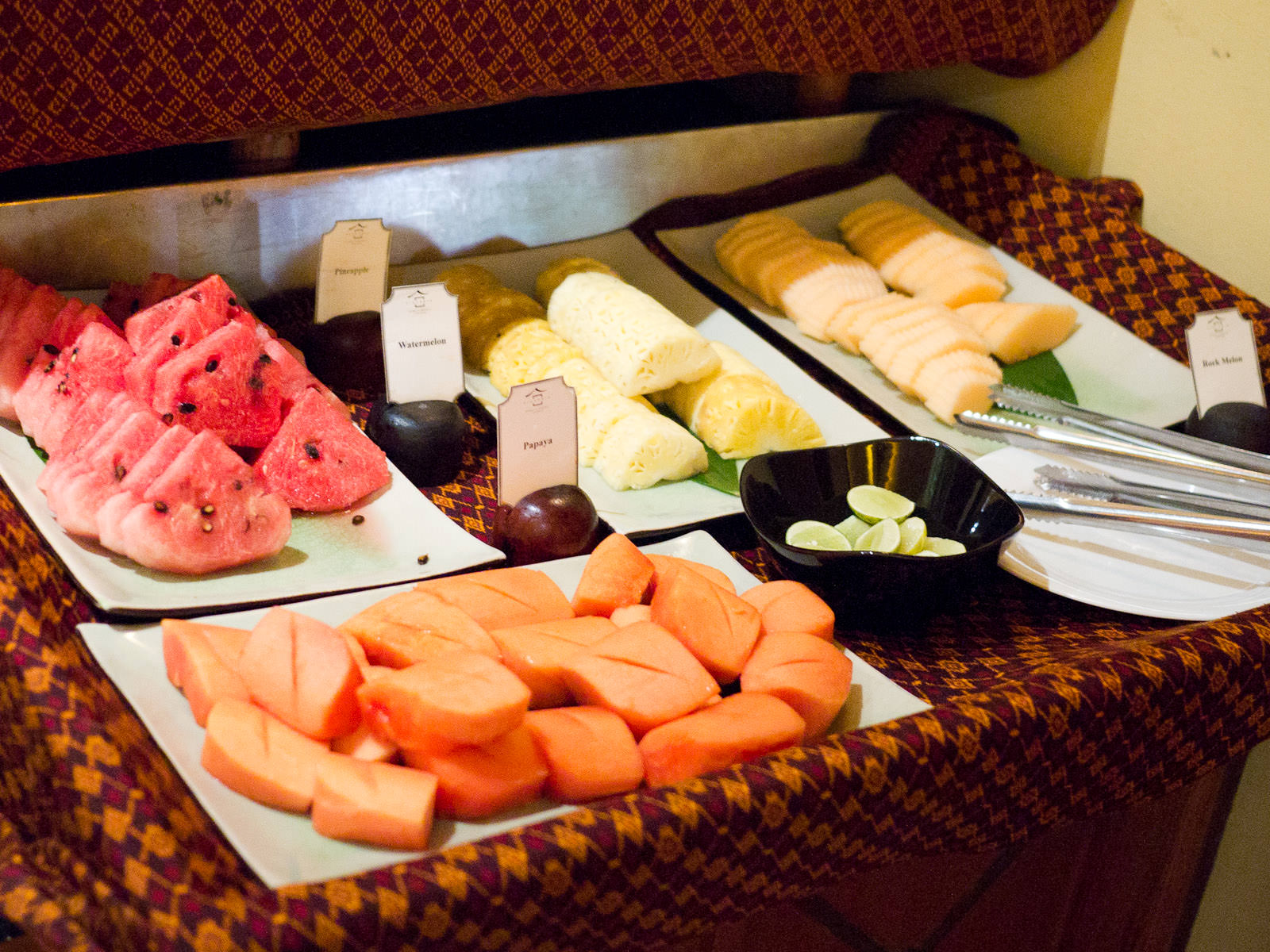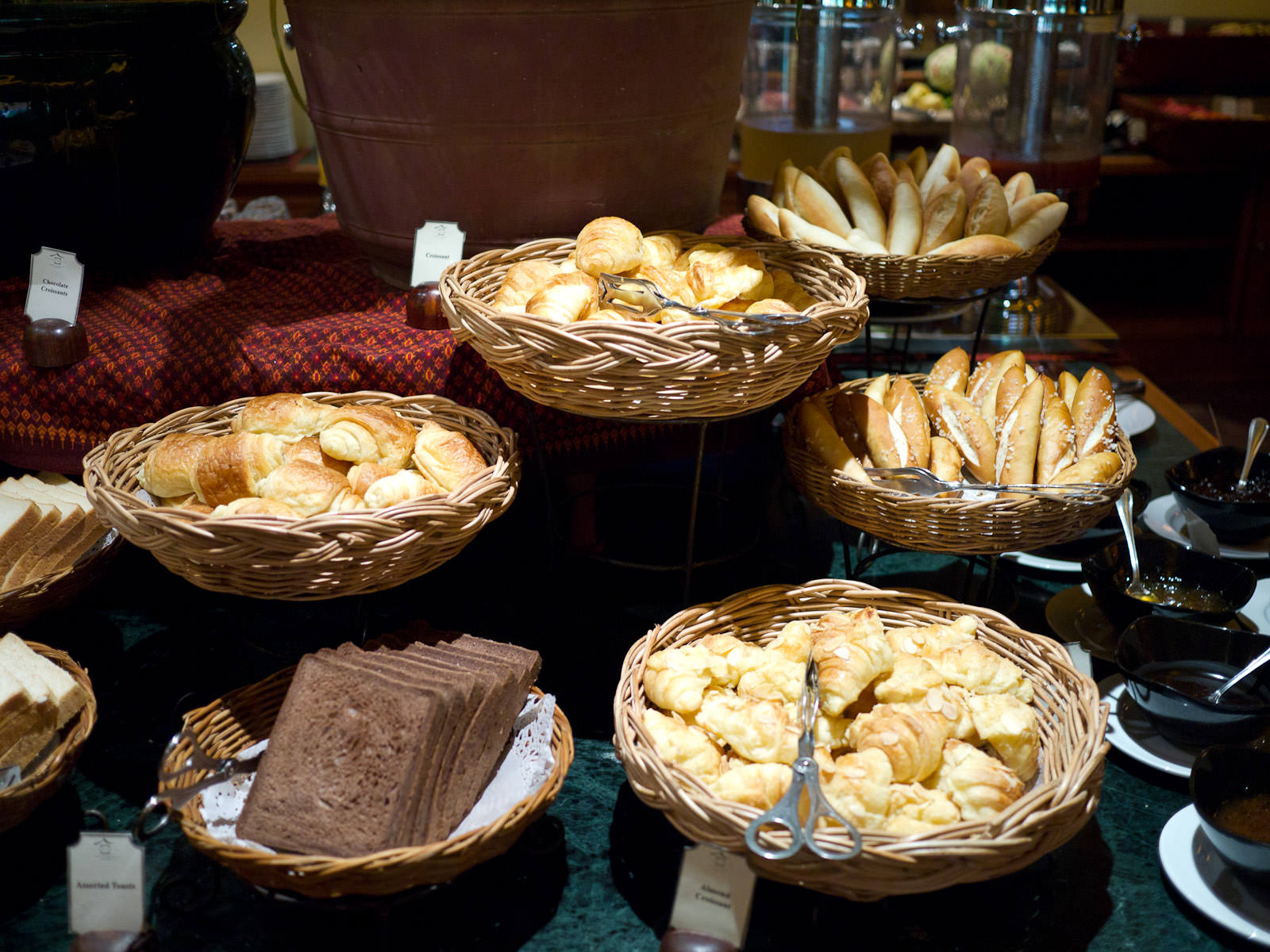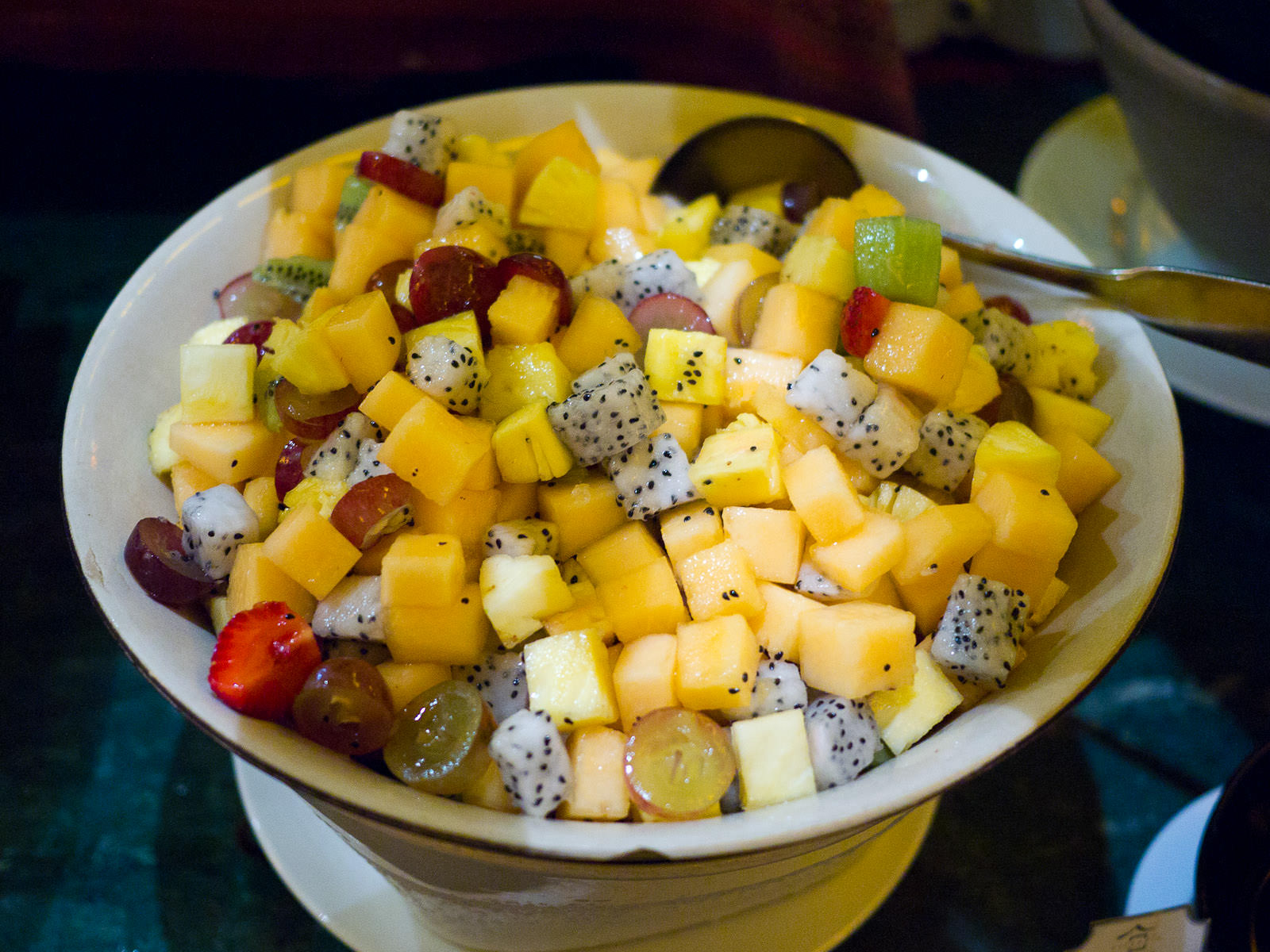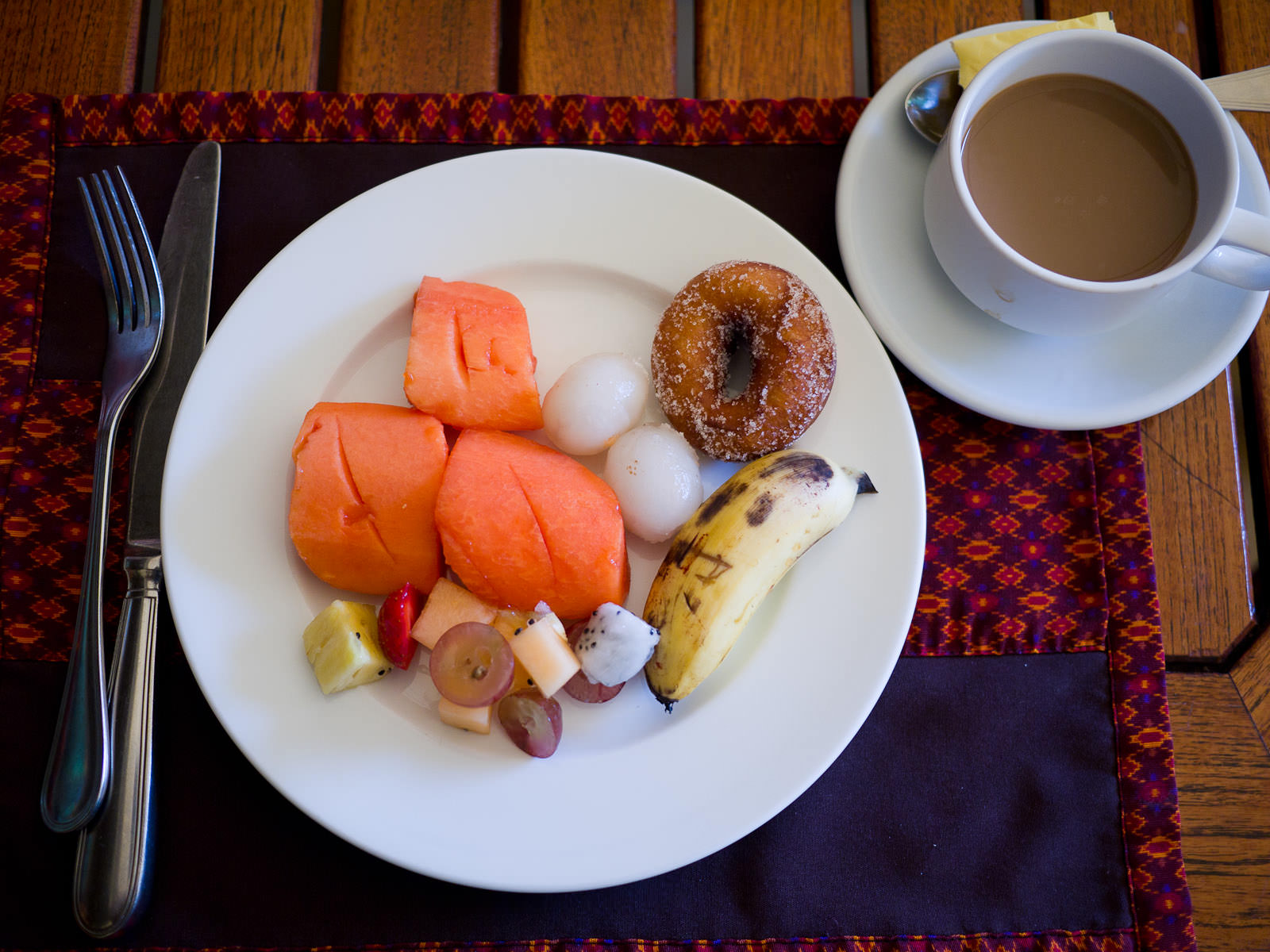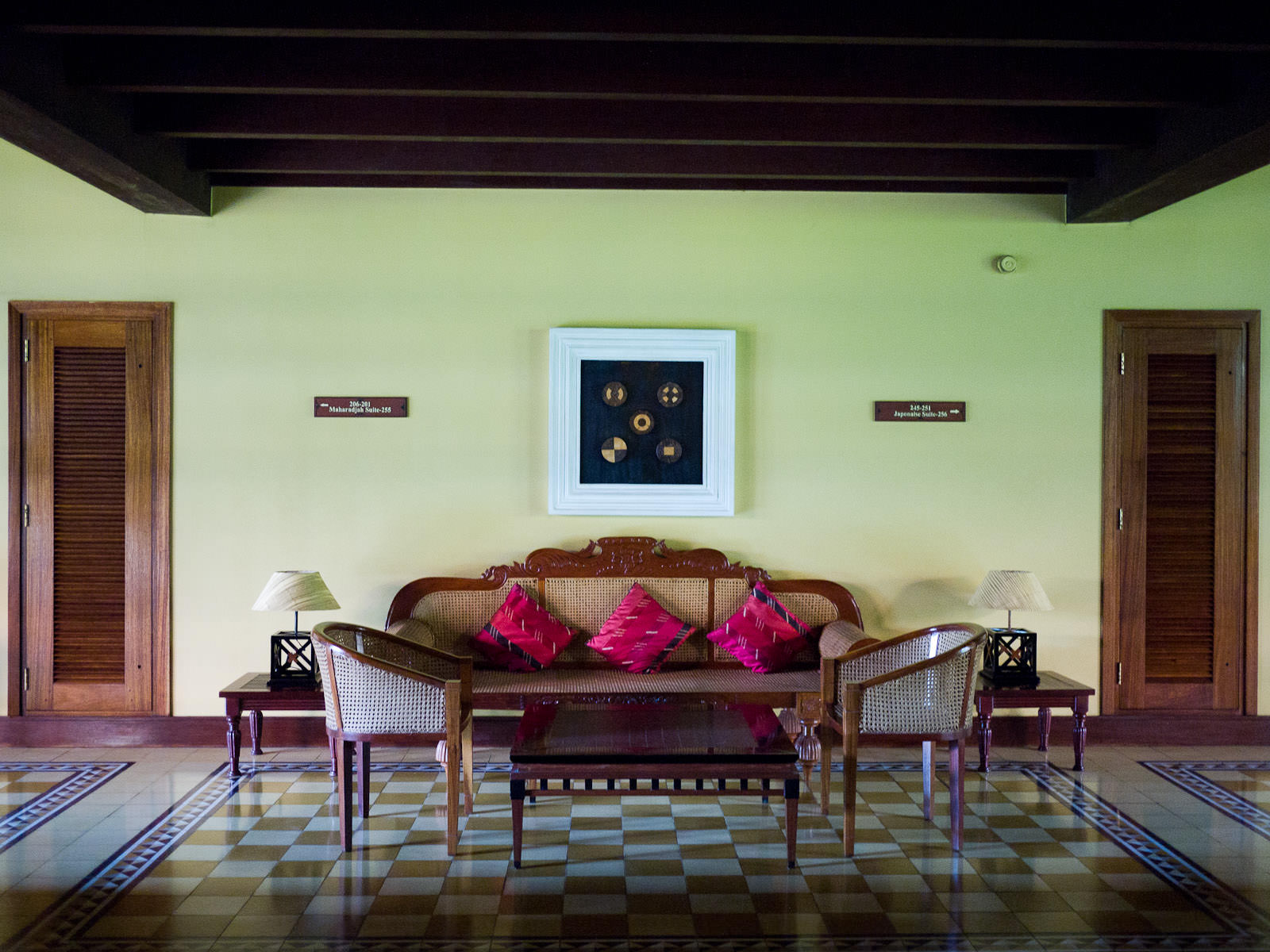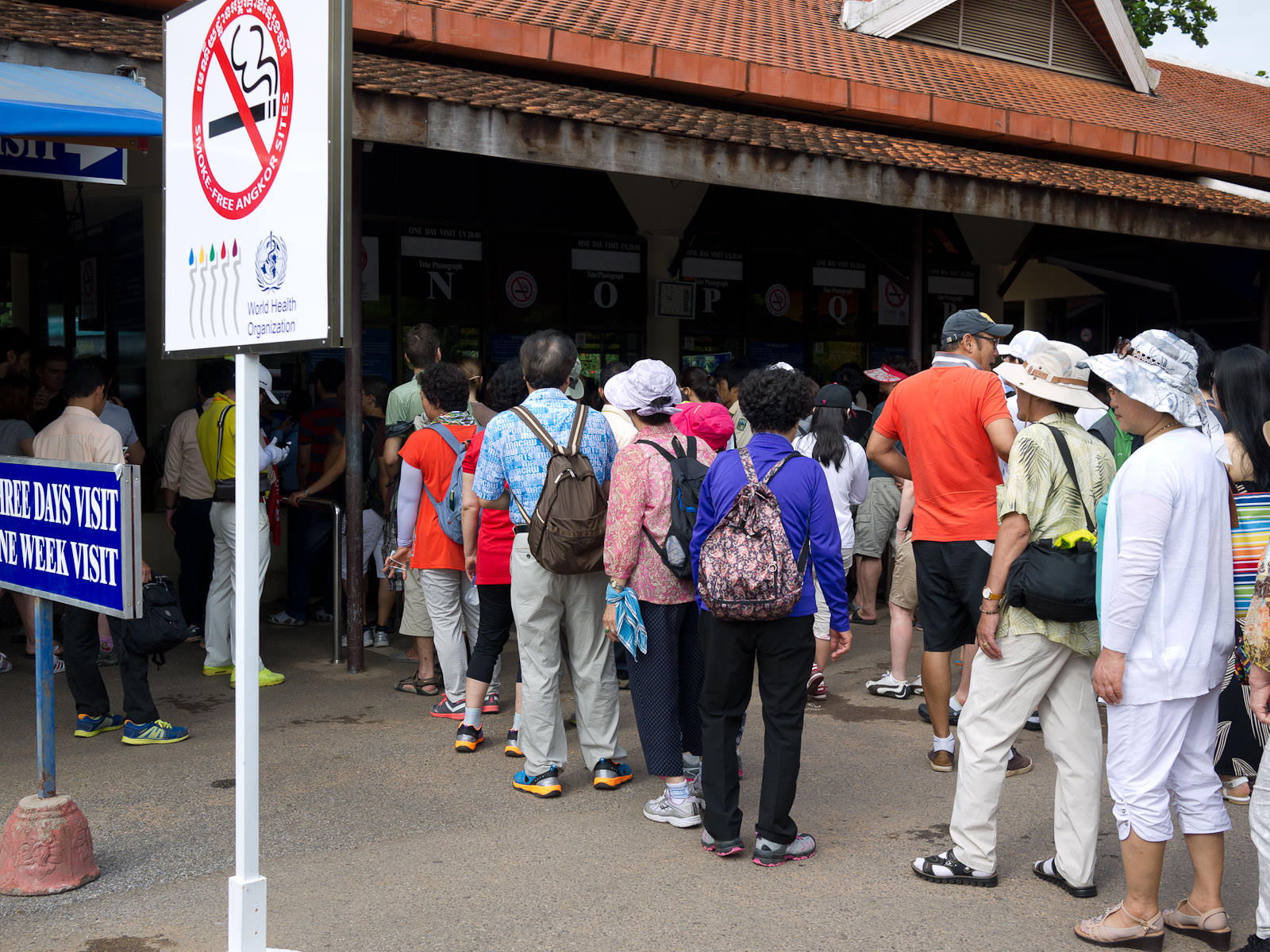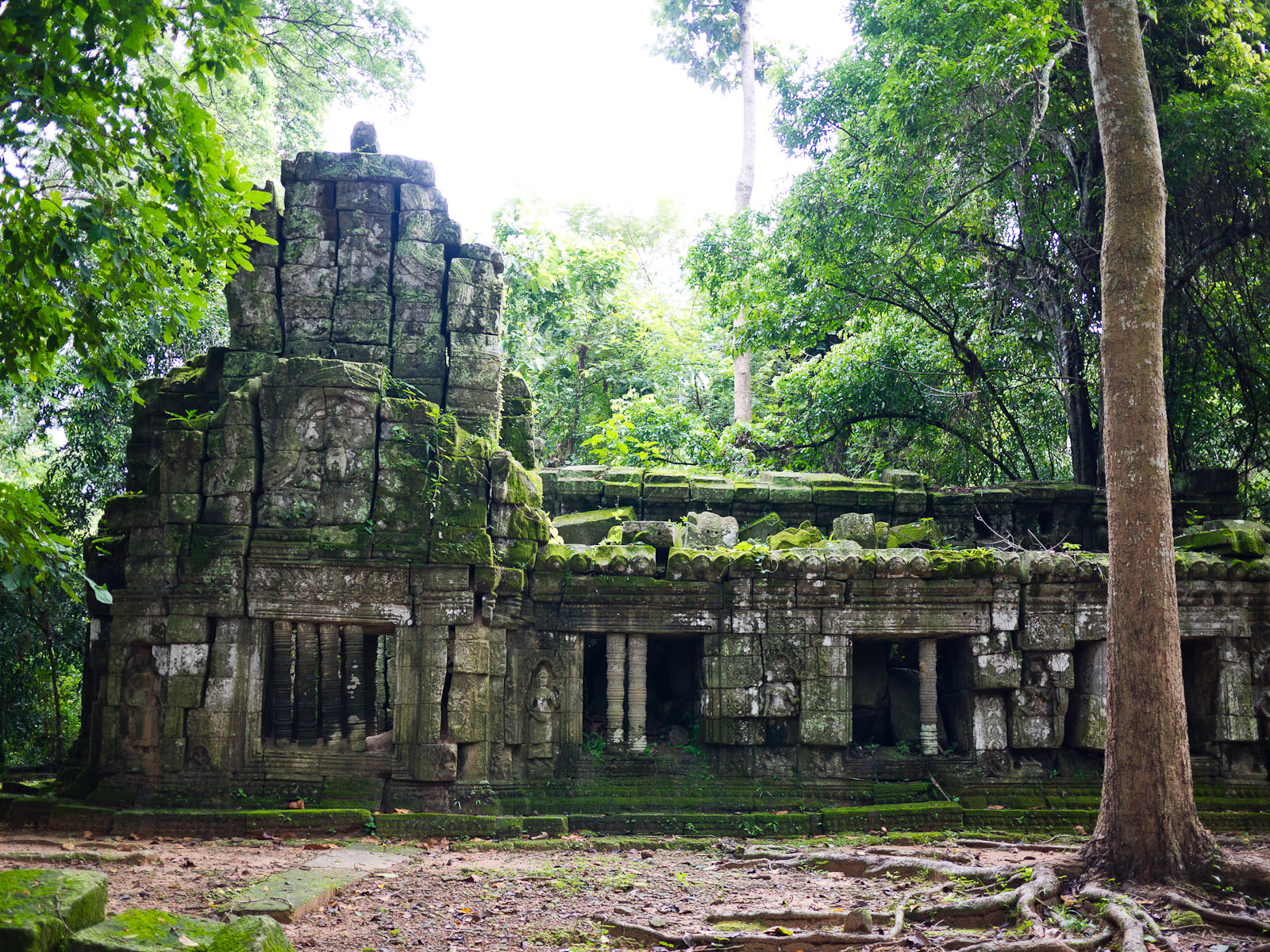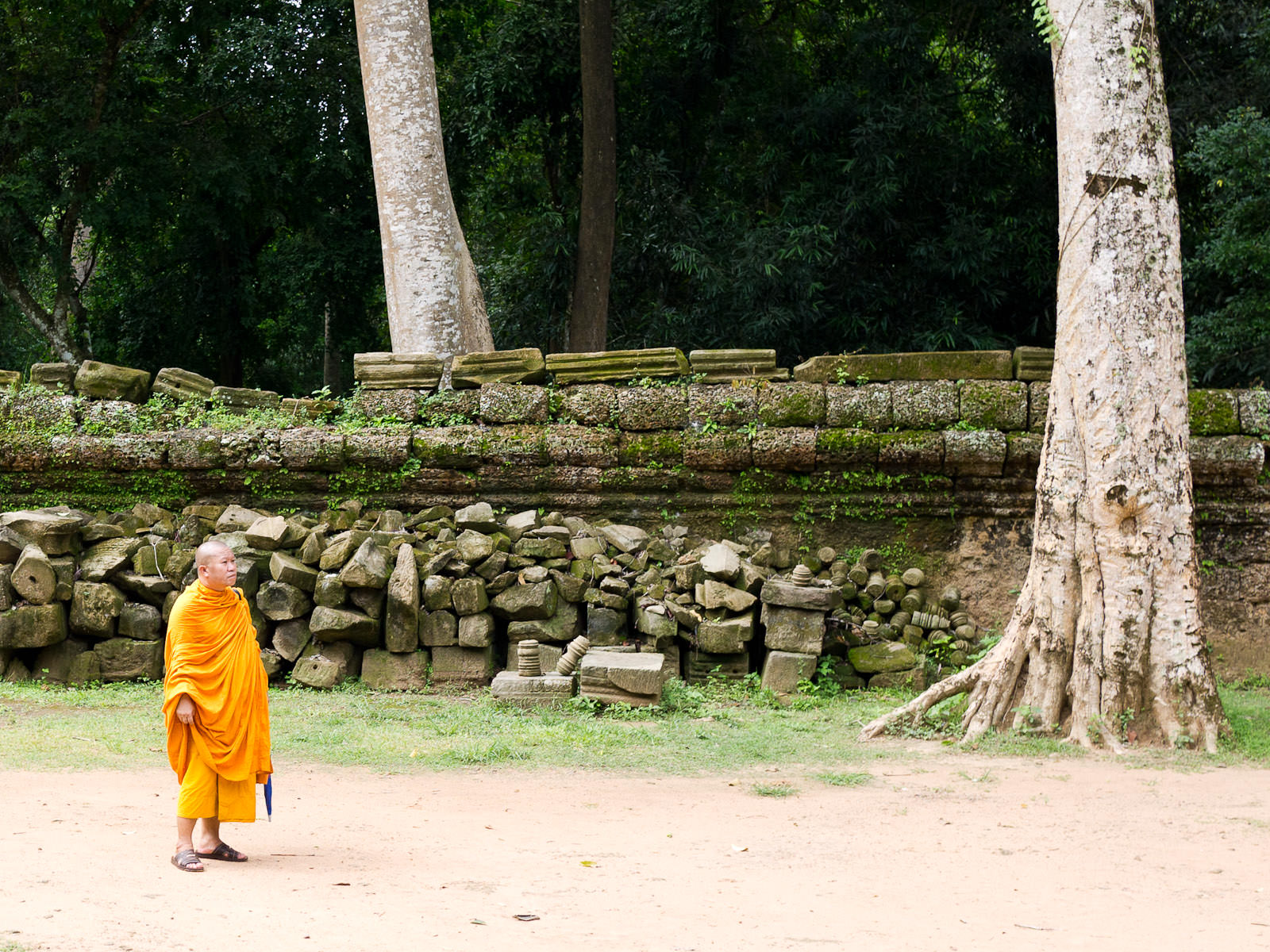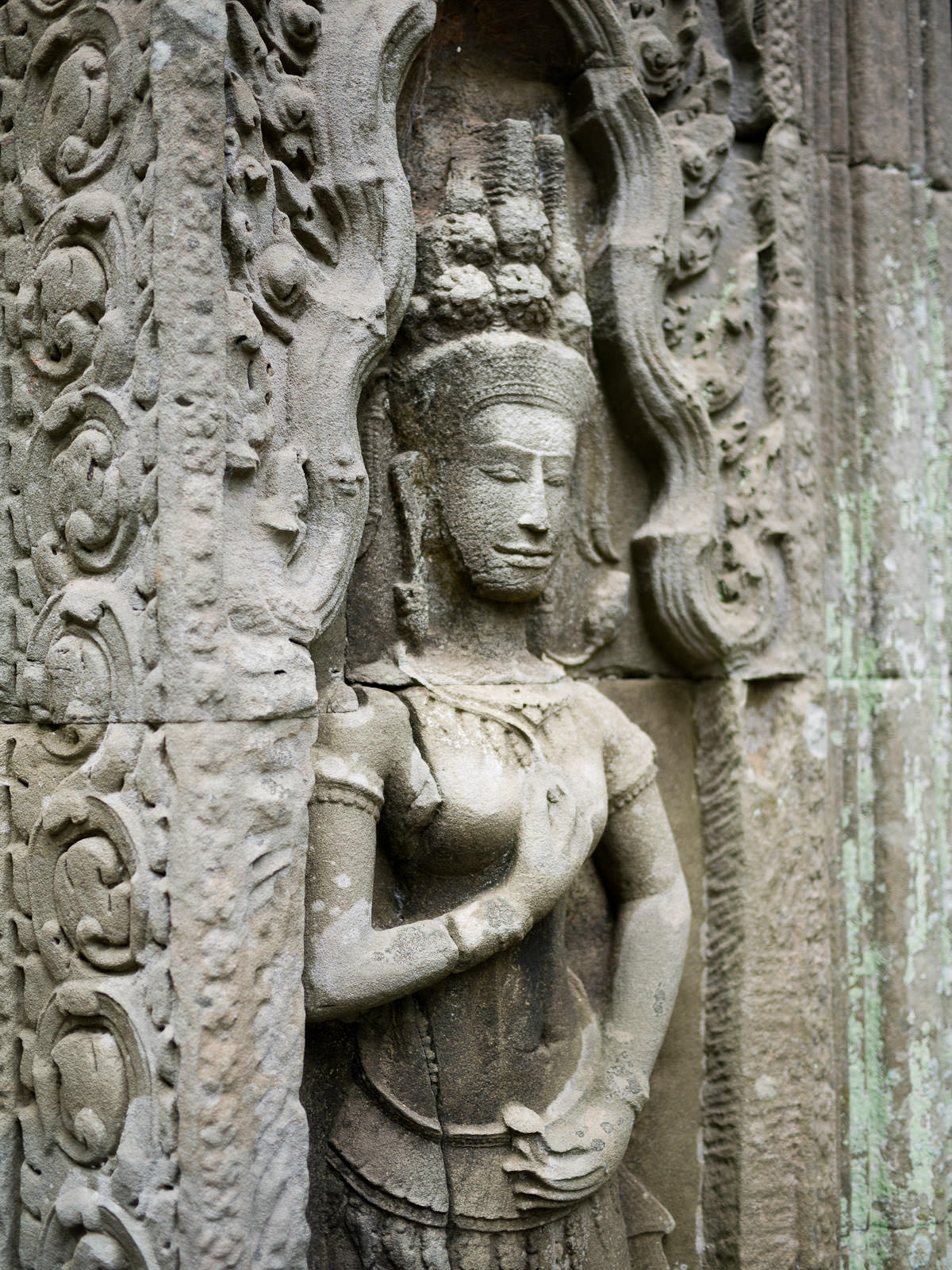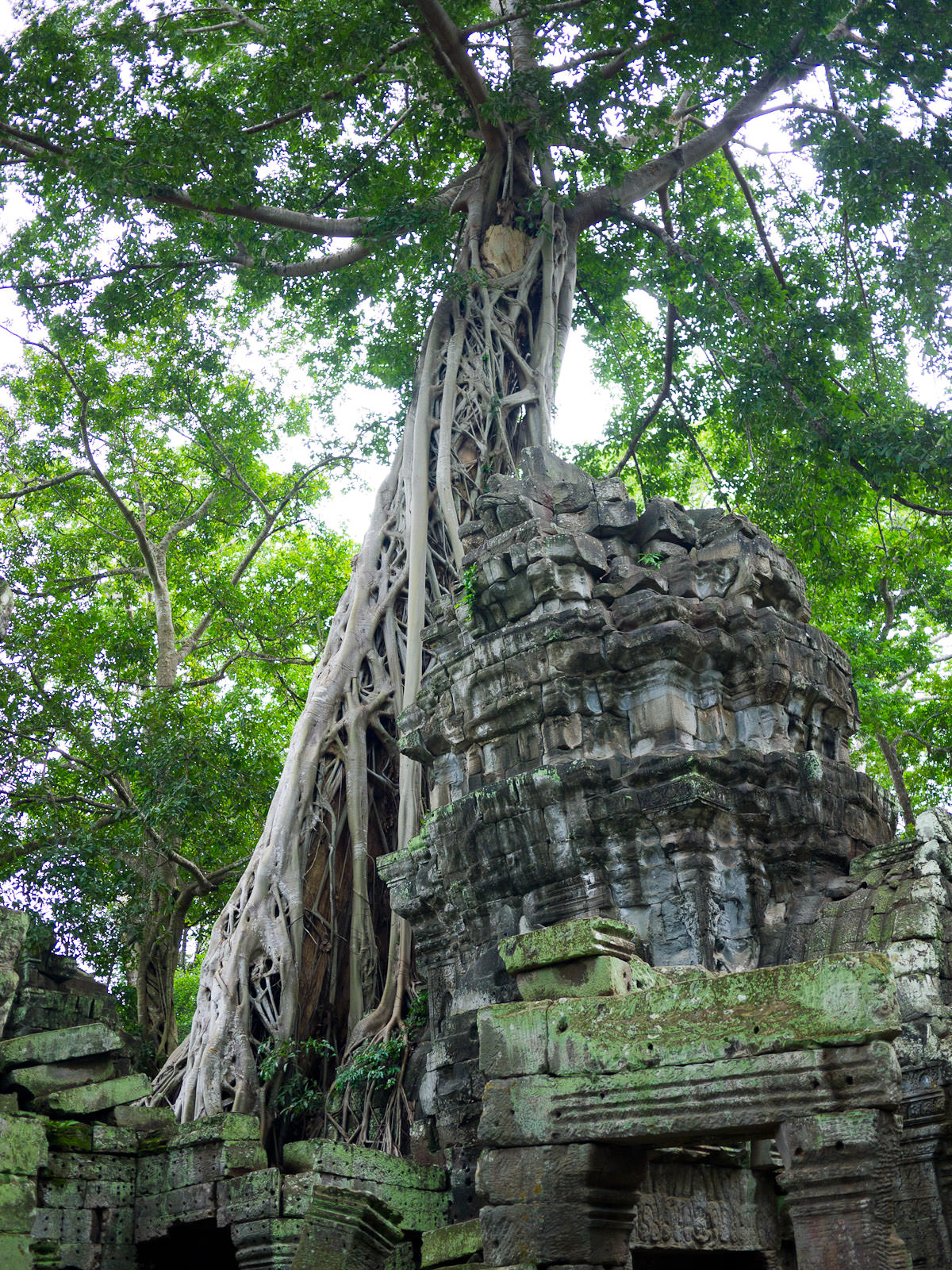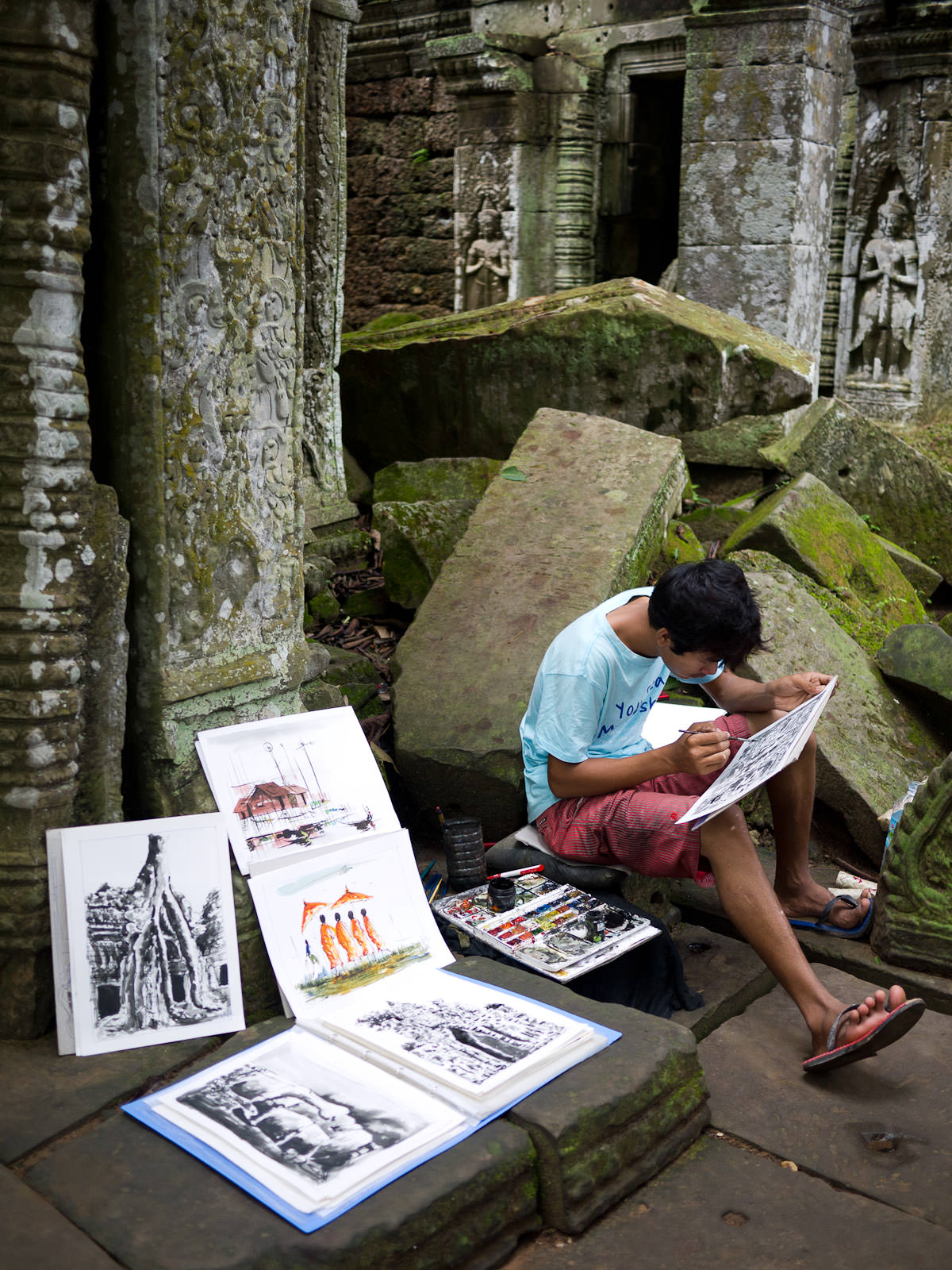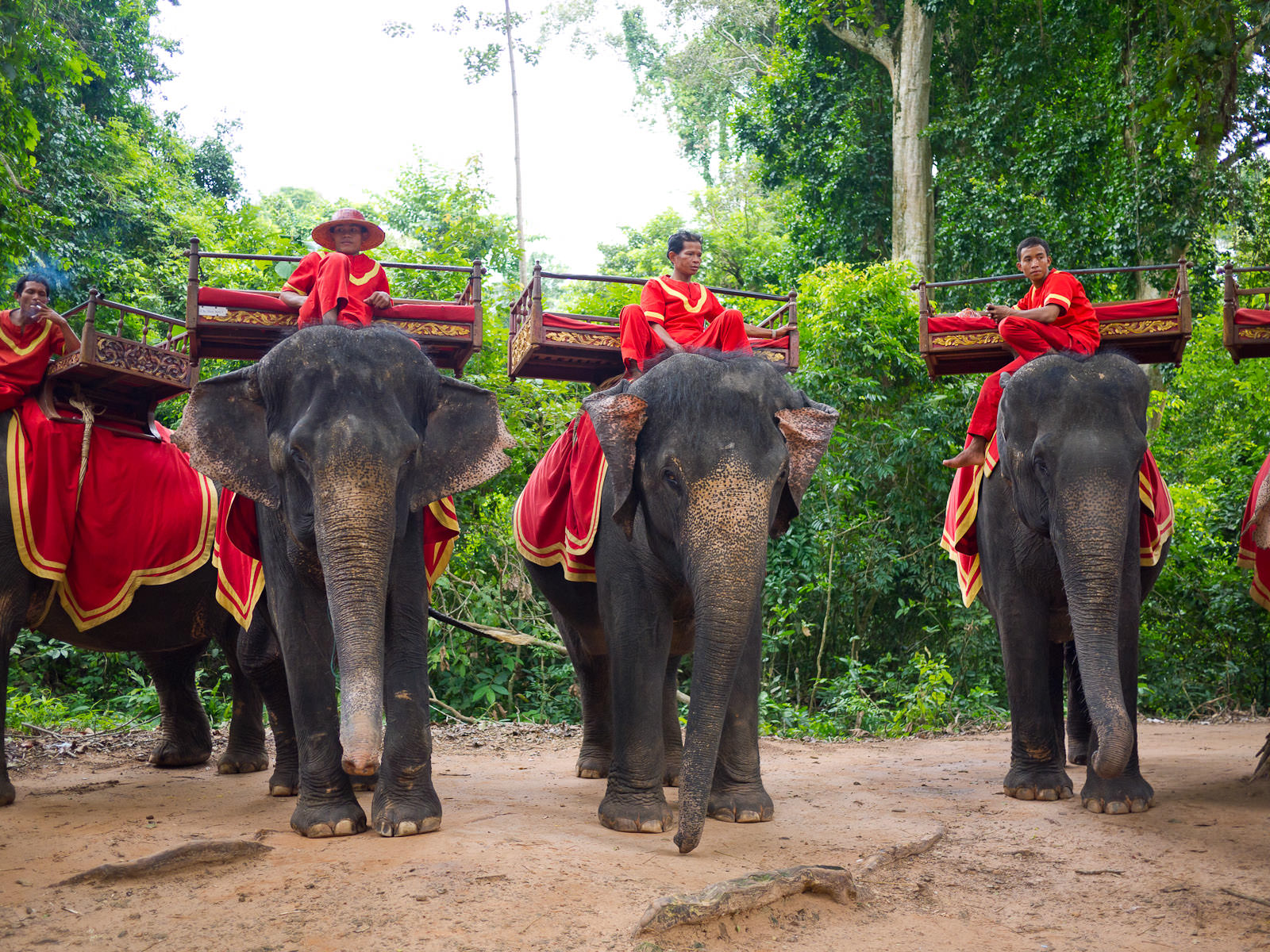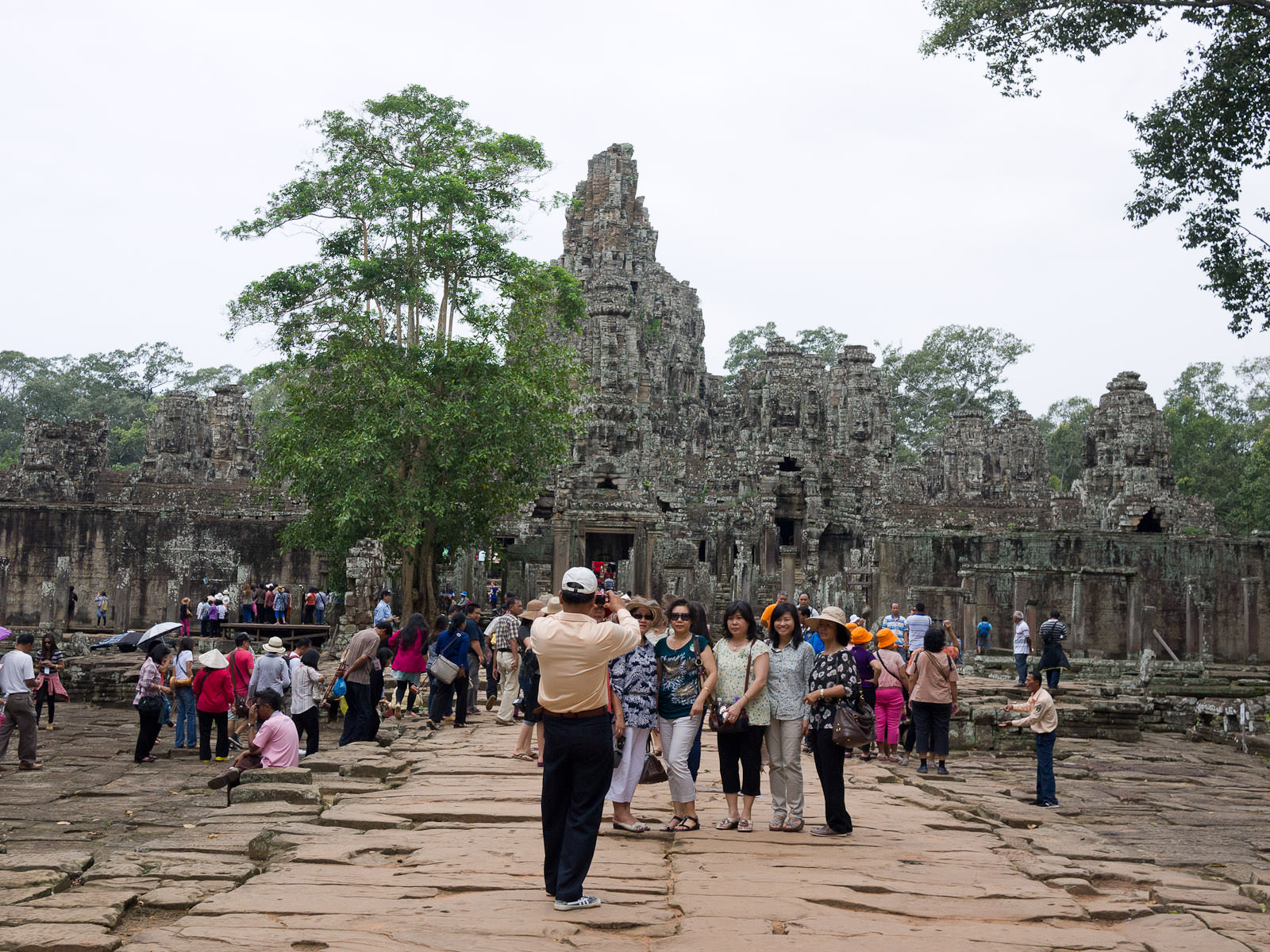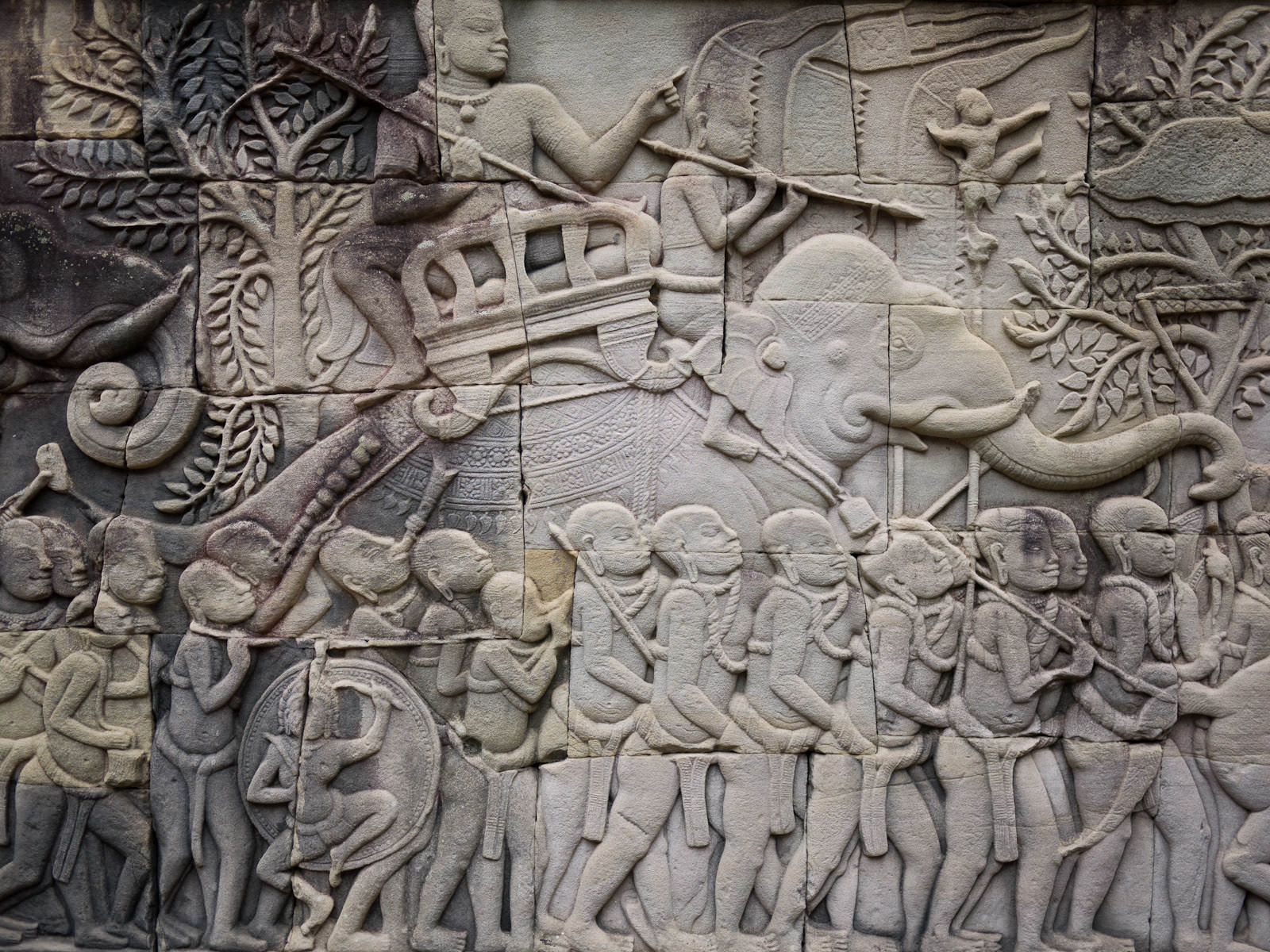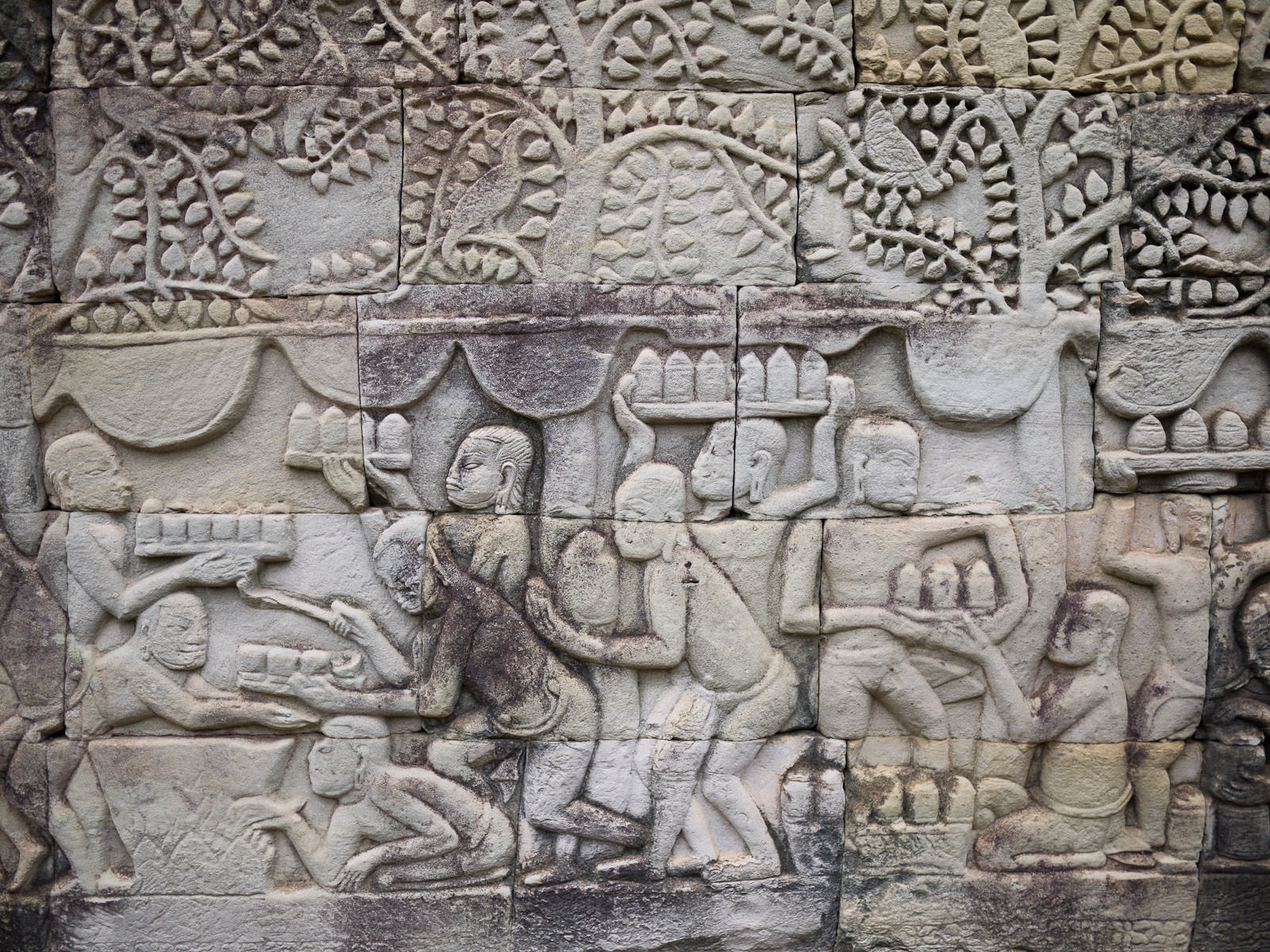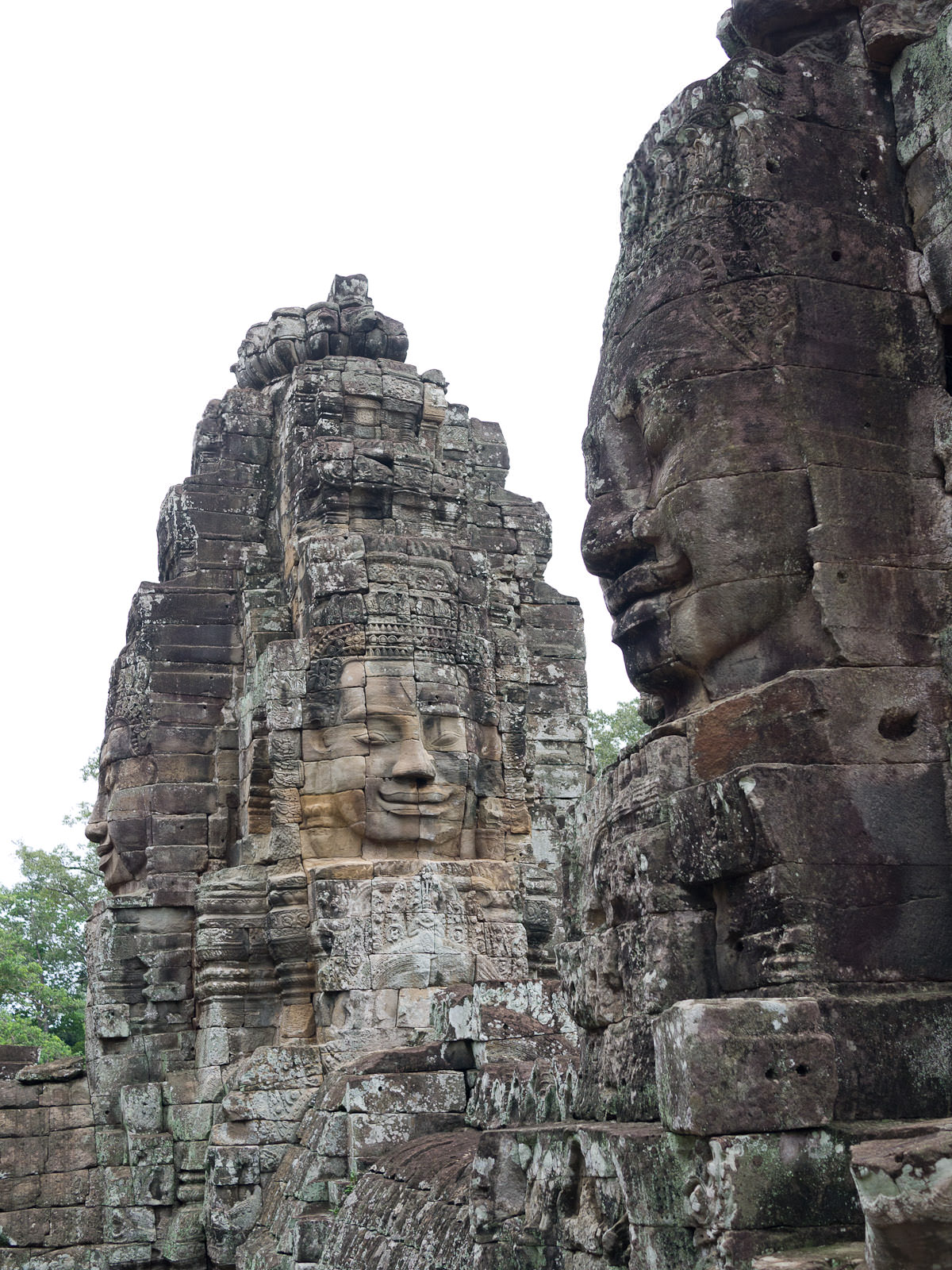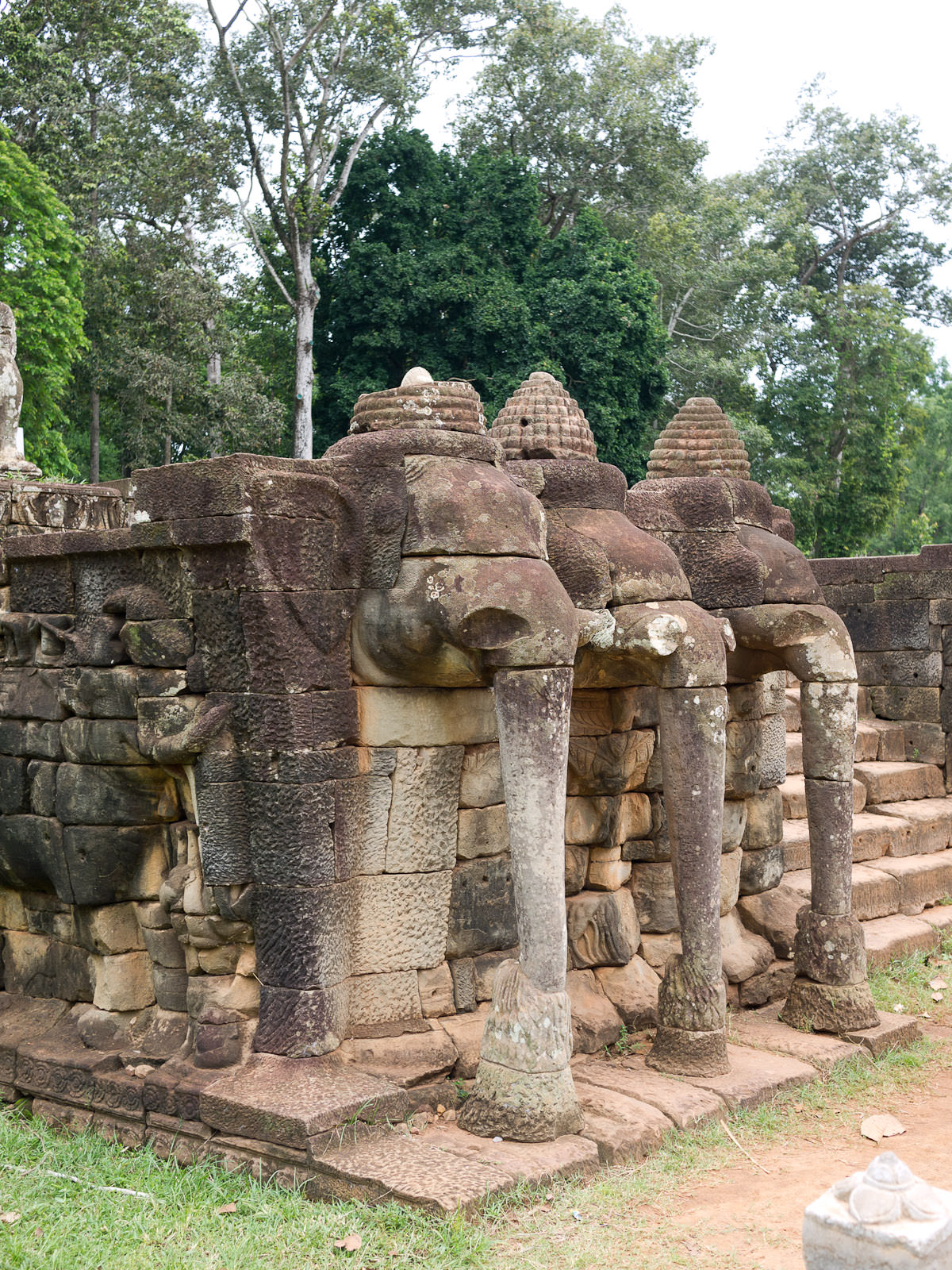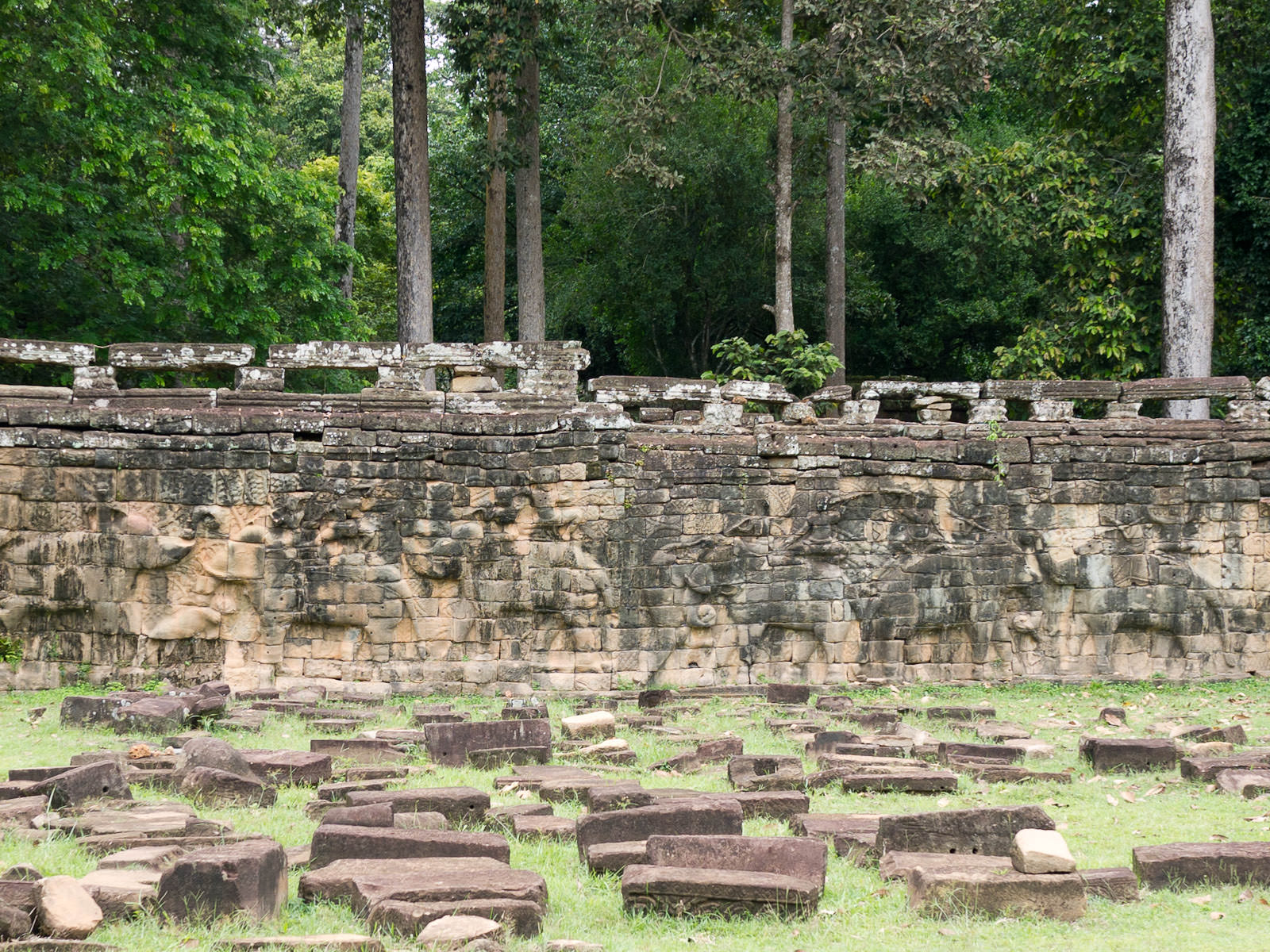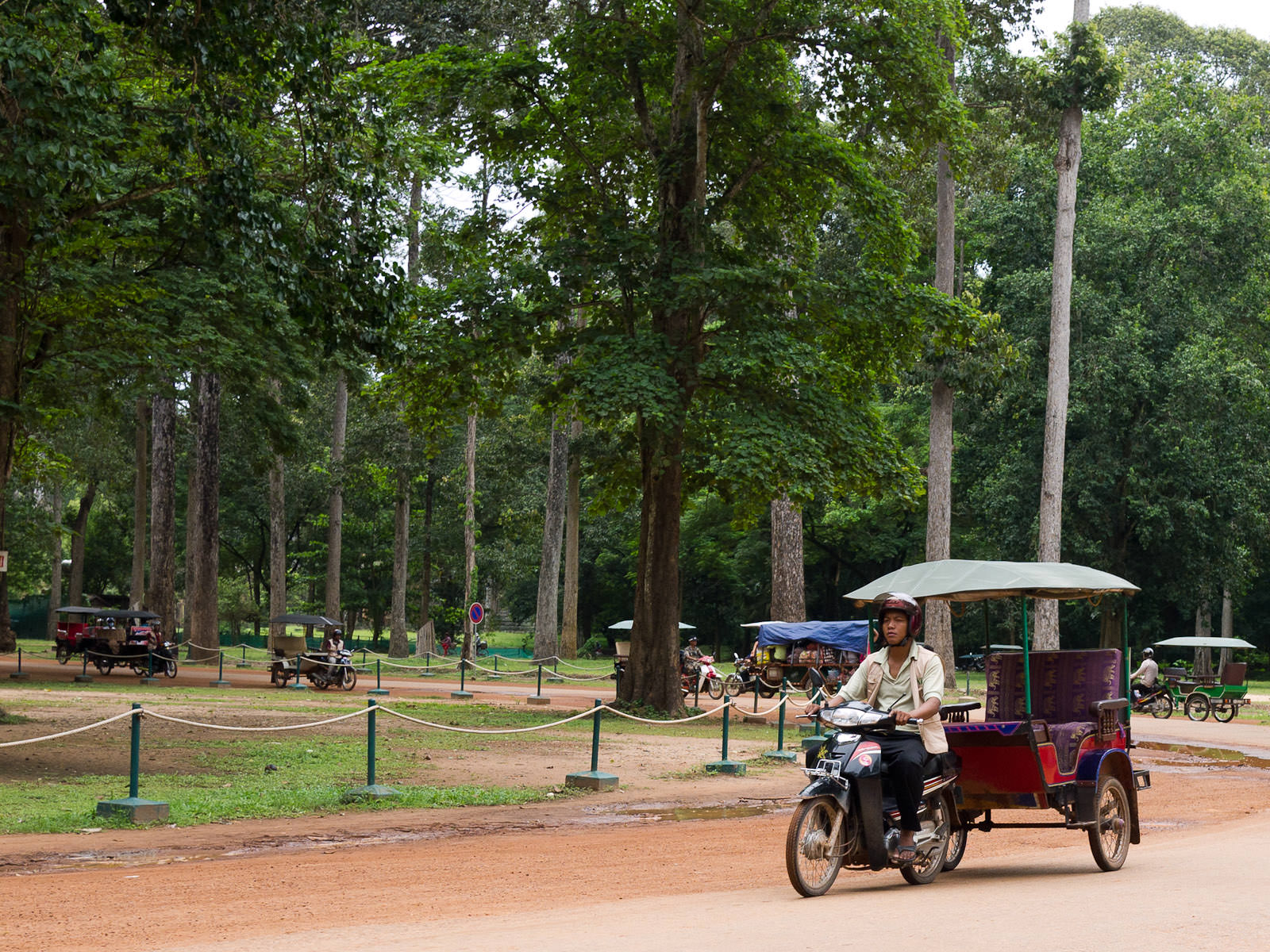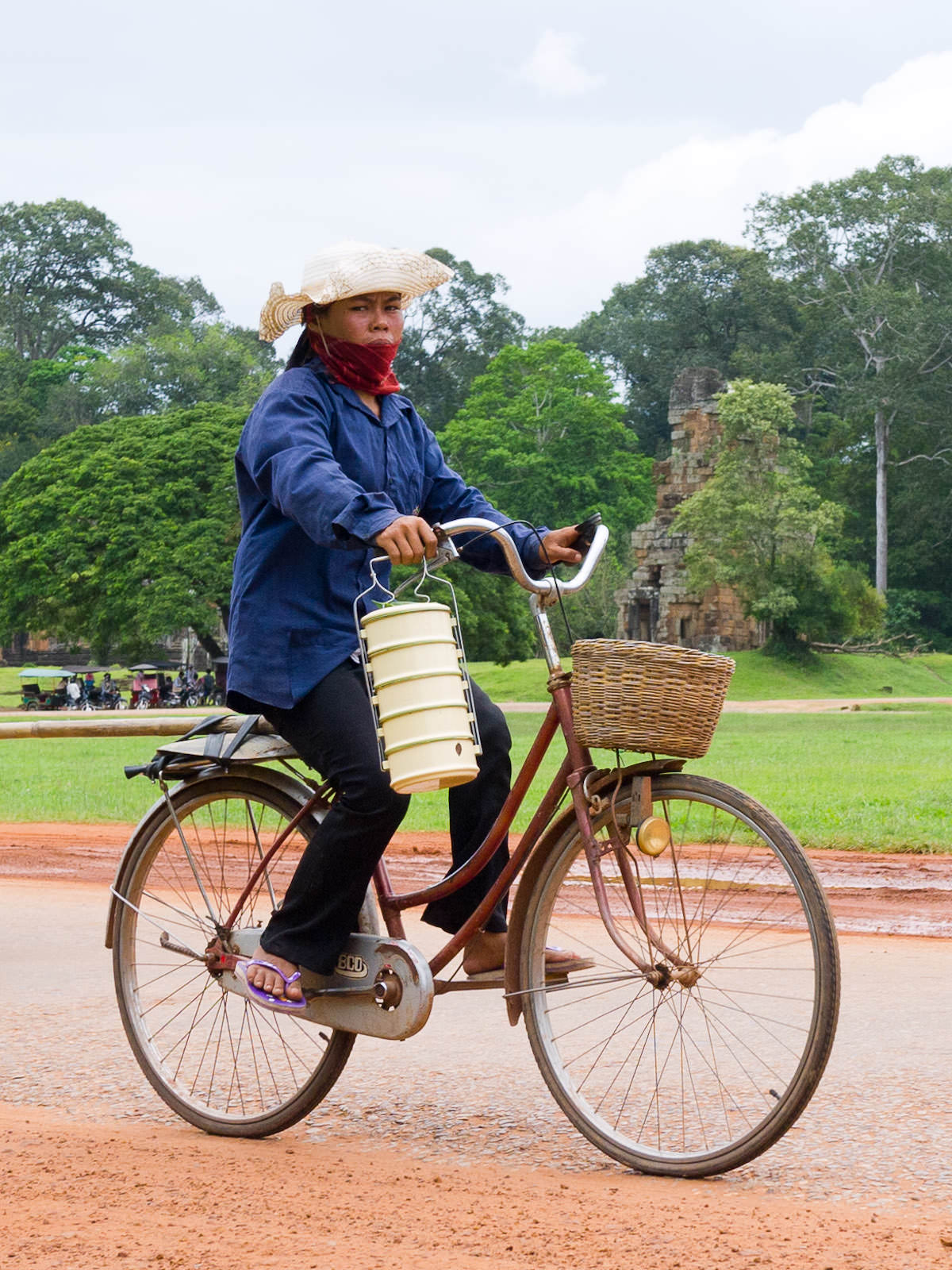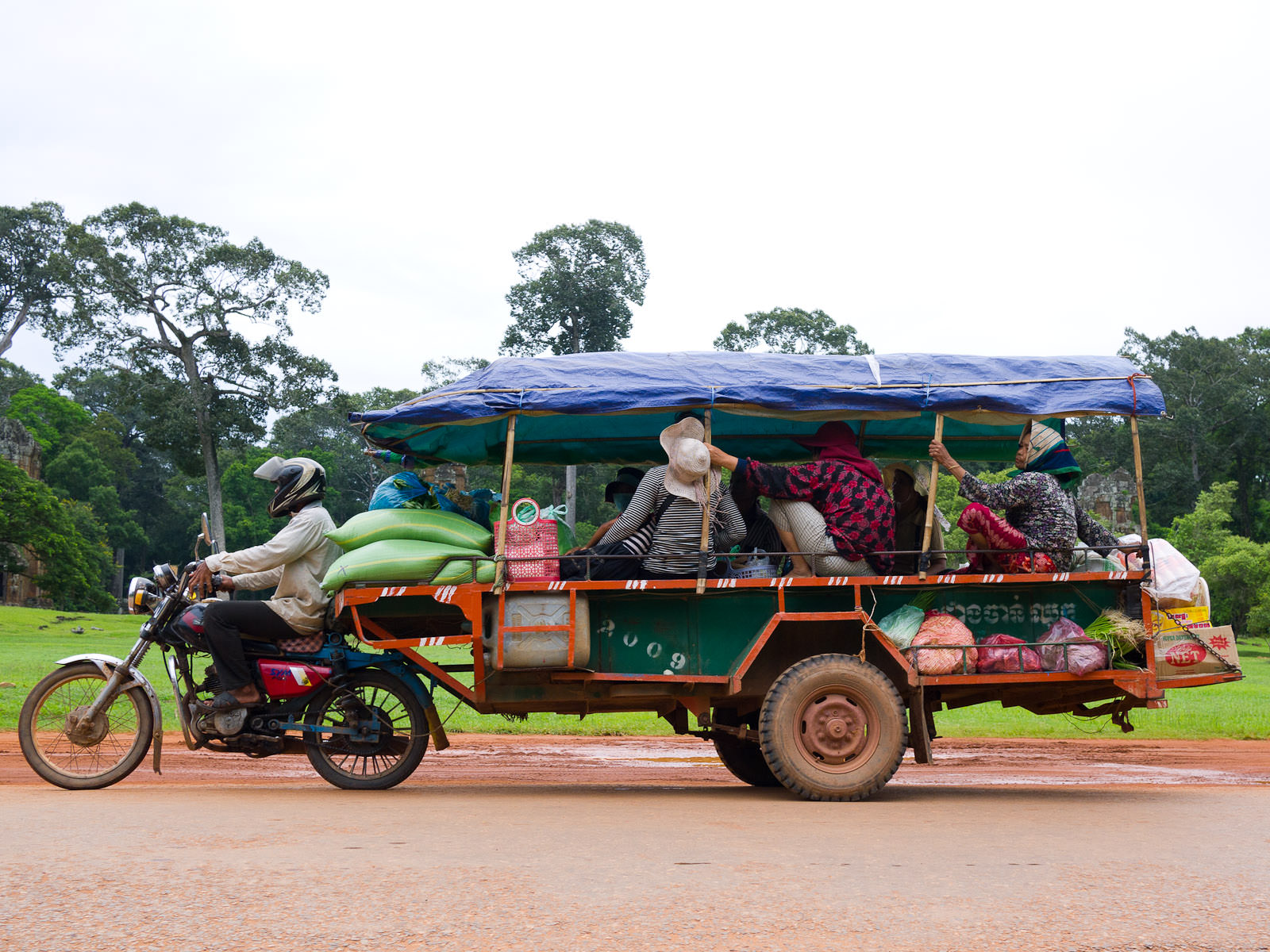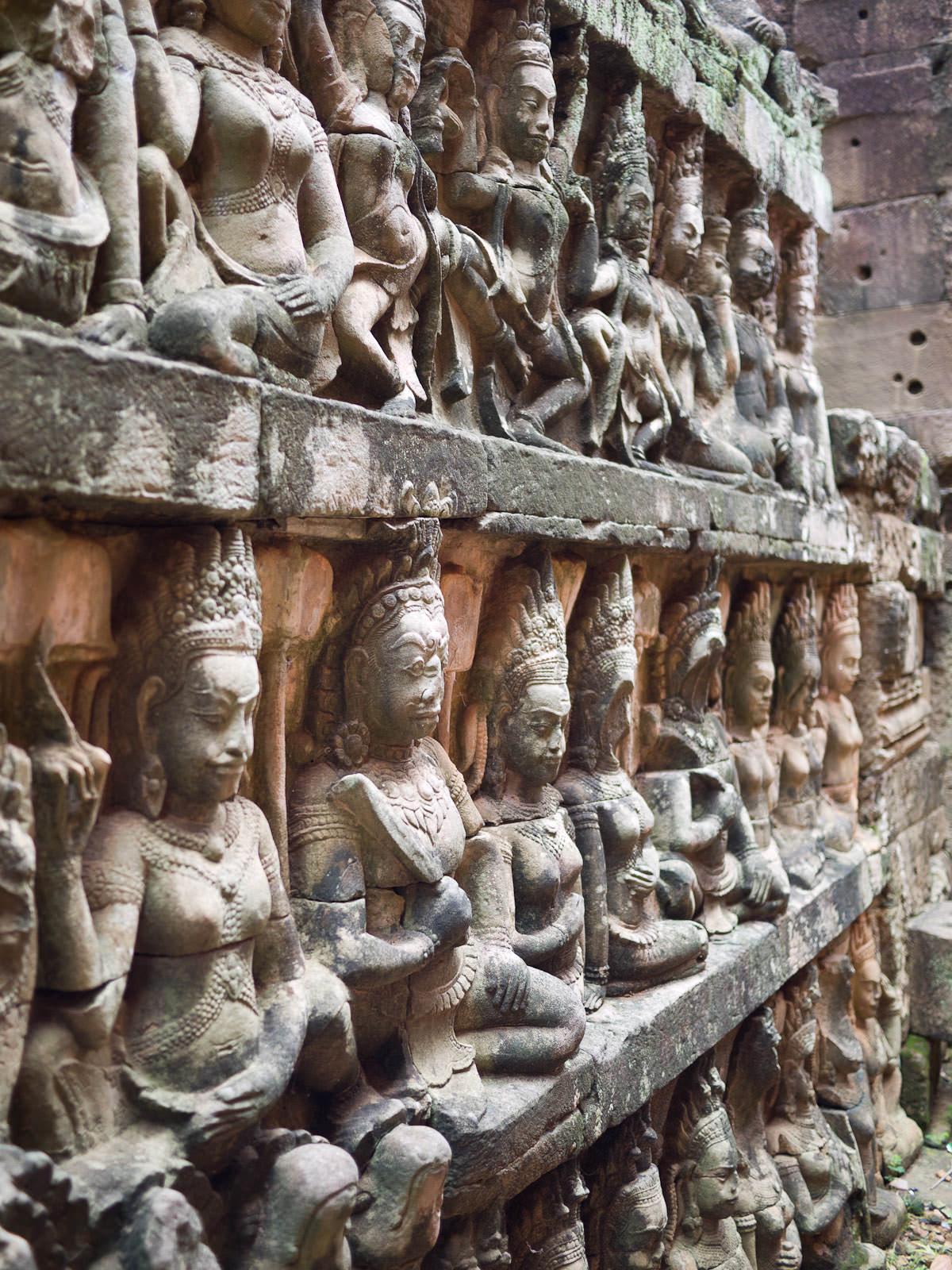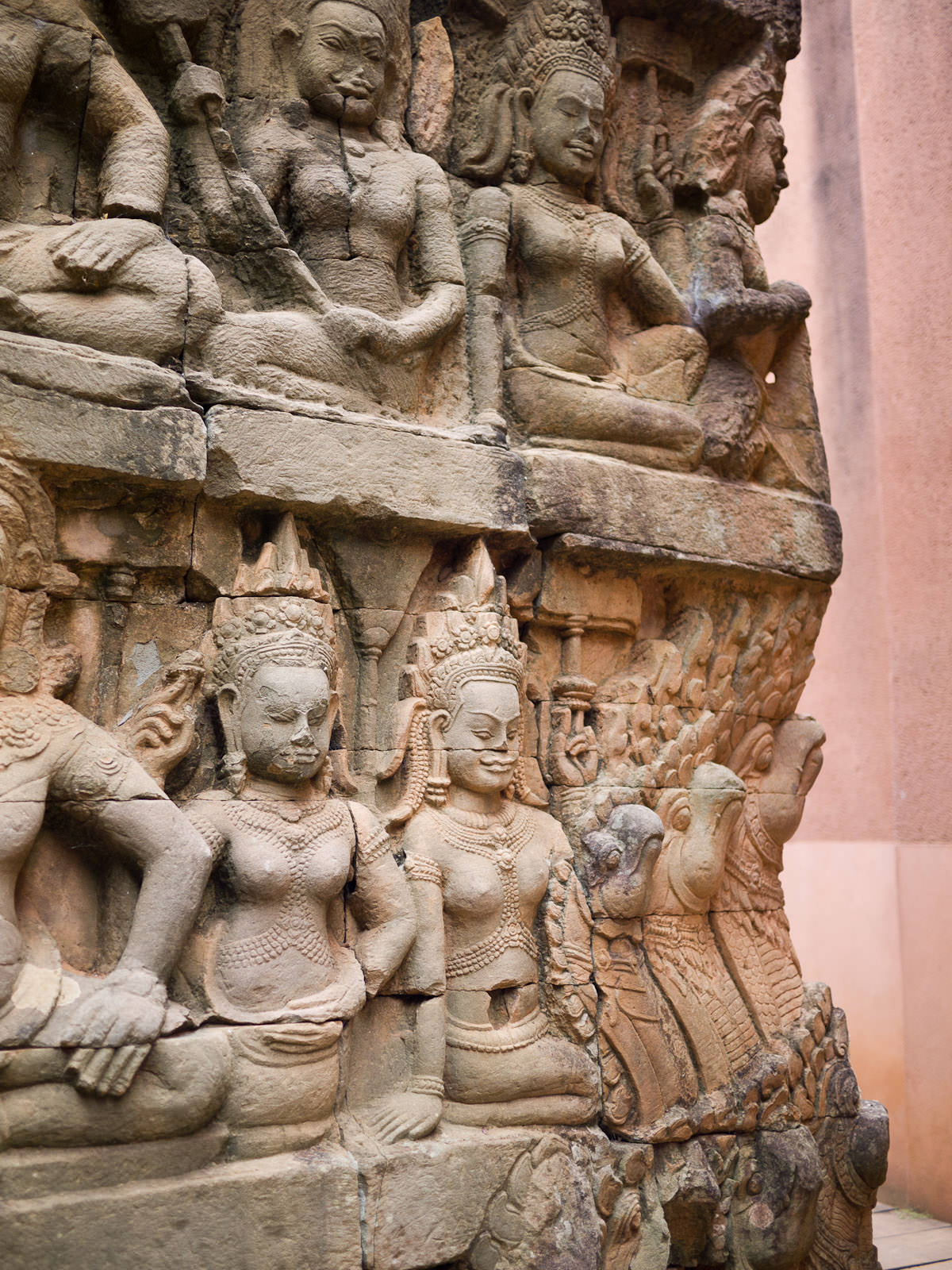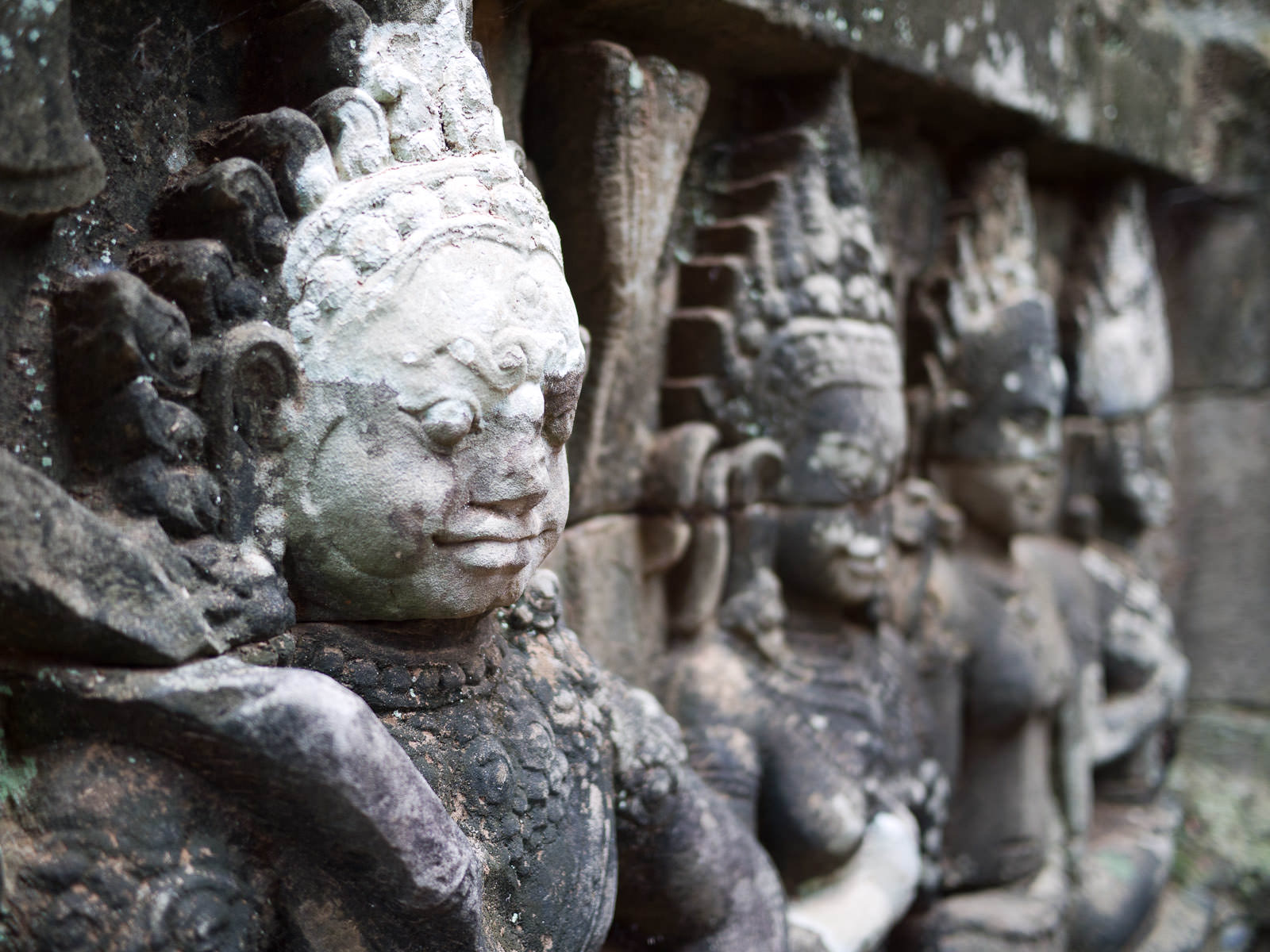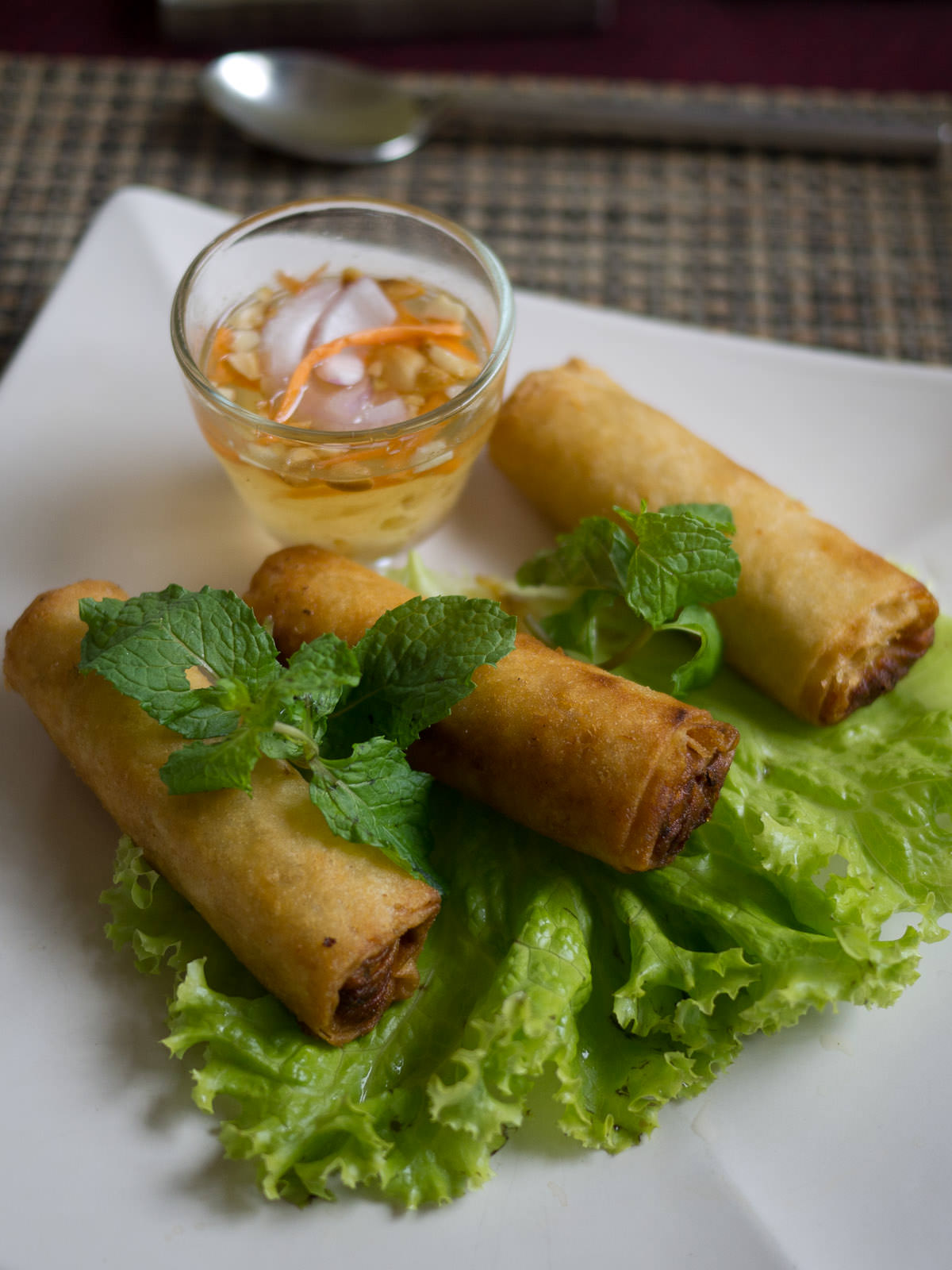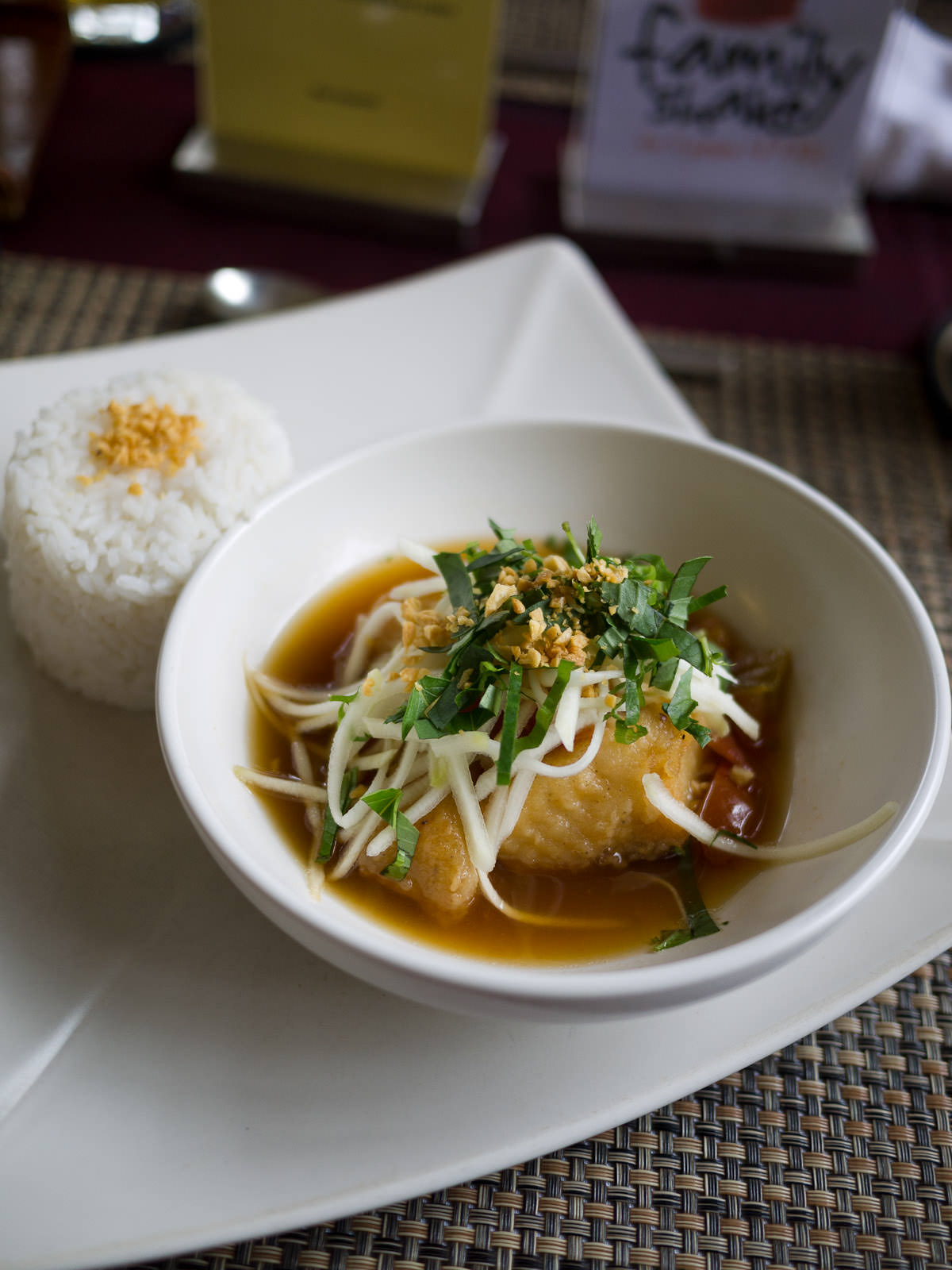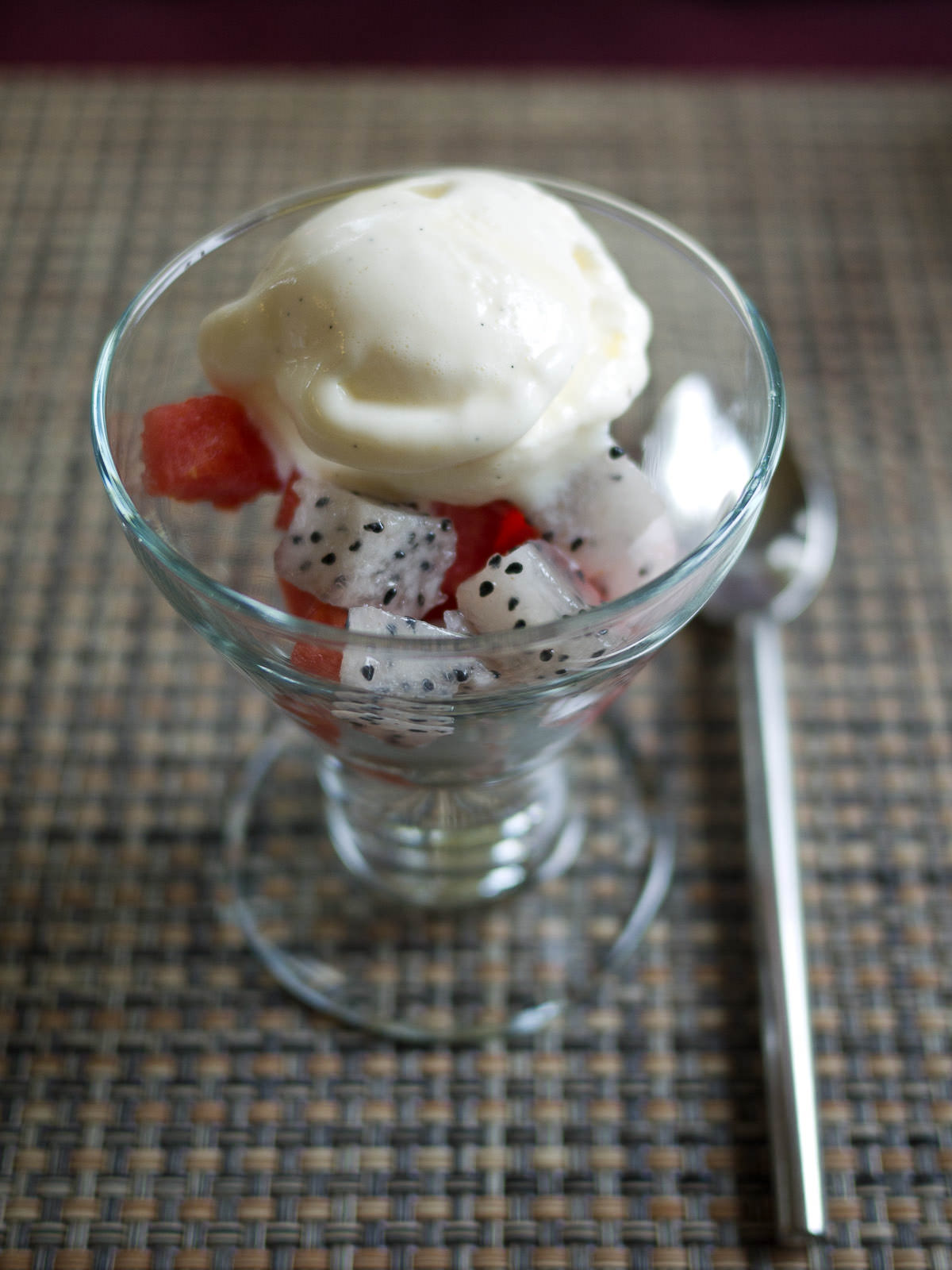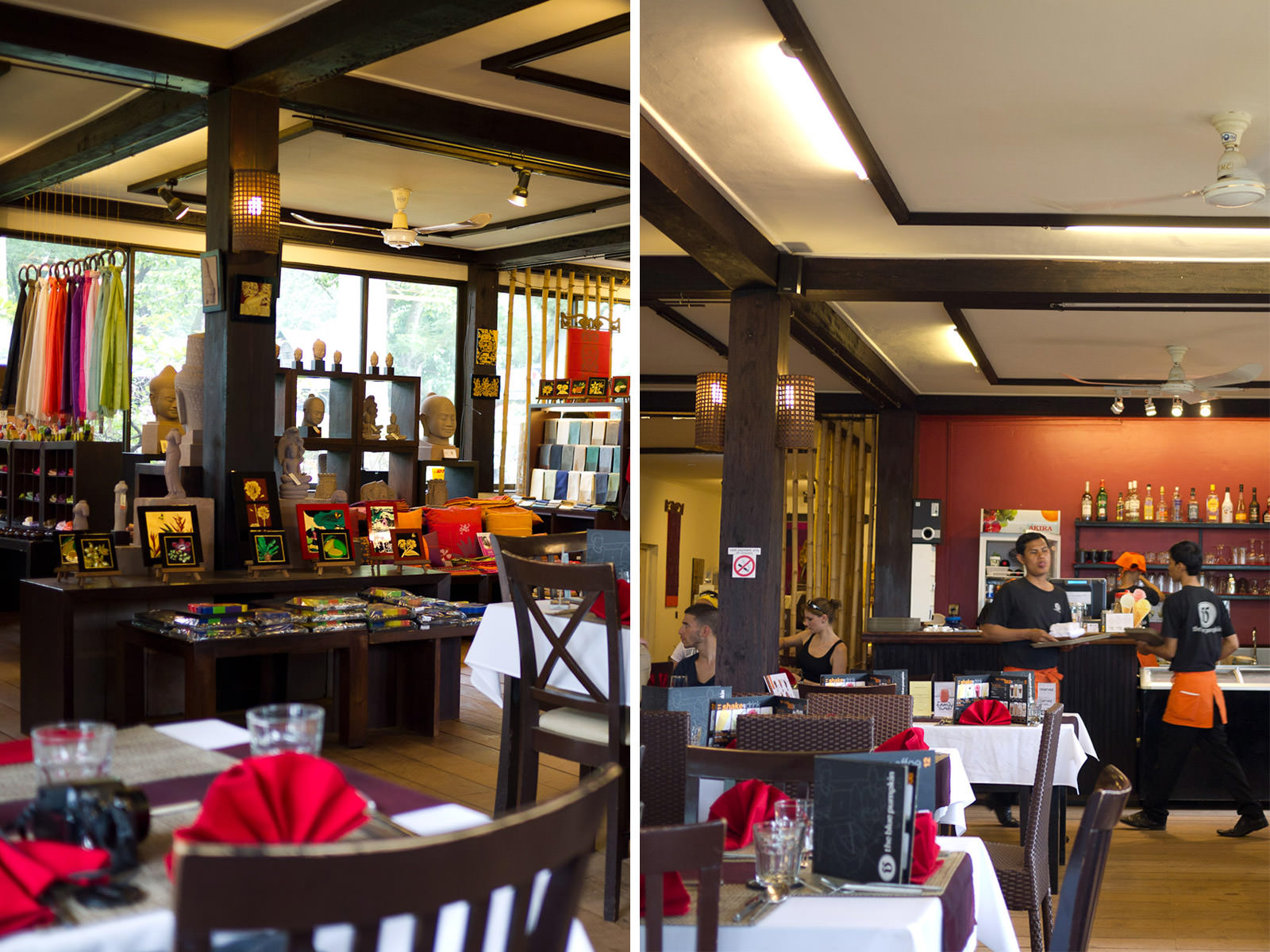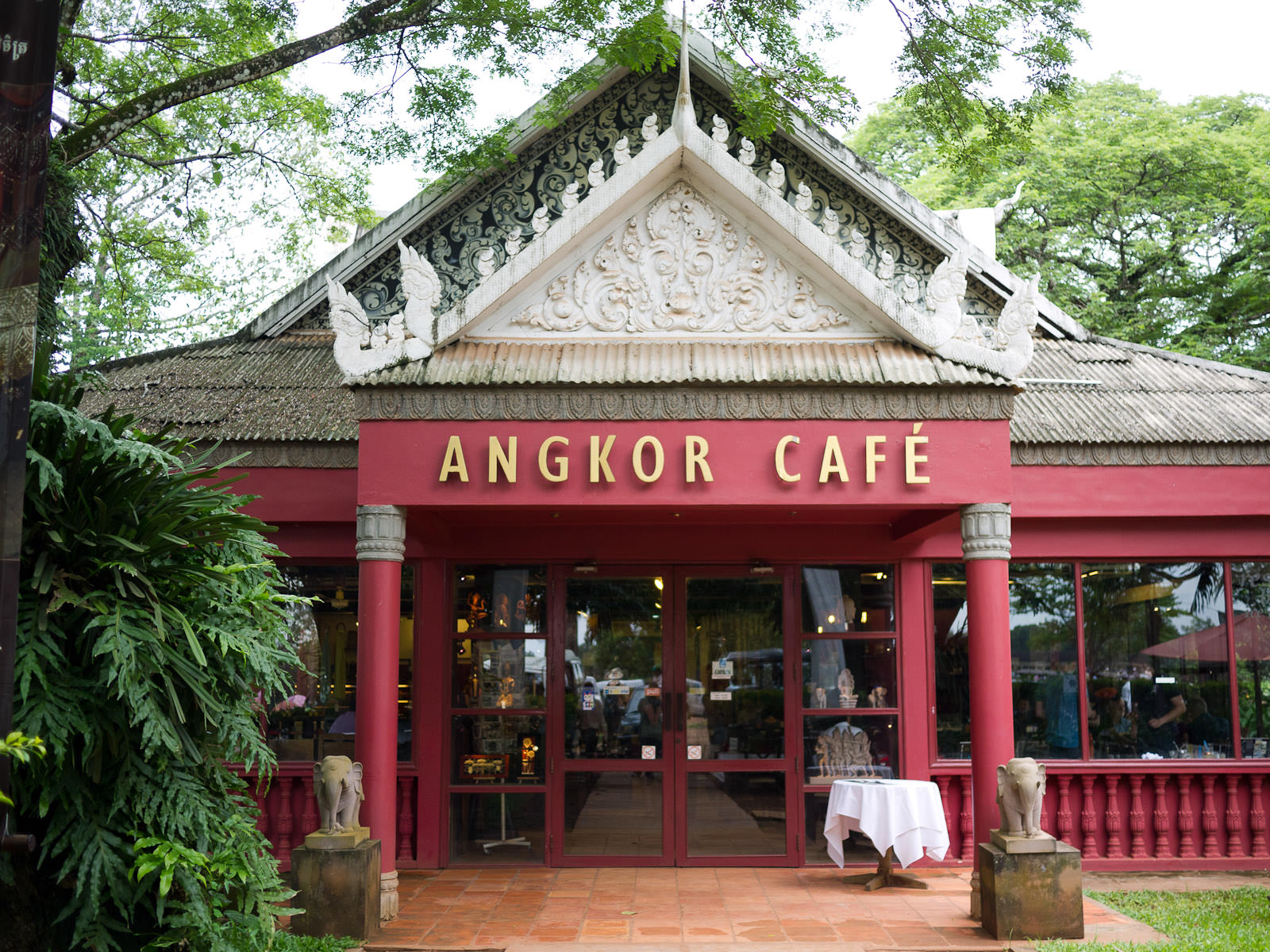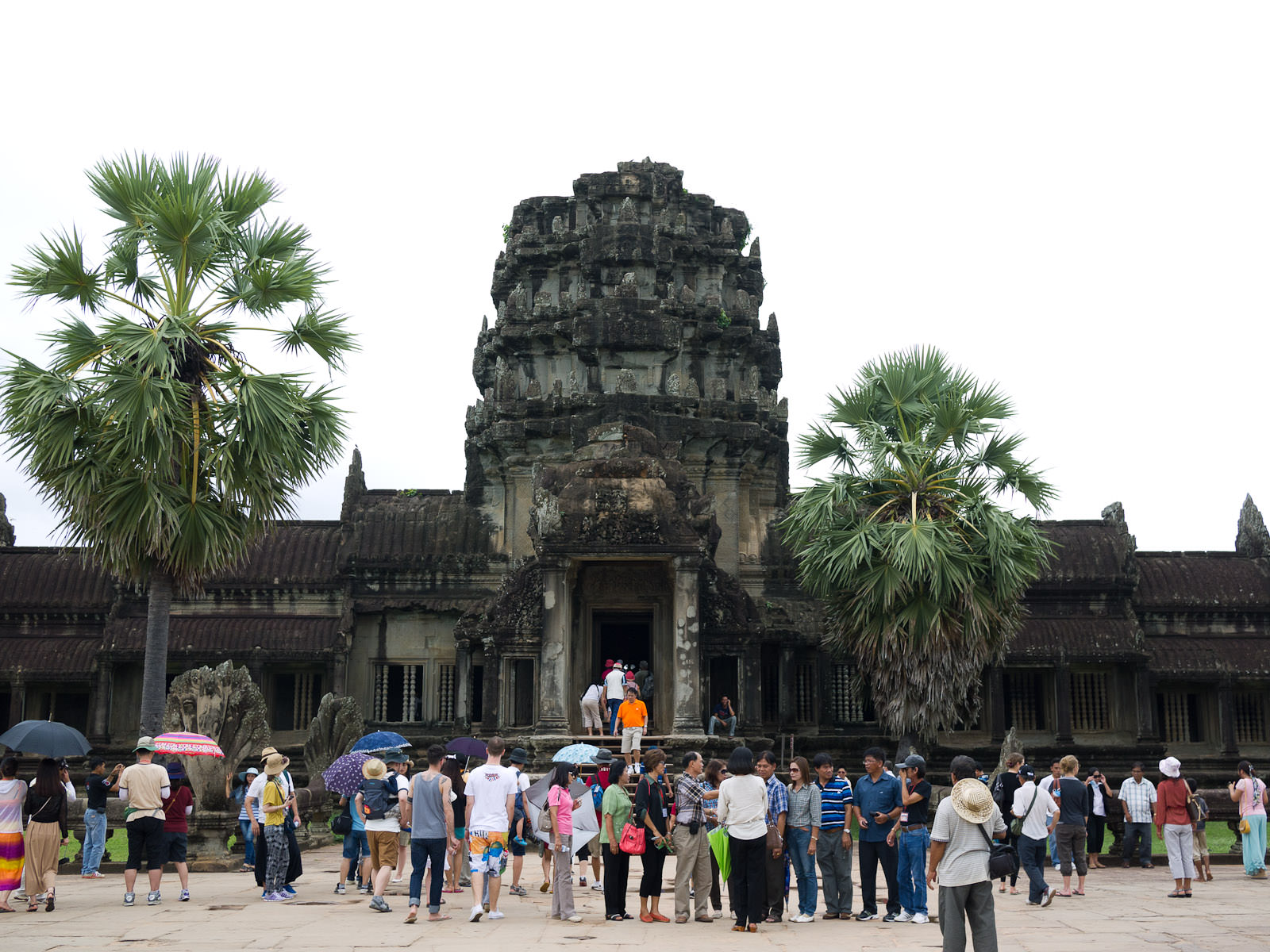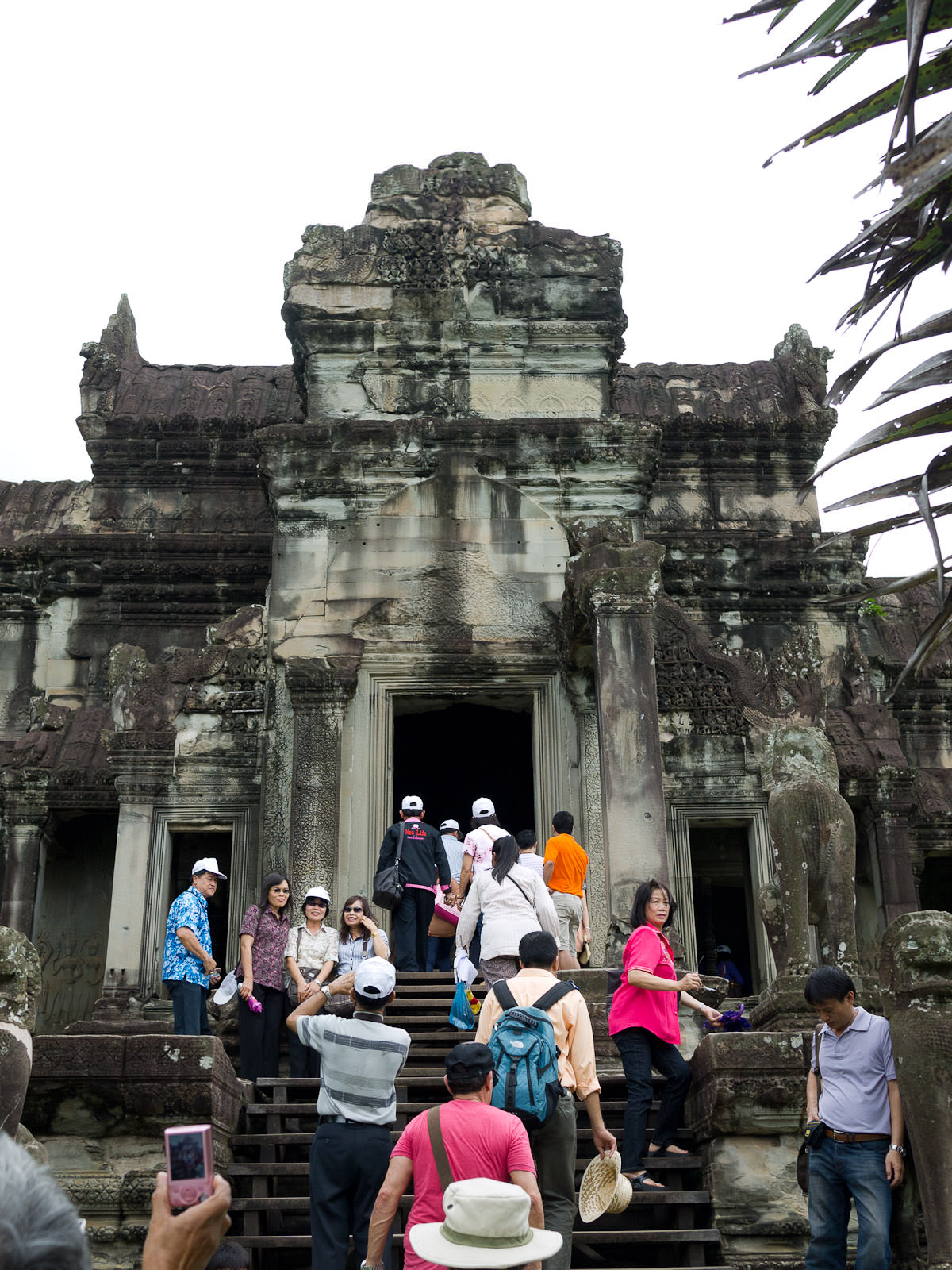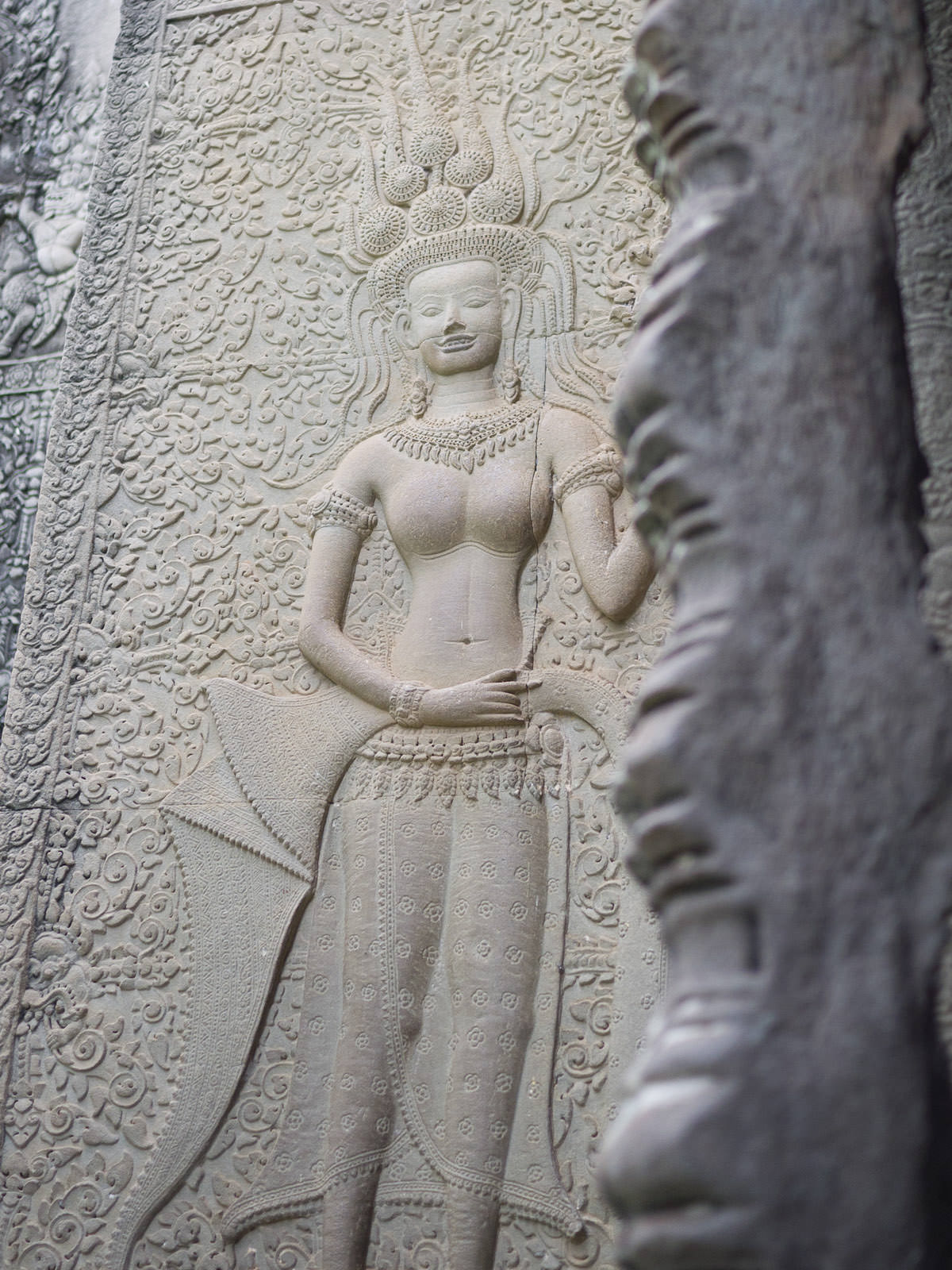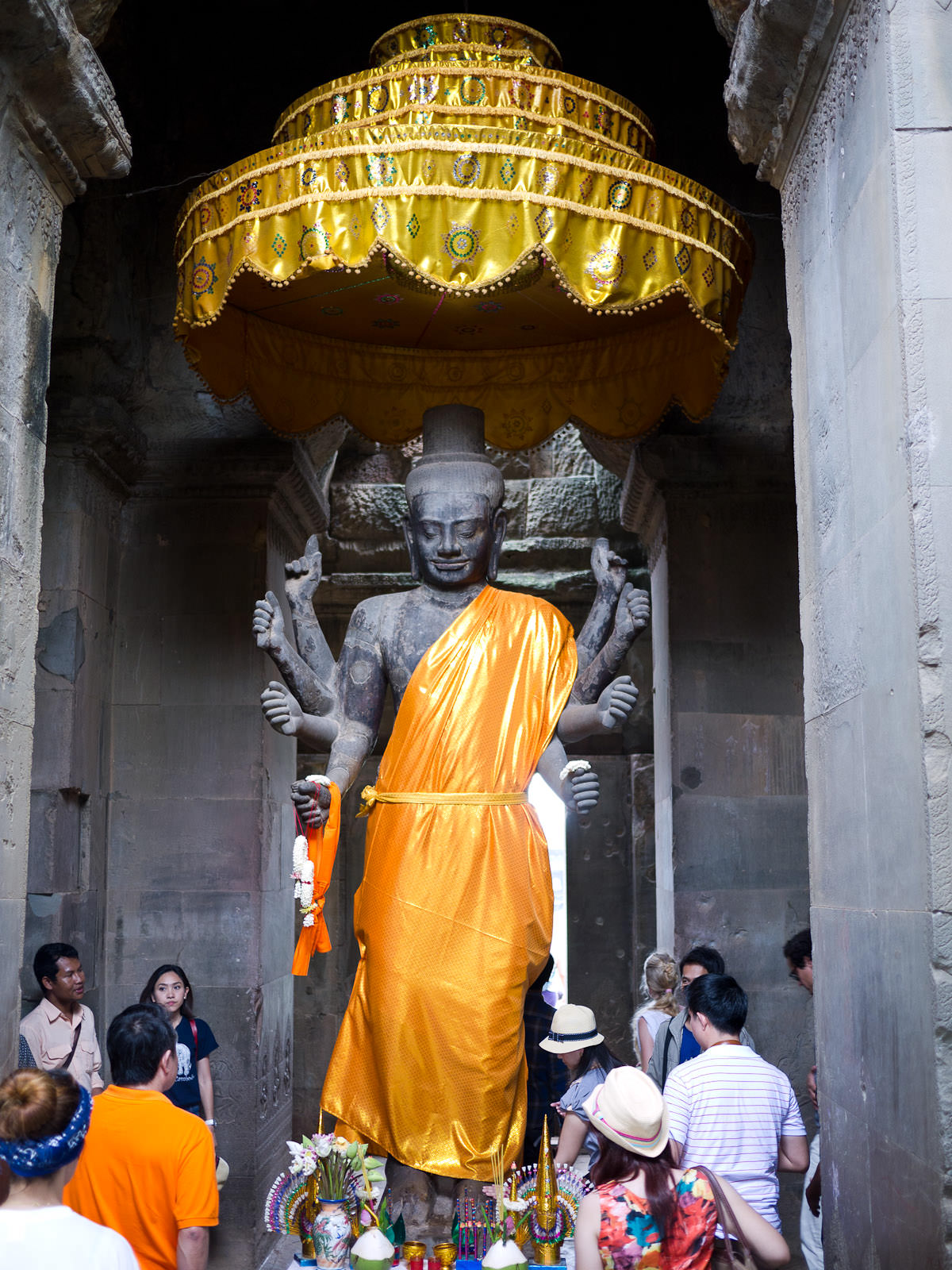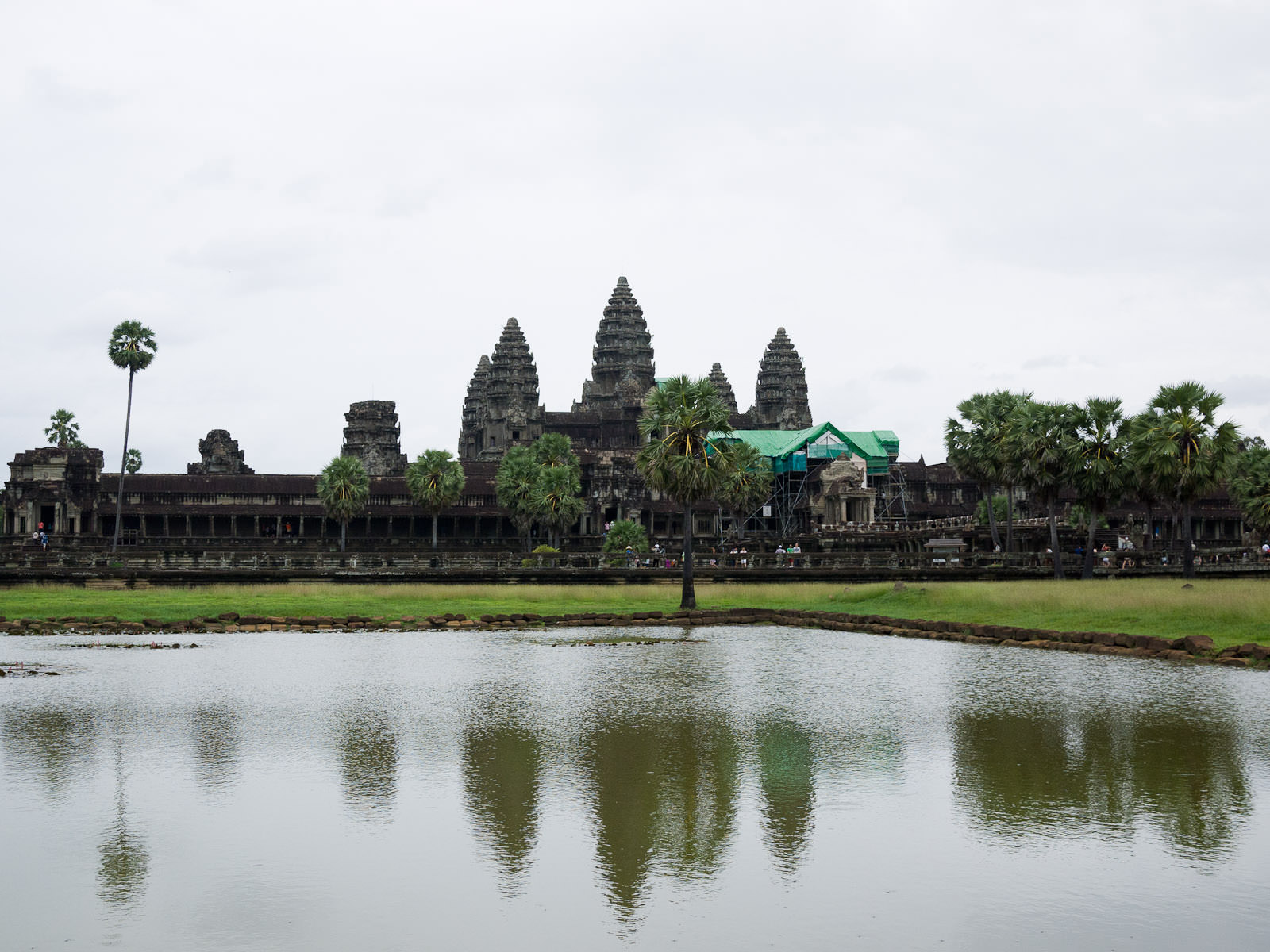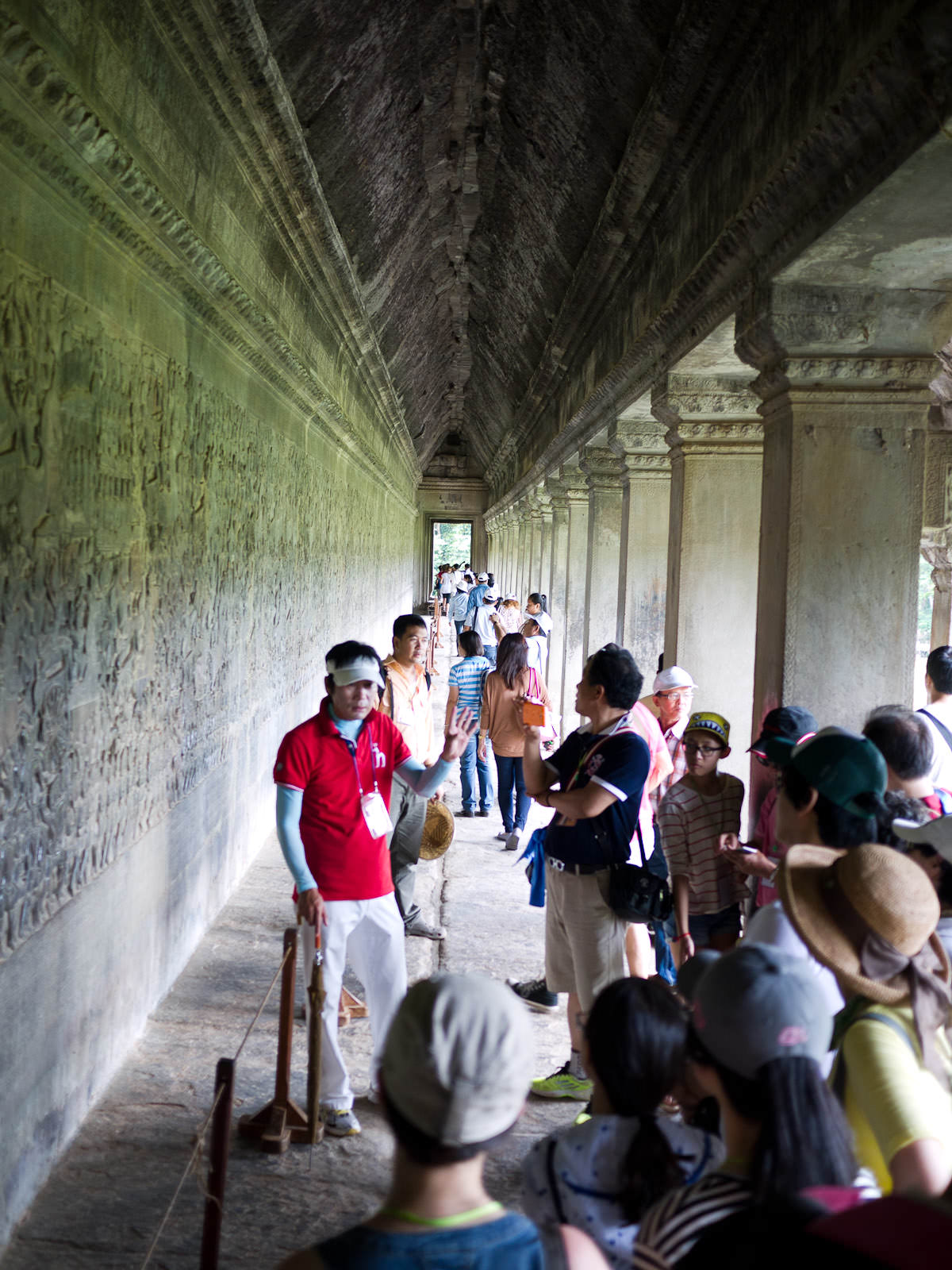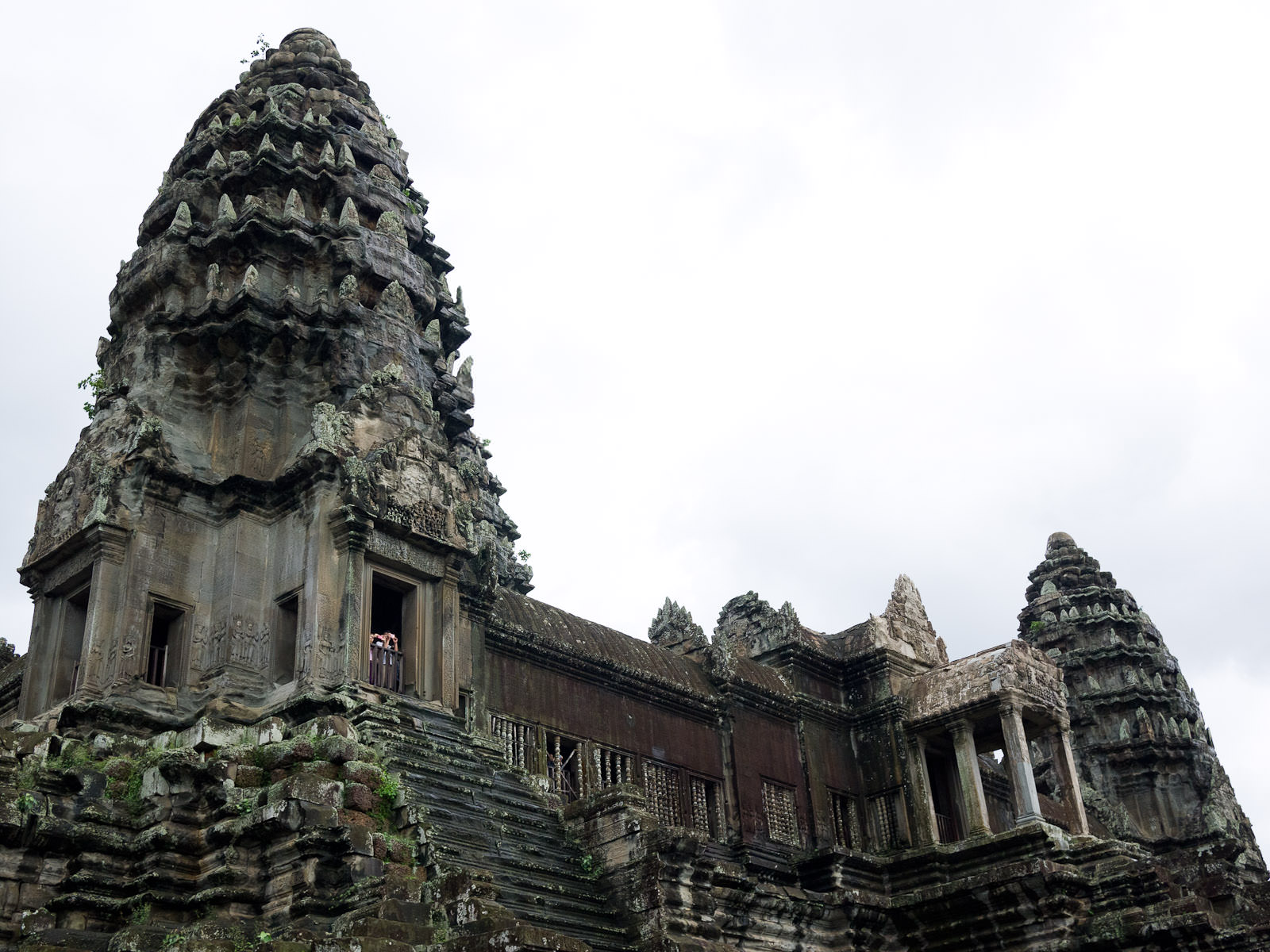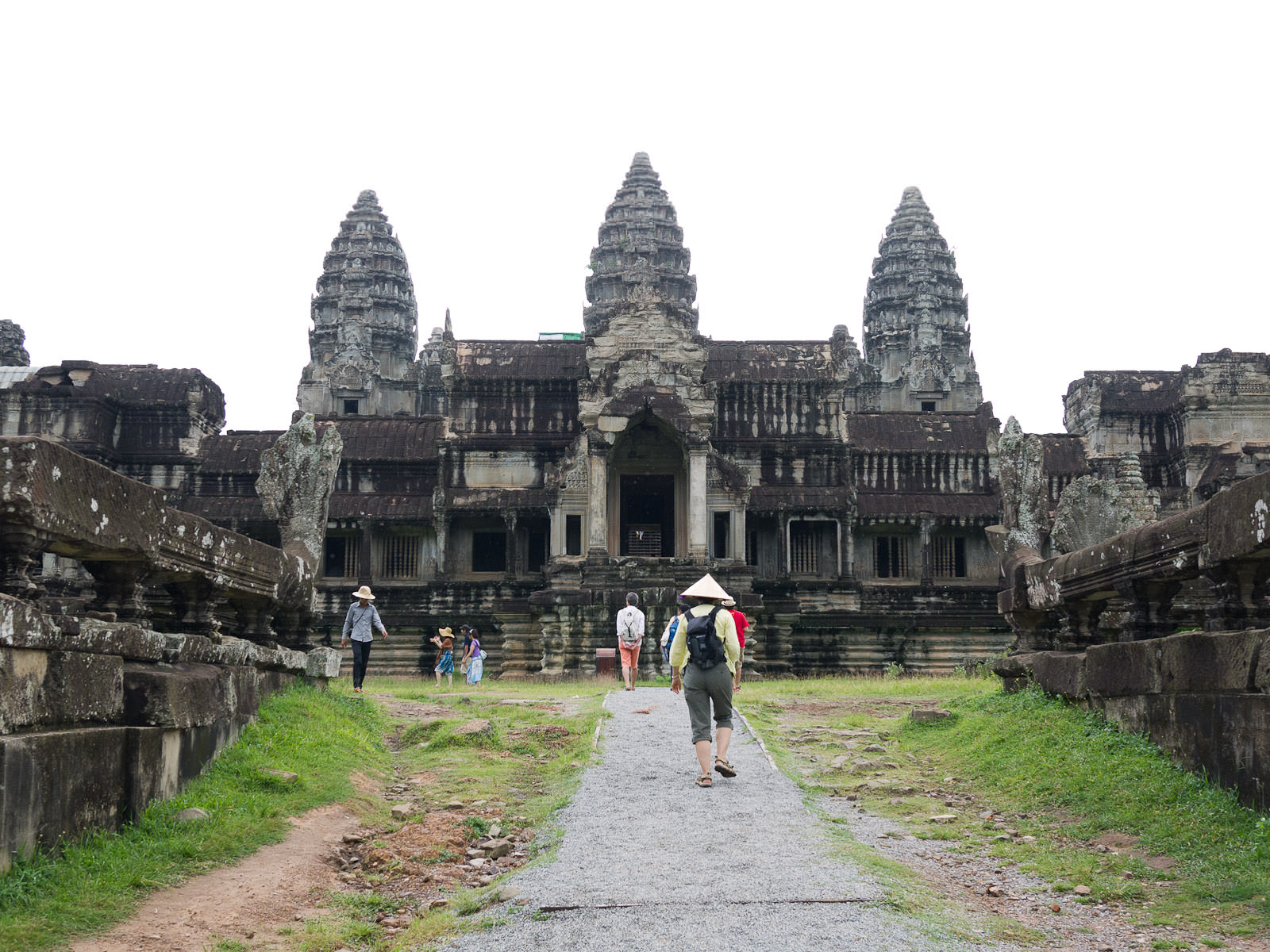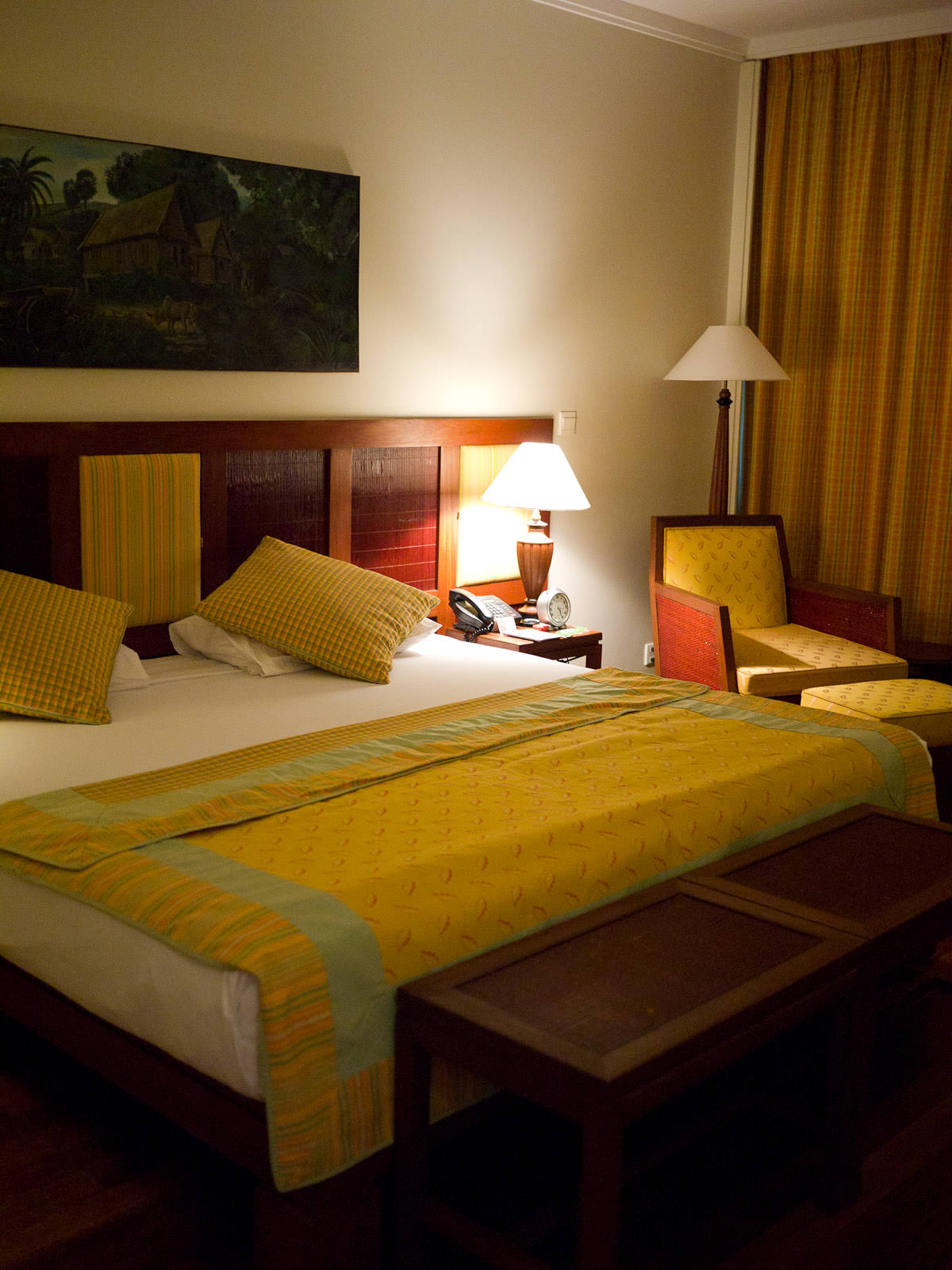Victoria Angkor Resort & Spa, Angkor Archaeological Park and Angkor Cafe, Siem Reap, Cambodia
After 10+ hours of travel including two flights, we arrive at Siem Reap International Airport just before 9pm where we are met by our guide, Sam. We all climb into our private bus to go to the Victoria Angkor Resort & Spa, where we’ll be staying for the next two nights.
This trip was hosted (what does this mean?) – I travelled to Cambodia and Vietnam and experienced the RV Mekong Pandaw cruise as a guest of Vietnam Airlines.
Victoria Angkor Resort & Spa
We’re still full from our business class feasting so decide to skip dinner and have a drink instead before retiring to our rooms. A staff member kindly escorts me through the dimly-lit corridors to my room where my suitcase is waiting. I’m exhausted and can’t wait to sink into the big bed in my air-conditioned room. At the end of the bed is a colour TV with international satellite channels.
The local tap water is not potable (not safe to drink), so we are advised to brush our teeth with/consume the supplied bottled water. Although I’m not hungry right now, I’m excited to see a fruit platter loaded with bananas, green oranges, dragonfruit, nashi (pear), mango, longans and rambutans. As I kick off the socks and shoes I’ve been wearing all day to slip into a pair of hotel slippers, I read a note telling me there’s free wifi in the room (Australian hotels, if a hotel in Cambodia can provide complimentary wifi, why can’t you?!) and another note suggesting I keep the balcony door closed at night to keep out mosquitoes and other creepy crawlies. That’s easy advice to follow, and during my short stay, I experience no issues with mozzies or other bugs in my room.
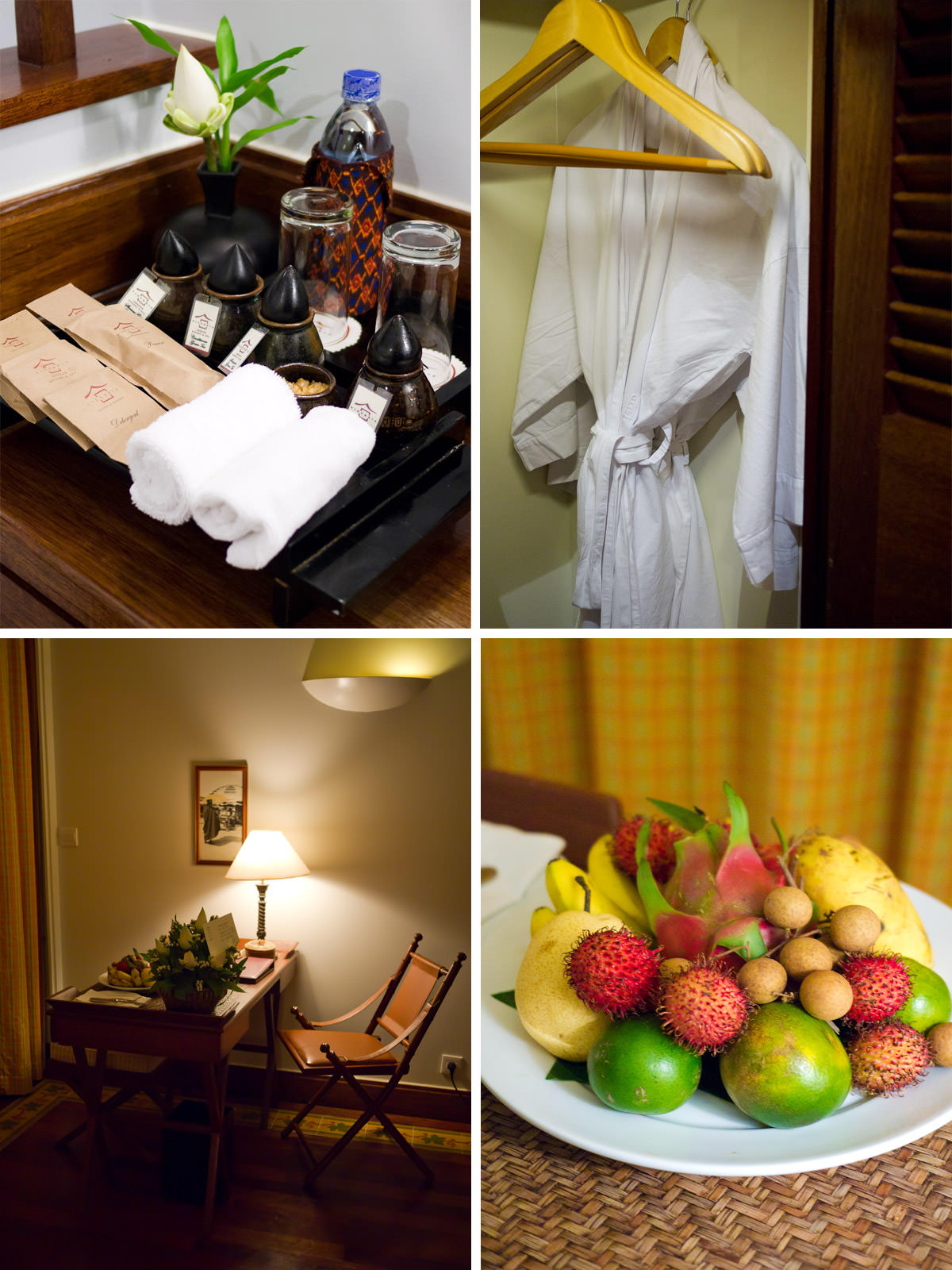
Clockwise, starting top left: bathroom amenities, bathrobe, complimentary fruit platter, desk and chair
We’ve all agreed to meet at 8am the next morning for breakfast but I get up early so I can walk around, explore on my own and take photographs. The humidity slaps itself to my skin as soon as I step out into the corridor, but the birds are singing, crickets are chirping and I’m absolutely stoked to be here. The resort is colonial style, elegant, open and airy.
In the courtyard on the ground floor you can watch fish and two Siamese crocodiles swimming in the water. The crocodiles are cordoned off in their own section of the pond, presumably to stop them escaping and wreaking havoc.
The elevator is old-fashioned and tiny – last night, with two of us at a time, it was a squeezy giggly ride. Sure, we could’ve taken the stairs, but as intrepid travel writers, journalists and blogger, we all wanted the full Victoria Angkor experience! The bellboys took care of our luggage, delivering our bags to our rooms.
The bright blue saltwater pool is enormous, surrounded by decking, leafy gardens, banana lounges and shady umbrellas. I almost wish we didn’t have such a full schedule.
I’m keen to have a quick look outside.
The Victoria Angkor has three vintage Citroën limousines available for hire for joy rides, day trips or even just as stylish transportation to the airport. When not in use, they are parked at the front, adding to the colonial atmosphere.
There’s a guard standing across the road, and when he sees me approaching, camera in hand, he provides a silent escort as I cross the street. There’s a little traffic in front of the hotel, mostly tuk-tuks, street food sellers and the odd motorbike, but this is nothing compared to the wall of traffic I will face in Ho Chi Minh City in Vietnam later on the trip.
Opposite the Victoria Angkor is the Royal Park, with neat manicured lawns and topiary.
Seeing the street food vendors pushing their carts along reminds me I haven’t had breakfast.
Breakfast is now in full swing. I join my travel companions at a poolside table and a staff member immediately appears by my side, offering coffee.
The photographs of the buffet in this post only capture some of what is available – as far as buffets go, it’s one of the best ones I’ve experienced. There’s a noodle station and egg station, pancakes today and tomorrow, waffles. I naturally gravitate towards the hot food and put together a plate of garlicky succulent fried chicken, steamed rice, bacon, sausage, hash brown with a chewy bread roll studded with salt crystals. In addition to a strong cup of coffee, I grab a glass of Sunrise Tonic – a fresh juice blend of carrot, winter melon, tomato, celery and lime juice.

Round one: rice with fried chicken and a few more breakfasty things, including freshly squeezed fruit juice
For round two, fresh fruit salad with grapes, strawberry, melon and dragon fruit; rambutans, papaya and banana. There are cakes, danishes, muffins, and bread and butter pudding available, but I choose a single golden-brown doughnut, encrusted with white sugar.
The day is getting warmer and stickier as we finish breakfast. It’s time to slap on sunscreen, get back on the bus and start the day’s big adventure.
Victoria Angkor Resort & Spa
Central Park, Siem Reap Town
Kingdom of Cambodia
Telephone: +855 63 760 428
129 guest rooms with private balconies
Other features include:
- Free wifi throughout the hotel
- Restaurants/bars at the Victoria Angkor: Le Bistrot de Siem Reap (contemporary French cuisine), L’Escale Restaurant (Cambodian and international menu, indoor or al fresco seating by the pool), Bar L’Explorateur (alcoholic drinks, coffee and board games!)
- Saltwater pool, outdoor jacuzzi and children’s wading pool
- Aromatherapy and beauty treatments and massage at Victoria Spa
- Mountain bike hire
- Angkor Golf Resort is 10 minutes away
- Foreign currency exchange, laundry and sightseeing tour services
Angkor Archaeological Park
The Victoria Angkor Resort & Spa is a just short drive to Angkor Archaeological Park, a must-visit destination if you visit Cambodia. It is home to the ancient temple ruins of the Khmer empire of the Angkorian era. The property stretches across more than 400 square kilometres and features dozens of temples, most constructed between the 9th and 12th centuries AD. Although it is possible to travel between temples on foot, exploring them can be physically demanding, especially when combined with the heat and humidity, so most visitors hire some form of transport, be it bicycle, tuk-tuk, car or bus (when in a group).
Before you can enter any of the temples, you must buy a pass, for which your photograph is taken – the passes are not transferable. There are three kinds of passes: US$20 (single day); US$40 (3 consecutive days); or US$60 (week). We bought single day passes; if I had more time, I would certainly consider buying a 3-day pass so I could have more time to visit some of the lesser known temples as well as the more famous ones, and include at least one sunrise visit. The entrance fees are for tourists only; Cambodians are not charged for entry.
The park opens at 5am and visiting hours are 5.30am to 5.30pm daily. The passes are not refundable and will not be replaced if lost or damaged (you will have to buy a new one). They are valid for any temples in the park except Kulen Mountain and Bengmealea, which have separate entrance fees. Children under 12 do not need a pass but may gain entry by showing their passport. At every temple we visited, our passes were checked at entry, so make sure you keep it with you during your visit.
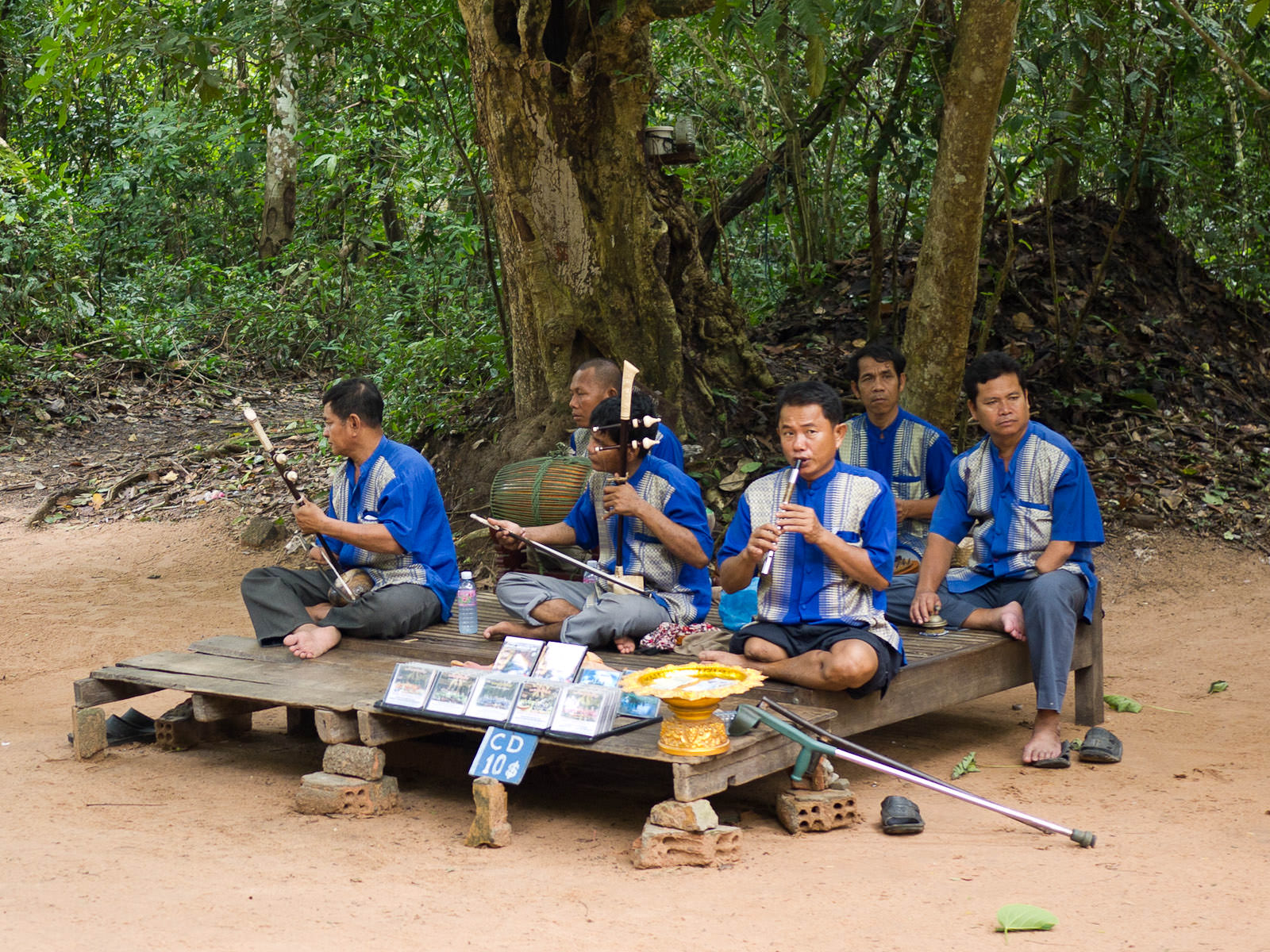
Amputees busking in the Angor Archaeological Park grounds. Landmines have resulted in many Cambodians with missing limbs and we saw many amputees throughout our visit.
It’s difficult to get photographs of the temples without tourists in them. There are people everywhere, constantly unintentionally photobombing my shots. It gets pretty frustrating at times. I’d hate to think what it is like during peak season. Although there are fewer visitors at the temples early in the morning, the sunrise visits are getting more popular as tourists seek to avoid crowds and the serious photographers pursue the best shots.
In my efforts to take photographs with minimal people in them, I find myself lagging behind the rest of our group. Our guide Sam turns back to find me and says: “If you get lost, just keep walking to the west.” That advice proves to be essential.
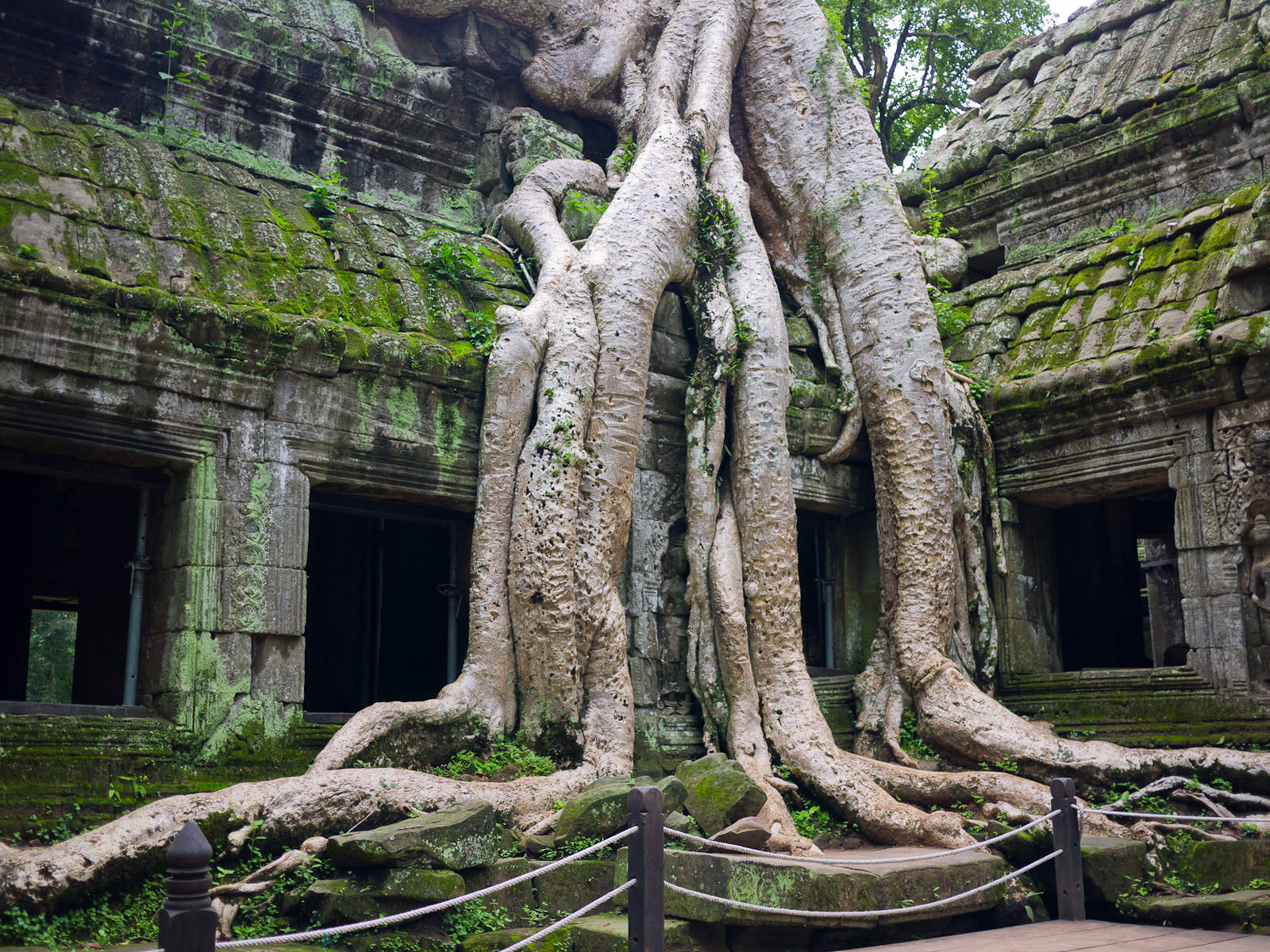
The most distinct feature of Ta Prohm are the trees growing out of the temple ruins. Ta Prohm was featured in the Tomb Raider movie.
If you visit Angkor Archaeological Park with a guide/group or even a single companion, make sure you know which direction/exit you should end up at in case you get separated. The larger temple ruins are deceptively vast and it’s too easy to get lost among the sea of tourists.
I have no idea which way is “west” (I was terrible when we did orienteering in high school!) but luckily I remember my my iPhone’s compass feature. It’s not quite so simple as I’m unable to walk westward in a straight line – I have to walk through doorways and chambers and fight my way through the crowd while trying to stay west, mostly hovering north-west. I’m feeling a little worried about wandering the temples on my own and start to panic just a little, but there are so many amazing sights to photograph and I can’t resist taking pictures even as I try to head west.
Are the guys wondering where I am? Is anyone looking for me? Will they go onto the next temple without me?
After what feels like an eternity, I find myself at an exit which my compass tells me is north-west. I am surrounded by people – tourists and locals, kids selling trinkets, souvenirs and cold drinks, bus drivers and tuk-tuk drivers. Plenty of friendly faces, but none familiar.
Another bit of advice when visiting temples: ask your guide roughly how long your group is expected to spend at the temple so you have a sense of just how “lost” you really are.
Imagine my relief when I spot Sam and a couple of the other guys. Somehow, in my panic about being lost, and fearing I would be left behind, I’ve managed to weave my way out faster than the rest of the group. And as it turns out, I’m the not only one who got “lost”! When we spot the last member of our group coming out of the exit, I can see the expression of pure relief on his face. As we get back on the bus, we all fervently vow to keep each other in sight and not get lost at the next temple. Such good intentions, such famous last words…
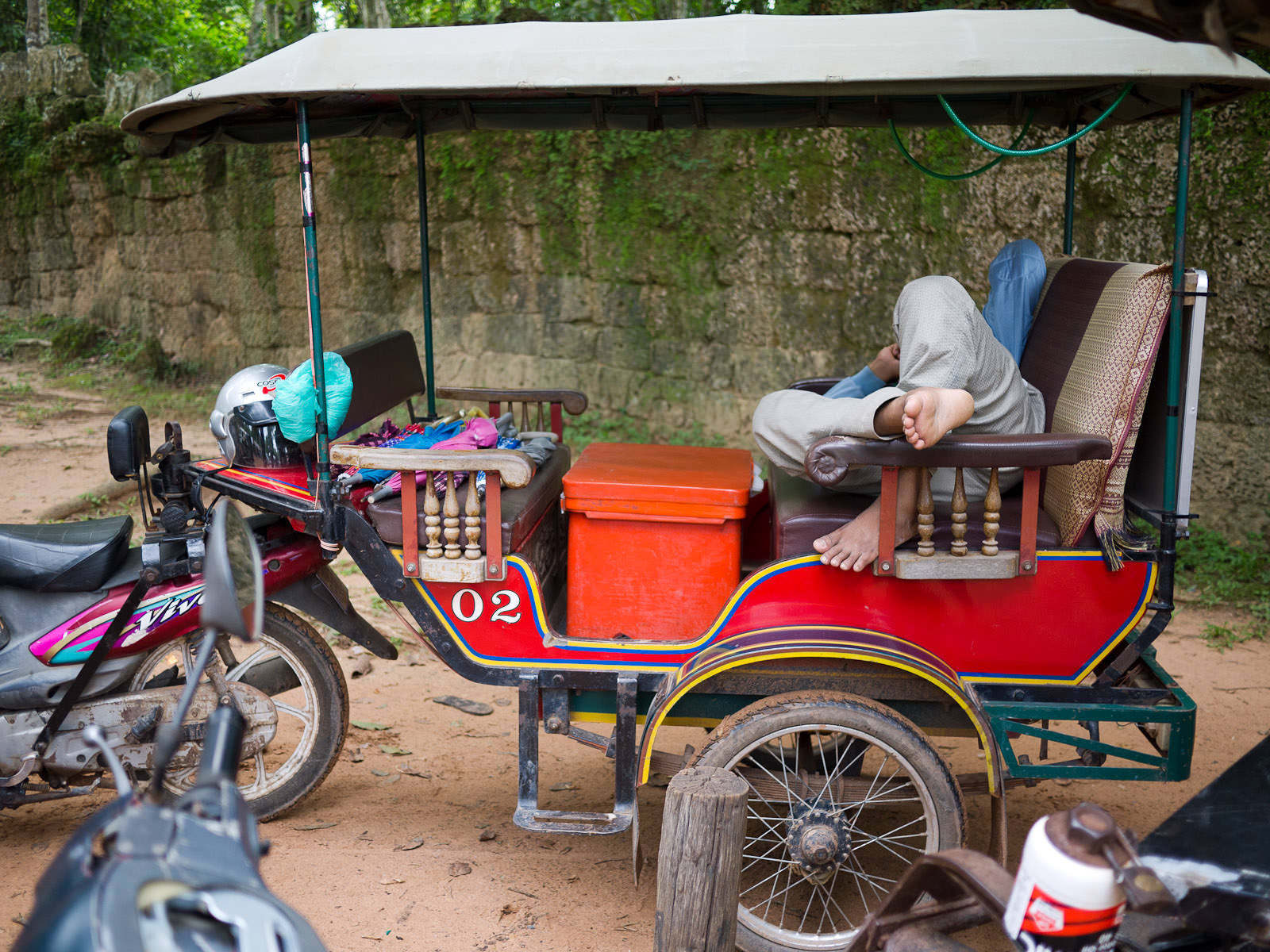
If I hadn’t found my group, I’d have caught a tuk-tuk back to the hotel. Though maybe not this tuk-tuk…ZZZZZ
On the way to the next temple, we spot elephants lined up, swaying, ears flapping, ready for tourist rides.
Next stop, the Bayon temple. The Bayon is very popular among tourists, famous for over 200 iconic stone faces carved into over 50 towers.
After the Bayon, we visit the Terrace of Elephants.
As I wait for the rest of the guys to finish walking through the Terrace of Elephants, I can’t resist talking pictures of the passing traffic. I could sit and watch the traffic all day in Cambodia.
At the north end of the Terrace of Elephants is a terrace of ornate carvings known as the Terrace of the Leper King. There is a Cambodian legend about an Angkorian king who had leprosy and it is believed he is represented among these carvings.
Some people have also believed this statue represents the Leper King. Sam tells us the statue depicts Yama, the Hindu God of Death. It is a replica; the original may be found at the National Museum in Cambodia’s capital city Phnom Penh, which we will visit in the next week.
Angkor Cafe
Lunch time. We go to Angkor Cafe, opposite Angkor Wat, which is next on our list.
The cafe is air-conditioned and we’re given cool moist towelettes as soon as we’re seated. We order drinks: Angkor beer, coconut shakes and a blended concoction called a Lolita, with apple, ginger, lemongrass and wild honey. The ginger is fresh and bitey, and as I sip on my Lolita, I can’t quite put my finger on what it reminds me of. It’s refreshing but kind of… medicinal. It comes to me about ten minutes later: it tastes like Strepsils cough lozenges!
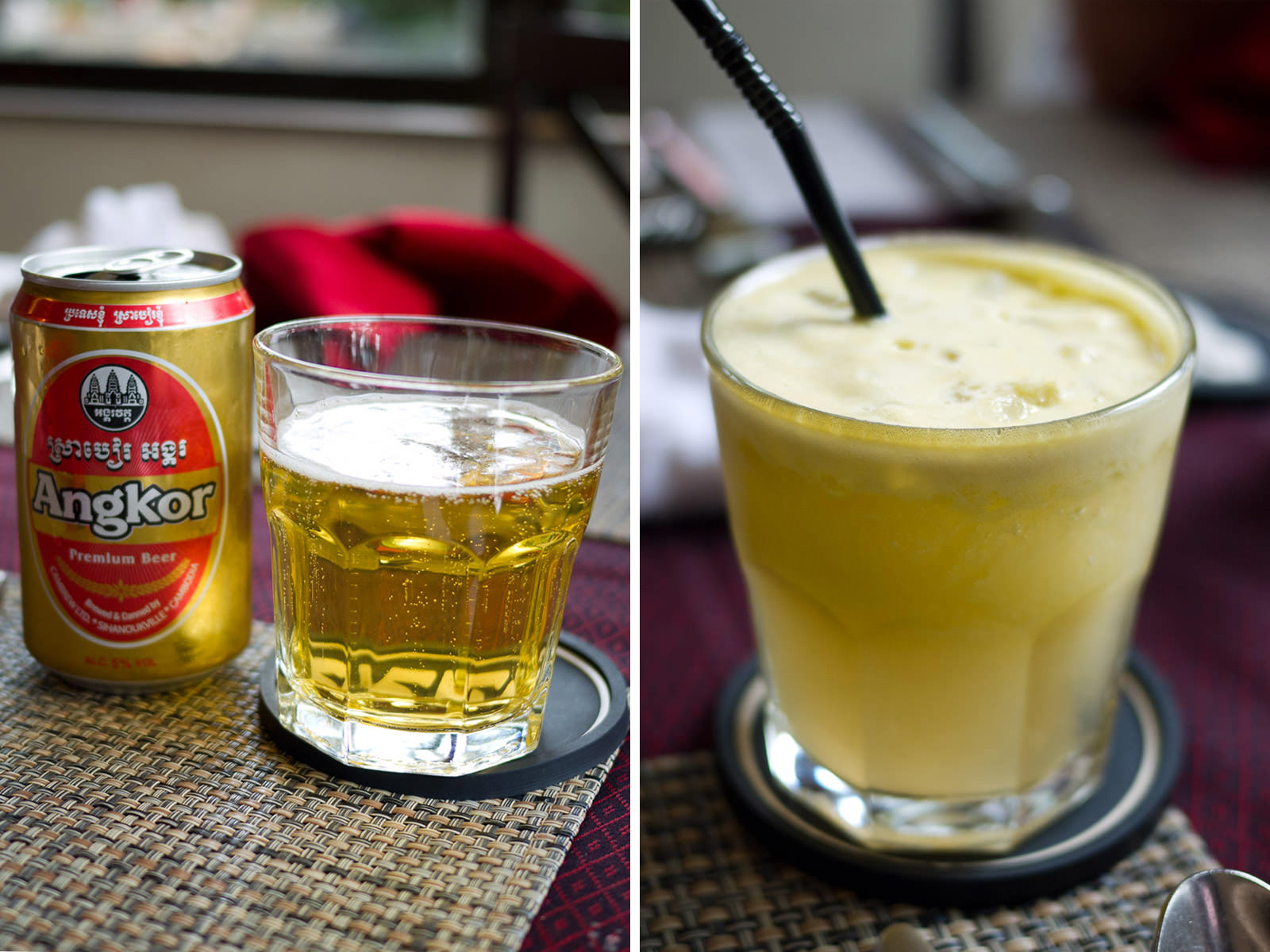
Angkor Beer and Lolita (apple, ginger, lemongrass, wild honey). The cold drinks and air-conditioning are greatly appreciated.
Our lunch is a set menu. First: deep fried spring rolls with chicken, fresh mint and vinegar sauce. They’re crisp and fresh out of the fryer, almost too hot to pick up with fingertips, even when wrapped with the curly lettuce and mint leaves.
The main course is braised fish with caramelised palm sugar and kampot pepper. The moist fish fillet is sitting in a sweet broth with soft cooked tomato. Kampot pepper is a Cambodian pepper which I find more fragrant than spicy. I spoon rice into the broth. It’s very good.
Dessert is simple – a single scoop housemade vanilla ice cream with fruit salad of dragon fruit, watermelon and pineapple.
It would be wonderful to sit back, relax and just keep ordering drinks (though maybe not Lolitas) but Sam our guide is ready to take us to Angkor Wat.
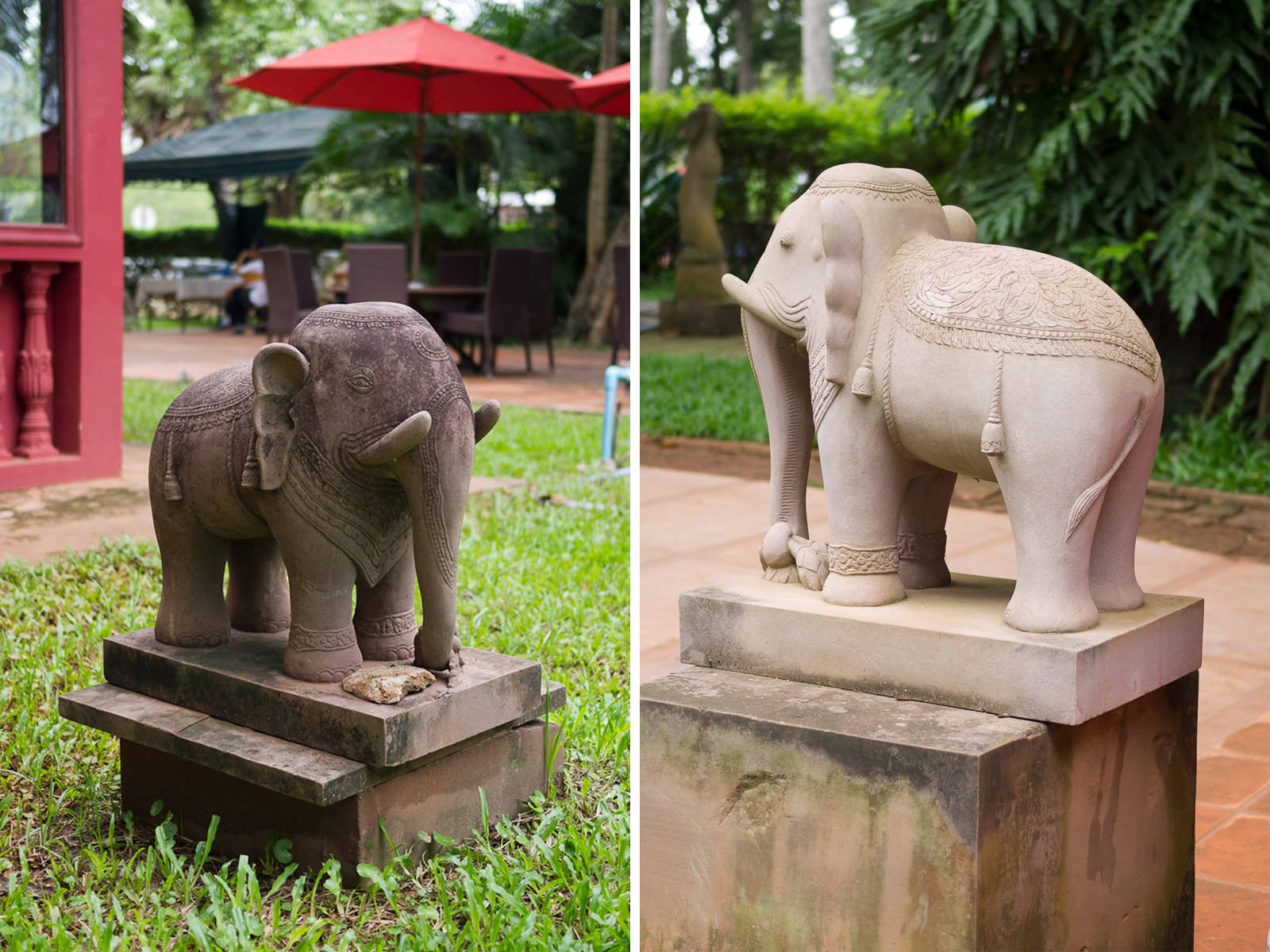
Elephant statues outside Angkor Wat Cafe. Elephants are a symbol of good luck and feature prominently throughout Cambodia.
Angkor Cafe
Opposite Angkor Wat. Part of The Blue Pumpkin chain
Menu prices are in US dollars – the Cambodian unit of currency is the Riel; however, US dollars are widely accepted and may be easier for Westerners to use as one Australian or US dollar is equivalent to approximately 4,000 Riels – the numbers can get very large when dealing with Riels.
Ice is made with filtered water; ice cream is made in-house
My Lolita was US$3.50; Angkor beer US$2.50 per can
The menu offers Khmer and western dishes.
Angkor Wat
Angkor Wat is said to be the world’s largest religious monument and is probably the most famous of all the temples (“wat” is the Khmer word for temple) at Angkor Archaeological Park. Built in the 12th century for Angkorian King Suviyavarman II, it has become a symbol of Cambodia and appears on its national flag. I feel for Cambodian school children who have to draw their country’s flag and reproduce the image of Angkor Wat in the centre. I remember struggling as a child to draw, first, the Malaysian flag – trying so hard to get the star and moon perfect and the stripes all the same size, and then the Australian flag – Union Jack and multiple stars.
The massive scale of the property is breathtaking, and it is even more incredible when you think about how the temples would have been constructed without the aid of industrial machinery.
While you’re in the Angkor Park temples, beware of local people offering you a stick of incense for a blessing as it’s not free – you will be asked for money (AU$10) if you take the incense. You may be happy to pay the money and of course it’s your choice to do so, but it’s also OK to say “no thank you” and not accept the incense in the first place and land yourself in an awkward situation.
Inside all along the walls are ornate carvings that depict mythological and historical scenes which Sam explains as we walk through – they include King Suryavarman’s army, the God Vishnu’s victory over demons, and scenes of judgment and punishment by Yama, the God of Death (the punishments are my favourite – various forms of torture that include force-feeding until stomachs burst, and impalement on spikes).
There are three main levels to Angkor Wat. To reach the highest part of Angkor Wat, you will need to climb lots of stairs. The original Angkorian stairs are hellishly steep and narrow. Although a handrail and wooden staircase have since been fitted for the benefit of tourists, it is still a challenging and difficult climb – and don’t forget you will need to have the energy and strength to climb down as well.
While we were at Angkor Wat, a short but heavy afternoon downpour left the narrow steps extremely slippery – looking at the hoards of tourists gripping the handrail and inching their way up the stairs, bumper to bumper, none of our group was keen to join in.
I’d love to know what these magnificent temples looked like when they were “new”.
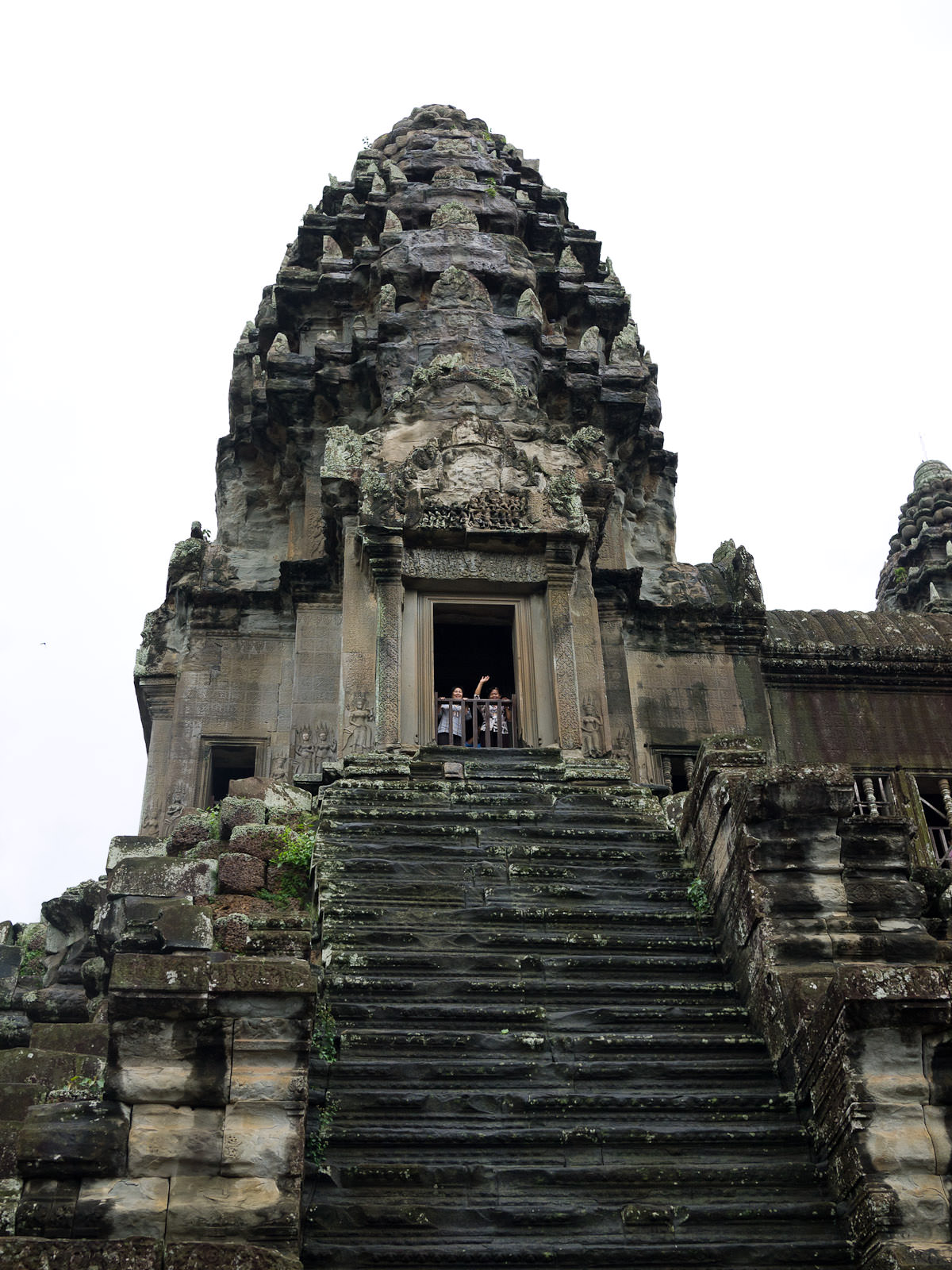
The original stairs are incredibly narrow and steep – if you are keen to get to the top, use the wooden staircase and handrail fitted on the other side
By the way, we lost another one of our group at Angkor Wat (we found him eventually, after around 40 minutes of back-tracking and checking the exits etc.). Seriously, make sure you all know which direction to head towards and roughly what time you should be there. And always follow your guide’s instructions!
Angkor Archaeological Park tips
- It’s hot work exploring temples – wear light clothes/hat, use sunscreen and bring drinking water.
- If you are a mozzie magnet like me, use mosquito repellent (I had a handy roll-on). This is especially important if you visit the temples at sunrise or sunset. Mozzies love me any time of day, so I used repellent during the day, every day I was in Cambodia.
- Wear sensible walking shoes. Even if you’re not planning to climb any stairs, there is a lot of walking to do, some of it on uneven terrain.
- Make sure your group has a plan in case you get separated. A compass is highly recommended.
- Some of the temple chambers are dark, so if you’re serious about seeing all the details, bring a torch.
- The temples are considered holy places by Cambodians, so do show respect and wear clothes that cover your shoulders and knees (your guide will probably mention this). It is unlikely that anyone will confront you about how you are dressed, but that’s not the point. Jeans are probably too hot to be a practical choice, so organise some light travel trousers or long shorts.
- A light raincoat is useful if visiting during wet season (June to October – we were there in early August and it did rain heavily in the afternoon). Peak season is November to February (weather is driest and coolest, the temples are at their busiest); March to May is the hottest time of year when temperatures can reach 40C.
- Do not get too close to the monkeys that wander around some of the ruins. They may look cute but can move much faster than you – and many will bite.
It’s been an exhilarating day, which I will remember and think about for a long time.
Back in my room at the Victoria Angkor, my bed’s been made and once again looks so inviting. But I’ve got to get ready to go out for dinner and perhaps explore Siem Reap town…
See the previous post in this series: Flying business class with Vietnam Airlines
Next in this series: a night out in Siem Reap, Cambodia – coming soon.
This trip was hosted (what does this mean?) – I travelled to Cambodia and Vietnam and experienced the RV Mekong Pandaw cruise as a guest of Vietnam Airlines.
